The post We Feel, Just Like You. Go Vegan For Life. appeared first on PETA.
This post was originally published on Animal Rights and Campaign News | PETA.
The post We Feel, Just Like You. Go Vegan For Life. appeared first on PETA.
This post was originally published on Animal Rights and Campaign News | PETA.
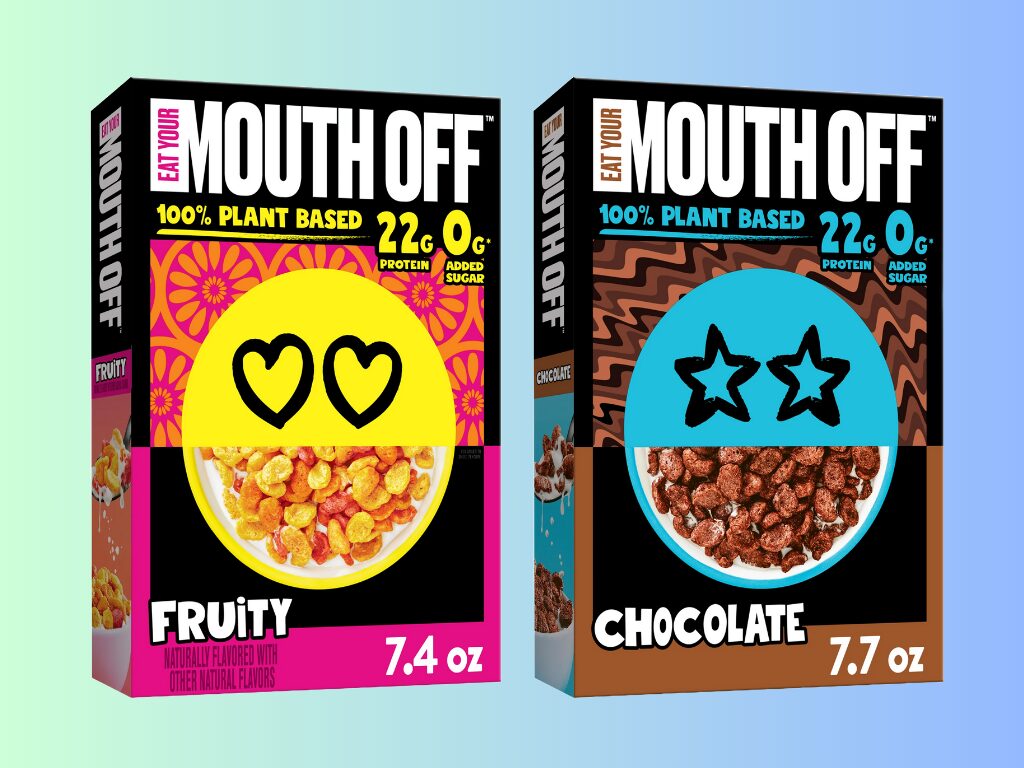
Eat Your Mouth Off, a new brand by US food giant WK Kellogg Co, is a plant-based, sugar-free and protein-packed cereal. Coming in two flavours, the brand’s launch comes as the company behind cereal staples like Corn Flakes and Rice Krispies makes a pivot towards health-conscious younger consumers.
Rolling out nationwide this month, the cereal puffs lists soy protein isolate, pea protein isolate, canola oil, lentil protein and oat fibre among its ingredients, and packs in 22 grams of plant protein per serving. It contains zero added sugars and 2 grams of net carbs, thanks to the use of sucralose and stevia leaf as its sweeteners. At the moment, the brand has two flavours, Chocolate and Fruity, both of which come in a 7.5-ounce box.
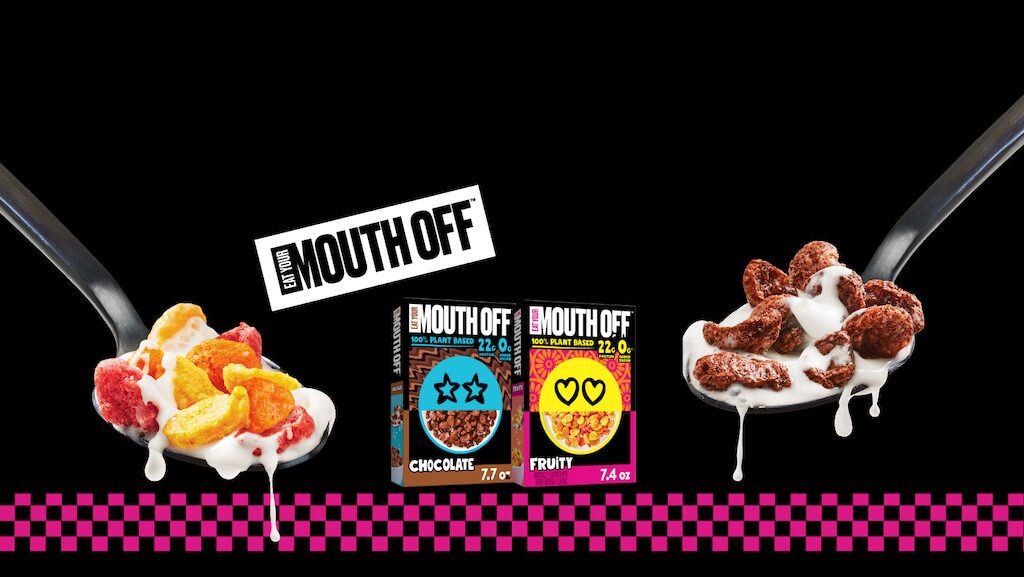
Unlike many of WK Kellogg Co’s products, the product is vegan-friendly and devoid of any dairy ingredients. Many of the corporation’s best-known cereal brands, such as Special K or Mueslix, contain added dairy, including whey powder, milk powder or yoghurt, making them not suitable for vegans either.
Furthermore, while WK Kellogg Co’s other well-known cereal brands like Bran Flakes, Frosted Flakes and Fruit & Fibre do not contain any dairy ingredients or honey, they are fortified with Vitamin D3 sourced from lanolin, a wax secreted sheep’s wool.
US-based food manufacturing company WK Kellogg Co was created when it split from multinational giant Kellogg’s in October 2023. Headquartered in Battle Creek, Michigan, the newly formed arm is a corporate spin-off that now runs all of Kellogg’s cereal business within North America.
The plans to split Kellogg’s operations were first announced in 2022 and also involved a separate entity exclusively for the snack category dubbed Kellanova.
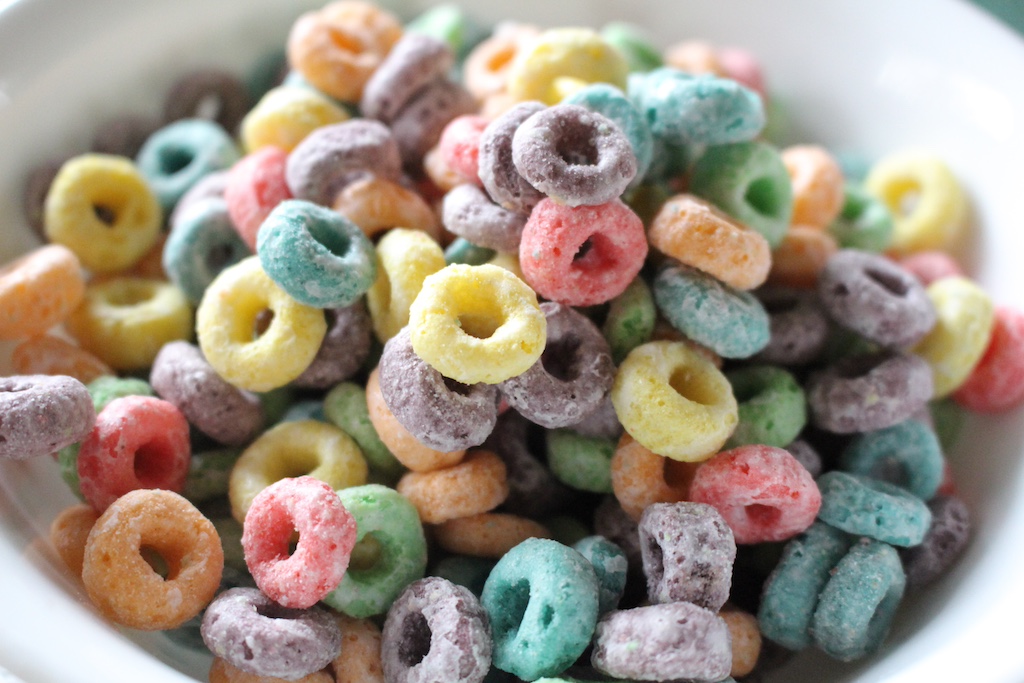
The launch of the product comes as WK Kellogg Co turns its attention to the younger generation of Gen Z shoppers and their increasingly health-conscious habits.
With old-school premier breakfast options becoming less popular, the company is reinventing the wheel to create a “deconstructed” new alternative aimed at capturing the fun yet conscious tastes of Gen Z. In Green Queen’s latest expert food trends of 2024, Gen Zs were described as the “snacking generation” who crave “variety and small portions…with functionality”.
“Almost all [brands] are developing new plant-based protein snack formats for a sustainably-minded younger generation looking for fuel on the go,” writes Sonalie Figuerias, founder and editor-in-chief of Green Queen.
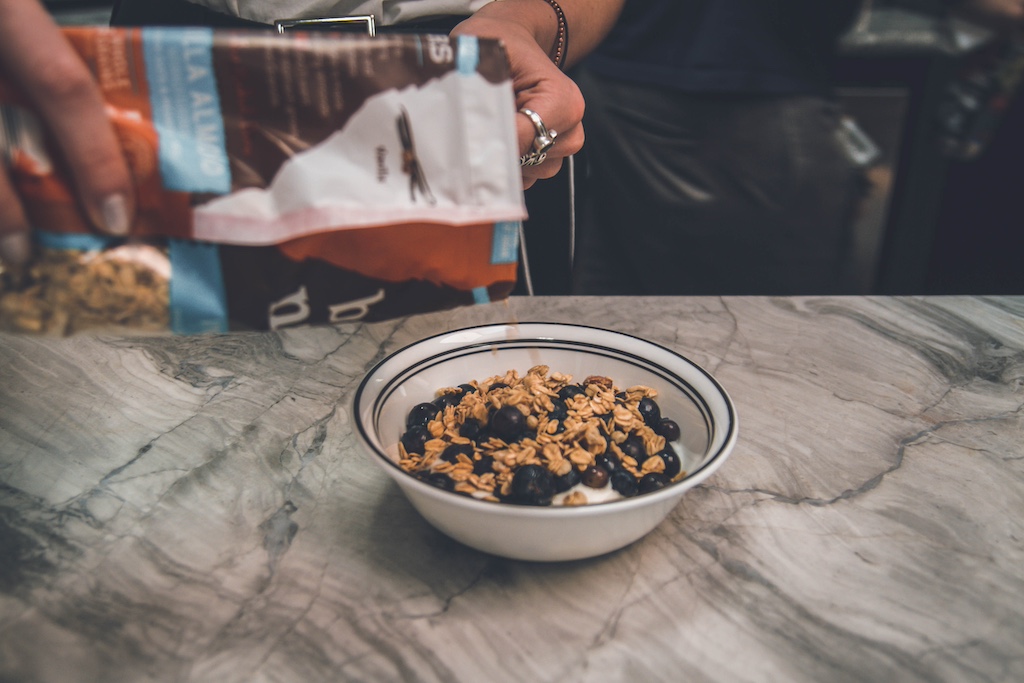
It’s no wonder WK Kellogg described the new Eat Your Mouth Off brand as “crafted especially for Zillennials” and “their unique personalities”. Unlike its traditional portfolio of sturdy breakfast options, this new label is intended to cater to Gen Z-ers who are more likely to consume cereals as part of a meal or snack, not just as a healthy start to their day.
“It’s been just a year since this team, driven by curiosity and a hunger for something new, began envisioning cereal not only as a nutritious option, but as a way to inject fun into your breakfast, snack, or meal experience,” shared senior marketing director Sadie Garcia, who highlighted the cereal’s high-protein content “that doesn’t sacrifice taste”.
The post Kellogg Launches New Vegan Cereal To Capture Gen Z Snackers appeared first on Green Queen.
This post was originally published on Green Queen.
Lakeland diners just might think twice about chowing down on fried chicken after they see—and hear—“Hell on Wheels,” PETA’s guerilla-marketing campaign featuring a life-size chicken transport truck covered with images of real chickens crammed into crates on their way to a slaughterhouse, complete with actual recorded sounds of the birds’ cries and a subliminal message every 10 seconds suggesting that people go vegan. The vexatious vehicle will debut outside Frescos Southern Kitchen & Bar before moving on to confront diners at LoveBird Almost Famous Chicken, Zaxby’s, PDQ, Chick-fil-A, The WingHouse Bar & Grill, 4 Rivers Smokehouse, Grillsmith, Smokey Bones, Hooters, and BubbaQue’s BBQ.
When: Saturday, January 6, 12 noon
Where: Outside Frescos Southern Kitchen & Bar, 132 S. Kentucky Ave., Lakeland
“Behind every barbecued wing or bucket of fried chicken is a once-living, sensitive individual who was crammed onto a truck for a terrifying, miserable journey to their death,” says PETA Executive Vice President Tracy Reiman. “PETA’s ‘Hell on Wheels’ truck is an appeal to anyone who eats chicken to remember that the meat industry is cruel to birds and the only kind meal is a vegan one.”
PETA—whose motto reads, in part, that “animals are not ours to eat”—opposes speciesism, a human-supremacist worldview, and offers a free vegan starter kit on its website.
For more information, please visit PETA.org, listen to The PETA Podcast, or follow the group on X (formerly Twitter), Facebook, or Instagram.
The post ‘Hell on Wheels’ Is Coming: Squawking Chicken Truck to Ruffle Feathers Outside Lakeland Restaurant appeared first on PETA.
This post was originally published on Animal Rights and Campaign News | PETA.
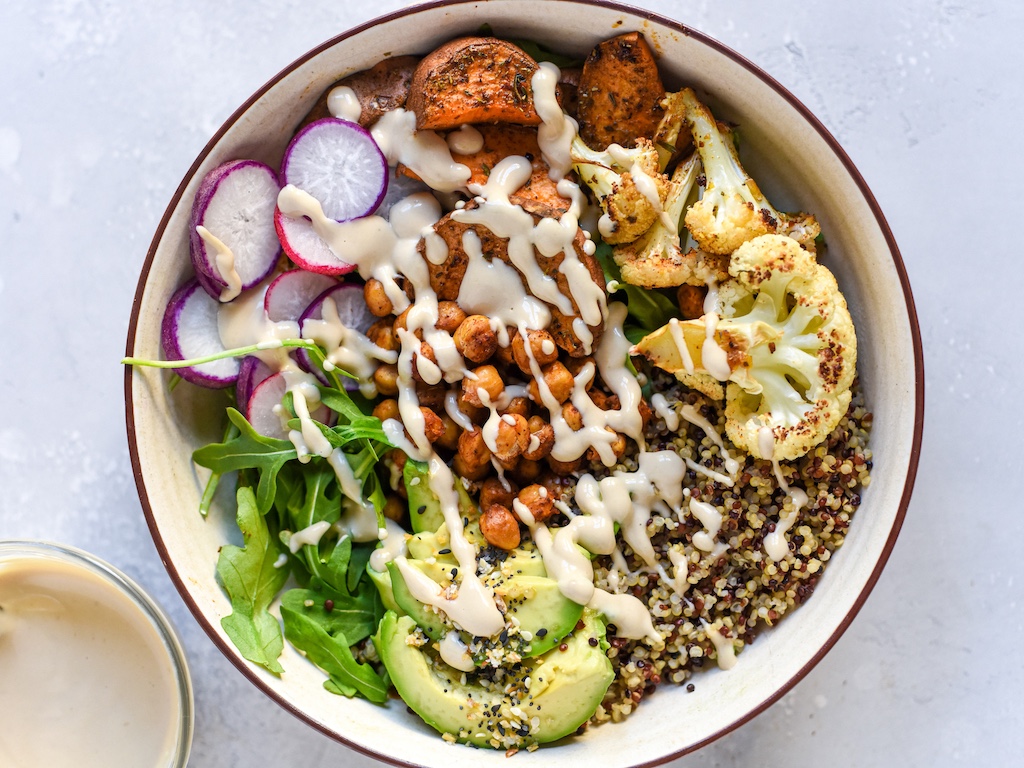
There’s yet another reason to switch to a plant-based diet. This time, researchers have found that dietary change would lead to a major cut in ambient air pollution, which leads to a myriad of positive health and economic outcomes.
The study, published in the journal Nature Communications, revealed that shifting our current diets to plant-based diets would prevent up to 236,000 premature deaths associated with poor air quality.
Worldwide, 4 million people die prematurely each year due to outdoor air pollution, according to data from the WHO. Agriculture, which sustains our current food system, is driving a fifth of the annual deaths. In total, the global food system, which counts everything from production to consumption, represents one-third of human-made greenhouse gas emissions.

“Food production, especially of animal products, is a major source of methane and ammonia emissions which contribute to air pollution through the formation of particulate matter and ground-level ozone,” wrote the researchers.
“We show that dietary changes towards more plant-based flexitarian, vegetarian, and vegan diets could lead to meaningful reductions in air pollution with health and economic benefits.”
Using a multi-model approach, which examined agriculture, emissions, air quality, health and economic indicators, the team managed to estimate air-pollution-specific health and economic impacts in relation to global dietary change.
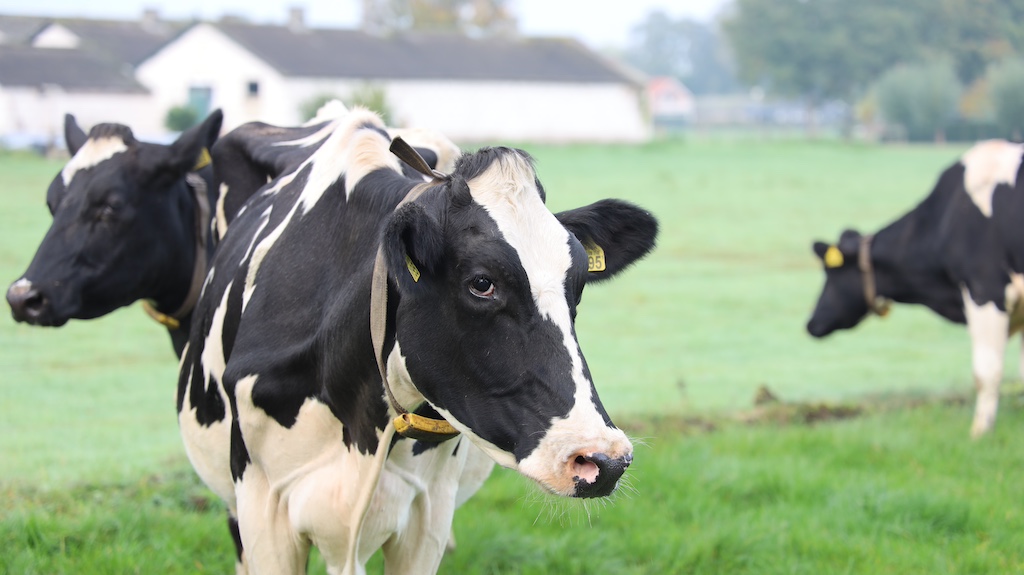
If the world went flexitarian, which means minimal meat and dairy products with a focus on plant-based food, over 100,000 premature deaths would still be prevented. This number more than doubles to well over 200,000 if the world adopted a vegan diet, devoid of any meat and animal byproducts.
In areas where there is high population density and intensive agriculture, the impacts of plant-based dietary change would be even greater. Premature mortality would be reduced by 9-21% in Europe, 12-18% in North America, and 4-10% in Eastern Asia, in particular.
Related: Recent studies show many health benefits of going plant-based
In addition to having clear benefits for human health in relation to lower air pollution, switching to a plant-based diet would also be a cost-effective way to reduce the economic burden of our environmental crises.
Shifting to a vegan diet would result in an increase in global GDP by more than 1% or US$1.3 trillion, the paper found.
“The diet-related improvements in air quality were associated with enhanced labour productivity, which impacts economic output,” wrote the team.
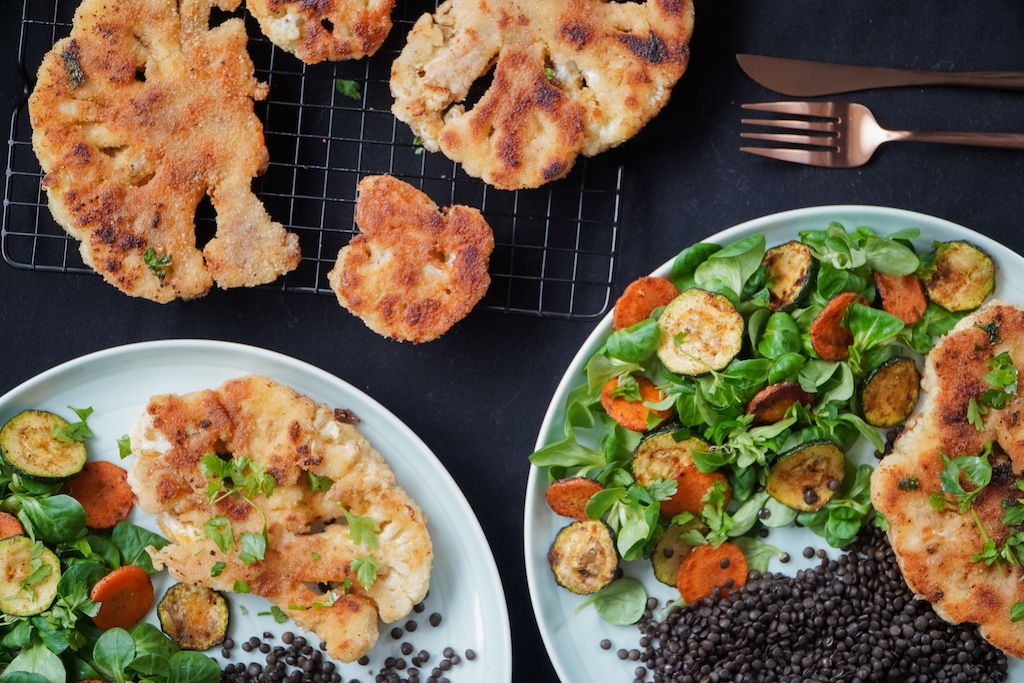
Related: Cutting air pollution in half could boost food production by 25% in China
In a separate article, lead author of the study and senior researcher at the University of Oxford Marco Springmann, explained that plant-based diets additionally “lowers the need for expensive investments in emission-reducing equipment for livestock systems, such as scrubbers that remove ammonia from the air.”
“Eating less meat would also diminish the need for other, more drastic, measures to curb pollution,” he added.
The post Could Plant-Based Diets Curb Air Pollution? New Data Says Yes. appeared first on Green Queen.
This post was originally published on Green Queen.

When it comes to the top food trends to watch out for in 2024, almost every list mentions mushrooms. With its incredible textural properties as well as nutritional benefits, it’s no surprise that mushrooms are the powerhouse ingredient in many of the latest plant-based meat analogues.
While Time Magazine gave an honourable mention to roasted lion’s mane and shiitake bacon among many of Chef Todd Anderson’s mushroom-based creations in its food predictions list, Whole Foods Market trend-spotter Kantha Shelke boldly stated in Eat This that mushrooms will be “discover[ed]…in every food and beverage category and product developers will find ways to weave in ancient wisdom into new craveable food formats.”
Without further ado, let’s look at all the fun these seven vegan meat brands are having with fungi.

Founded in 2022 by food scientist Luiza Villela, unClassic Foods’ goal is to replace beef cattle with oyster mushrooms. “We don’t need to pretend to be meat,” the young startup’s mission statement reads. “We are cooler.”
Based in San Francisco, California, the company is poised to follow the David-and-Goliath story of oat milk vs. big dairy, reinventing the wheel with oyster mushroom ‘steak tips’ and even crispy fried ‘nuggets’ that resemble chicken. These products are pre-seasoned and pre-cooked, making it easy for consumers to reheat and eat. A few months ago, the startup showcased its products at The Good Food Institute’s GFC2023 conference in a Steak Biryani dish too.
Ultimately, Villela says she wants her oyster mushrooms to take centerstage, outstripping animal protein. “Mushrooms will be at the centre of the plate as the protagonist of the dish.”
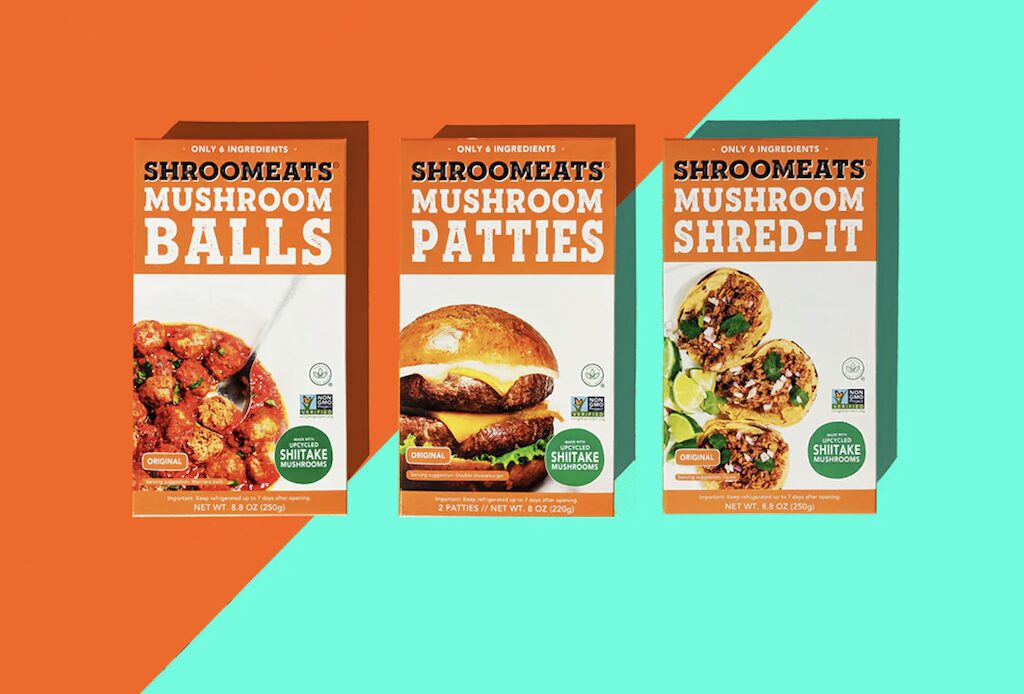
Using upcycled shiitake mushrooms along with a handful of other vegan-friendly ingredients, Shroomeats has created a range of alternatives including mushroom balls, patties and ‘shred-it’ shredded “meat”. Founded by three women, Pamas, Dissaya, and Mary, the startup hopes to displace meat consumption and its associated negative health impacts.
Aside from shiitake mushrooms, the brand uses pea protein, sunflower oil, salt, pepper and potato flour to create its range of vegan alternatives. Their shiitake mushrooms are sourced from an organic community farm in Thailand and is free of all 8 major allergens too. At the moment, Shroomeats’ range is sold online within the US.
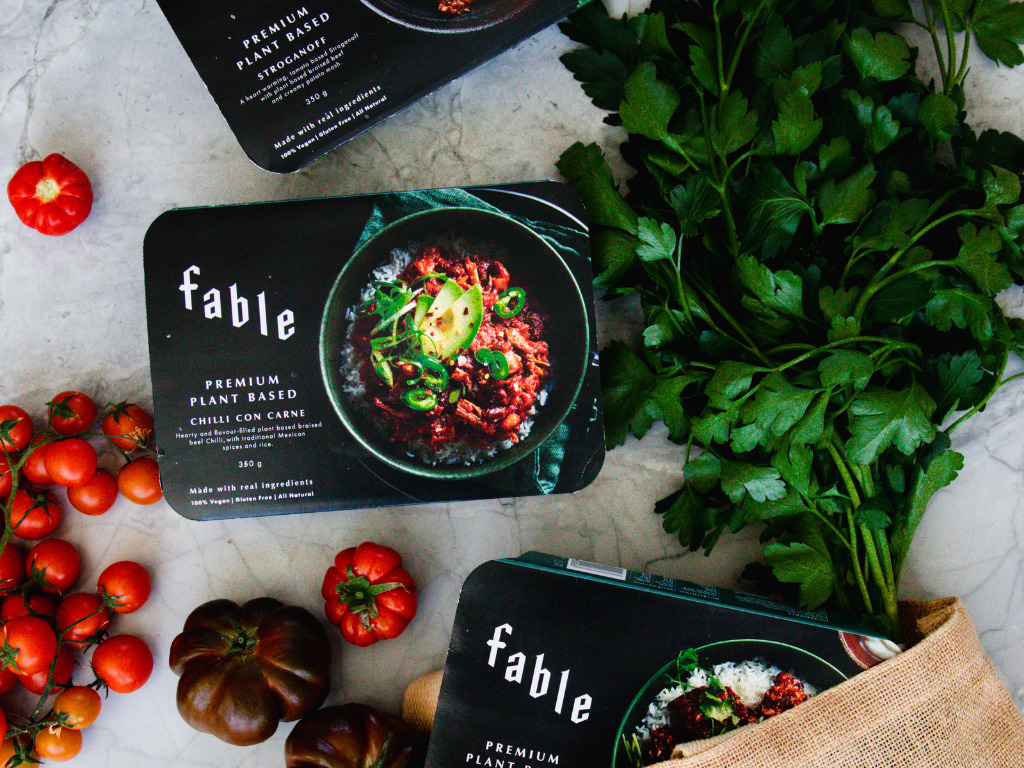
Another startup reimagining mushrooms is Fable. The Aussie company founded by food industry veterans Jim Fuller, Chris McLoghlin and Michael Fox is all about shiitake mushrooms, turning the uniquely umami-tasting fungi into a “fantastically meaty” alternative.
At the moment, the brand, which was one of the first to focus on whole mushroom alternatives, is available in thousands of restaurants and grocery stores, including in Australia, Canada, the UK and Singapore. Some of the most recognisable names include British health chains Planet Organic and Holland & Barrett, as well as burger joint Honest Burgers, Singapore’s SaladStop and Australian chain P’Nut Asian Kitchen.
As for the future, the startup, backed with a $8.5 million Series A in March last year, plans to further boost its R&D, accelerate its international growth and double down on its goal to make “minimally processed plant-based ingredients” popular.
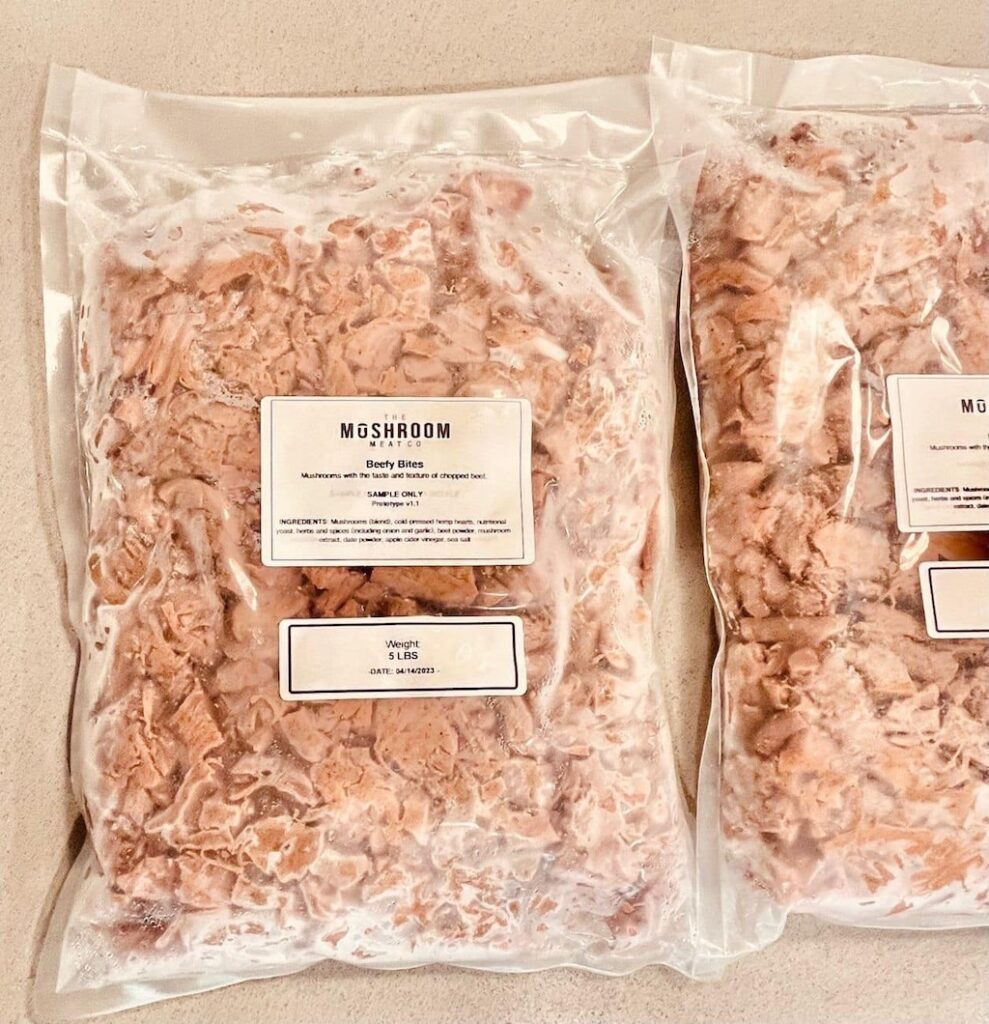
Founded by husband-and-wife duo Kesha Stickland and Dan Gardner, The Mushroom Meat Co is turning gourmet mushrooms into everything from porkless shreds to beefy burgers and beefy bites. Yet to be launched in the market, the company is focused on B2B sales and is even working on a mushroom-based ‘fat’ to mimic the fatty mouthfeel consumers love about conventional beef.
Aside from mushrooms, the company is using cold-pressed seed proteins, which are upcycled byproducts of industrial food production and is also free from the 10 major food allergens.
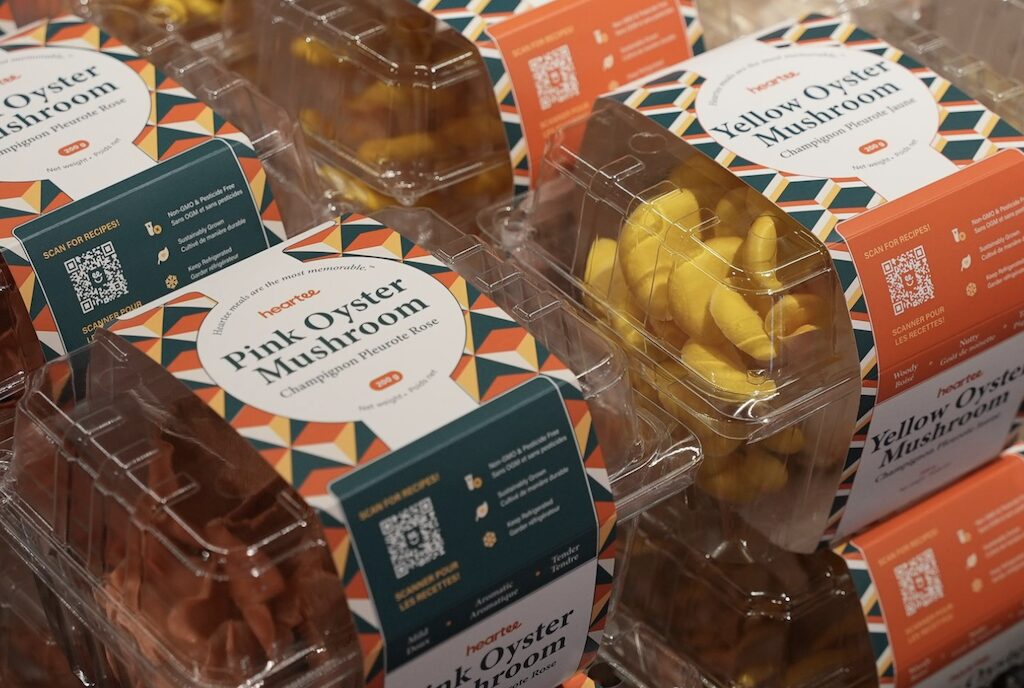
Indoor farming startup Adapt AgTech is doing something slightly different. Instead of producing mushroom alt-protein products, the Canadian vertical farming firm has created mushroom-growing shipping containers. These will be the powerhouses enabling everything from parking lots to logistical hubs into mushroom-growing locations, which allows restaurants and grocery shops to deliver mushrooms just steps away.
In these containers, you’ll find a range of speciality mushrooms, such as pink oyster, chestnut, pearl oyster, blue oyster, lion’s mane and king trumpet oyster mushrooms. All of these have different textural and mouthfeel qualities, making it a versatile ingredient to sustainably swap out meat without compromising on taste.
Last year, Adapt, also known as Heartee Foods, opened its very first shipping container in Austin, Texas in the US, and plans to continue expanding across locations in the country. “Our model is to create hyper-local farms in densely populated urban areas to reduce the distance from farm to fork,” CEO and founder Jonathan Murray told TechCrunch in February.
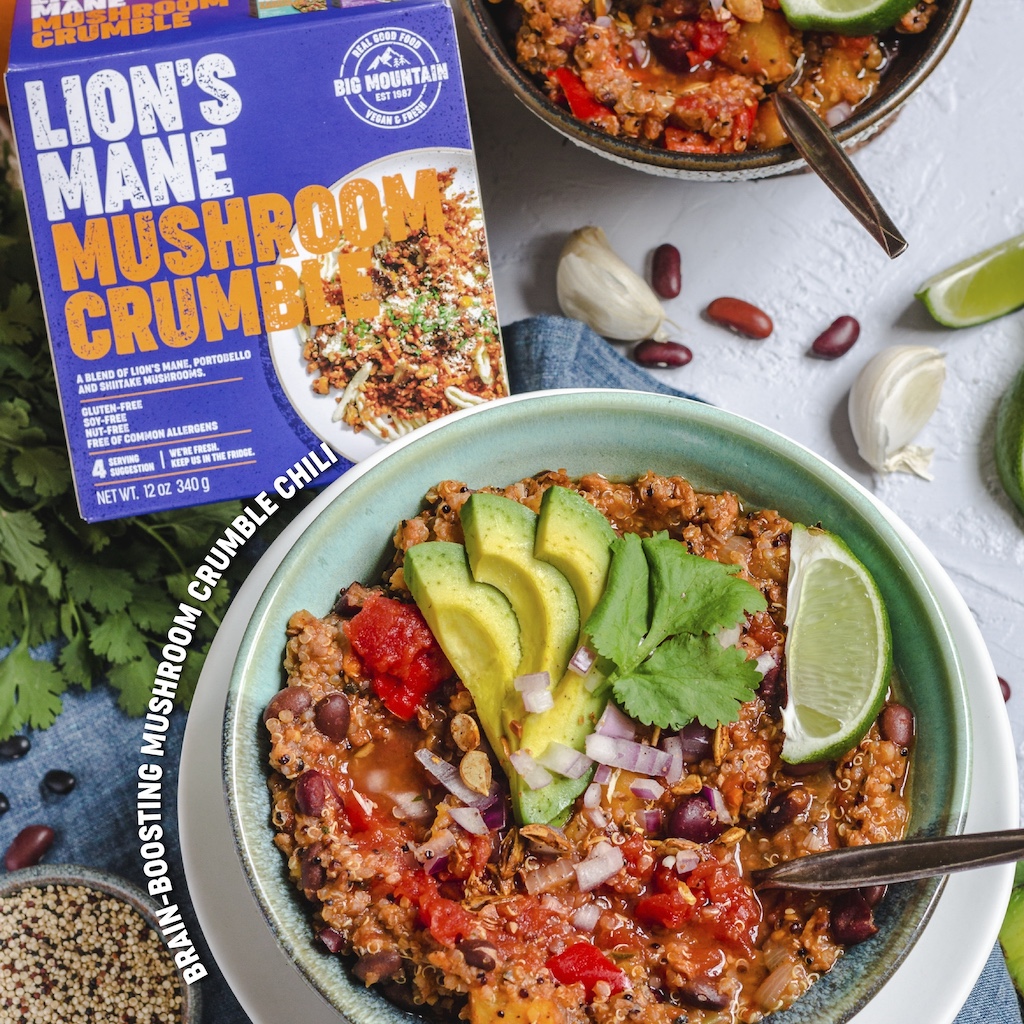
Based in Vancouver, Canada, Big Mountain Foods is big on mushrooms. The women-owned and family-led brand creates its vegan and allergen-free range with mushrooms, and you’ll find veggie links, crumbles, burger patties, bites and more.
Other ingredients incorporated into the range include sunflower seeds, broccoli carrots, peas and chia seeds, and its use of mushrooms is plenty, from lion’s mane to shiitake. At the moment, the brand is sold in several major retailers, including Albertsons, Safeway, Walmart and Sprouts Farmers Market.
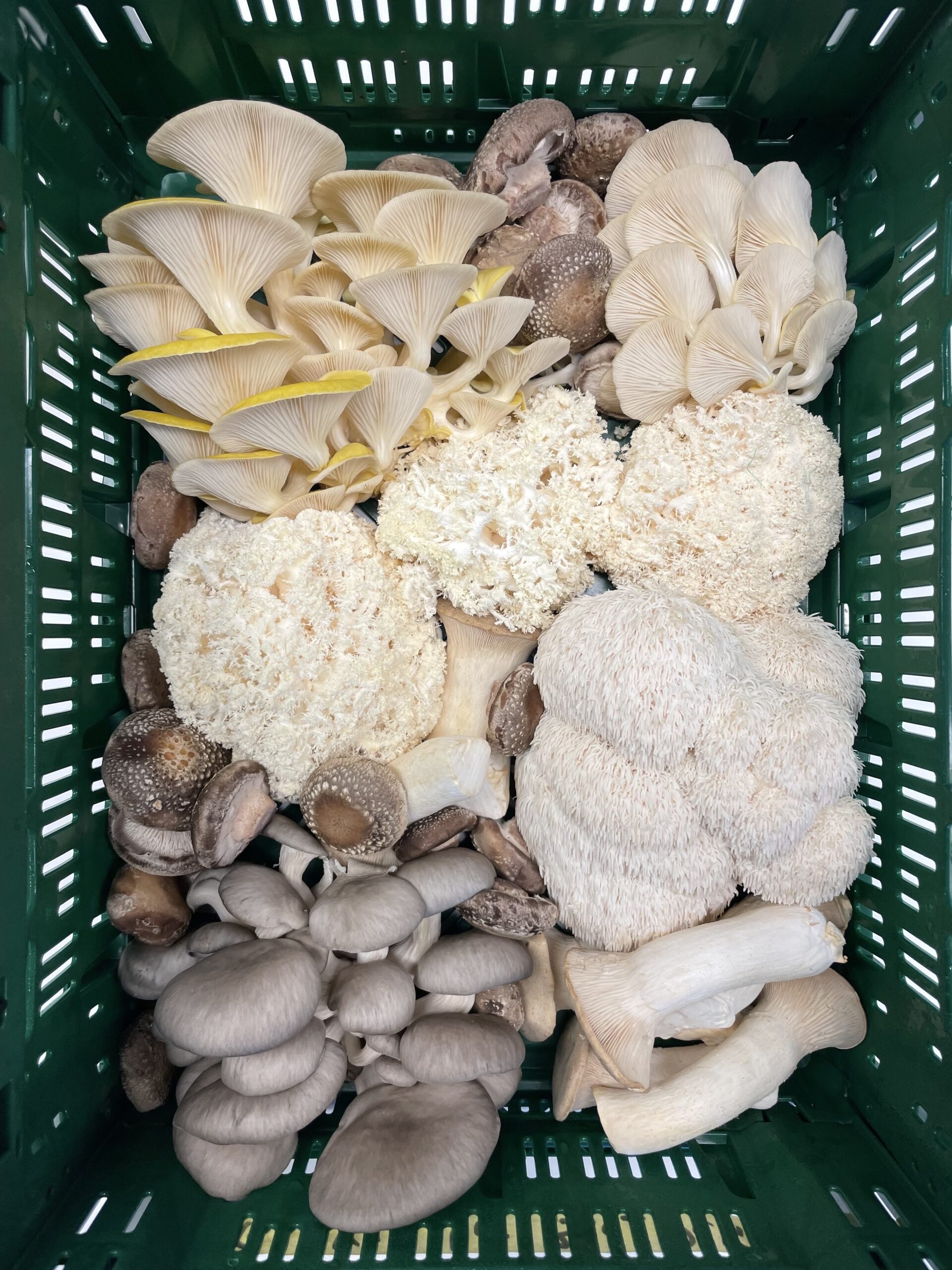
Tupu, a Berlin-based agtech company, is solving the mushroom production-and-transportation dilemma by enabling organic gourmet mushrooms to be grown directly in cities. Using modular farming technology, bioscience, IoT and AI, the startup helps make indoor gourmet mushroom farming economically viable.
Currently, Tupu’s portfolio of mushroom species includes king oysters, grey oysters, shiitakes, lion’s manes and yellow oysters, and they are keen to continue expanding their line-up in the years ahead with coral tooth, nameko and more. Armed with $3.2 million in seed funding which closed in October 2023, the urban farming company plans to get its mushrooms onto more plates across Europe via its B2B channel by partnering with restaurants.
At the moment, Tupu’s mushrooms can be found at a handful of Berlin restaurants, but will soon explore getting their products directly to consumers too.
The post Mushrooms as a Main: 7 Vegan Brands Having Fun with Fungi appeared first on Green Queen.
This post was originally published on Green Queen.

Last year saw the astronomical rise of drugs like Ozempic, a medication originally prescribed to treat diabetes, but which was found to have significant weight-loss properties. The main active ingredient that appears to prevent weight gain or even induce major weight loss, semaglutide, works by mimicking the GLP-1 hormone, thereby reducing insulin resistance, prolonging the feeling of fullness and curbing appetite.
But as the year went on and the popularity of Wegovy and other weight loss-specific semaglutide-drugs became all the rage on social media, so did the reported number of side effects of the drug. These included nausea, stomach pain, vomiting and diarrhoea.
Now, a new study is showing that there might be a natural alternative. Plant-based diets that focus on protein and fats, and are low in carbohydrates, might just be the prescription-free answer to keeping the pounds off in the long term.
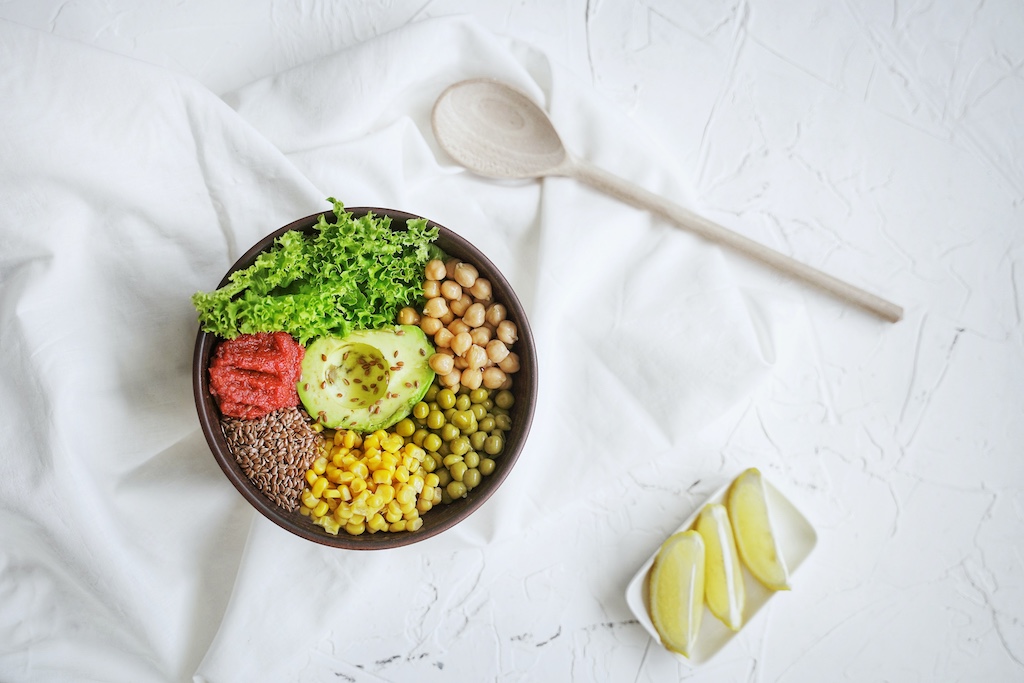
Scientists at Harvard University found that low-carb vegan diets, which are mainly made up of plant-based proteins and fats and minimal refined starches and sugars, could play a “critical role in modulating long-term weight change.”
The study, published in the journal JAMA, included more than 120,000 participants and involved self-reported diet updates and weight changes every four years, spanning from the year 1986 to 2018.
While these vegan diets were low in carbohydrates, they weren’t devoid of them either. Sources of healthy carbs included those “from whole grains and other plant-based foods”.
Related: Vegan diets improve heart health, twin study shows
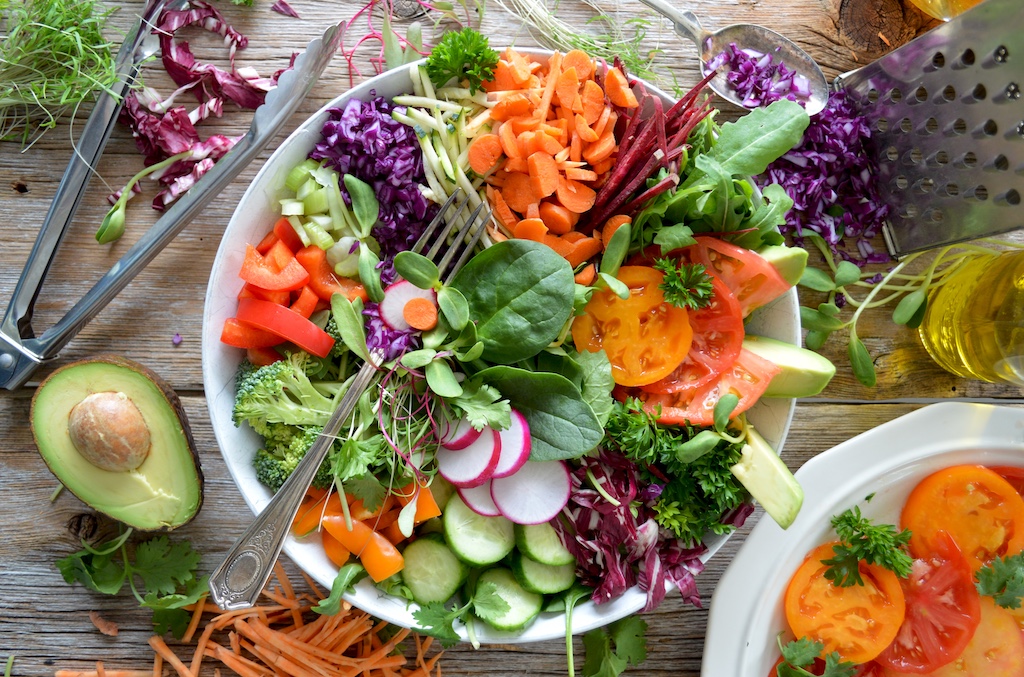
Most interestingly, the team found that not all low-carb diets were effective in managing weight gain in the long term. While almost all low-carb diets were associated with some level of weight loss in the short term, only the primarily plant-based group was “significantly associated with slower long-term weight gain”.
“The key takeaway here is that not all low-carbohydrate diets are created equal when it comes to managing weight in the long-term,” explained the paper’s senior author Qi Sun, associate professor in the Department of Nutrition.
“Our findings could shake up the way we think about popular low-carbohydrate diets and suggest that public health initiatives should continue to promote dietary patterns that emphasise healthful foods like whole grains, fruits, vegetables.”
Related: Why you should join Veganuary? It’s better for your health, science says

These findings come at a time when boosting GLP-1 is a major area of interest as a solution to managing weight gain. The hormone has come into focus due to the rise of Ozempic and other GLP-boosting semaglutide pharmaceutical drugs as a weight management tool.
It could be that GLP-1 boosting diets may be an effective natural solution by itself, with the Harvard study showing the promise that low-carb vegan diets could have.
One of the reasons why the plant-based cohort in the study could have seen a slower weight gain trend could be because many vegan whole foods are rich in gut-healthy fibre, which provides satiety and has been shown to increase GLP-1 secretion. High-protein and high-fibre vegan foods deliver a double dose of this effect, such as legumes and beans. Avocado, a fruit loaded with heart-healthy fats and fibre, also activates the hormone.
The post Plant-Based Diet Rich in Fats & Protein Shows Promise as ‘Nature’s Ozempic’ appeared first on Green Queen.
This post was originally published on Green Queen.

Yesterday, I wrote about how I did with my 2023 predictions because it’s important to take stock and hold oneself accountable. On the whole, I did okay – check out my forecast performance here– so hopefully you’ll want to dive into my 2024 forecast.
Before I get into specific food and product trends, I wanted to make some industry-wide predictions (some are less what I predict and more what I am hoping for) about how I think the sector needs to evolve this coming year.
Alt protein wedges itself into the sustainable food space: We’ve spent too much time in our own navel-gazing bubble and it’s time to make friends with the broader food x climate community. So much so that a worrying number of food activists are now anti-alt protein, having bought into the divide-and-conquer media maelstrom that Big Meat has financed. Protein diversification is not the only thing we need to fix on the global food stage, but it is a major lever of change and we need allies in other sustainable food corners if we are going to make real progress. Cultivated meat startups and rewilding NGOs are two sides of the same coin, people! But it’s on us as an industry to make inroads with the rest of the food world and demonstrate that we are one of, but not the only, solution. I saw the potential of this at COP28 where everyone working on food systems joined forces for the greater good (i.e. getting food into the final texts) and I hope it continues.
More blended finance and funding diversification: What’s more important than food, other than clean air and water? Food is a universal And yet, the alt protein industry has relied almost exclusively on venture capital funding to fuel its rise. We may not all be entitled to an electric car but we are all entitled to safe, nutritious, low-emissions food that doesn’t cost us our future or our health. So why isn’t there more investment in food systems adaptation? And where is the funding diversity? I would like to see more public money earmarked for food systems change, more blended finance and matching schemes (if a startup raises X, the government matches the amount – see how the French do it), more grants and more creative investment schemes (redeemable equity is one I’m looking at more closely). Relying on capricious and hype-based VC money based on fly-away valuations is not a winning strategy, as this past year has painfully shown us. We need grown-up dollars with long-term investment horizons who understand that while food is not software, there’s plenty of return potential to be had.
More food industry talent going into foodtech: One thing the sector has been sorely missing is actual employees with food production and food supply chain experience. We’ve got loads of visionary founders and plenty of deep tech scientists but we seem to be lacking people who come from the Food business. We need those people to enter the space.
More mar-comms talent going into foodtech: We absolutely need to start building consumer-first foodtech brands rather than messiah-founder-looking-to-impress-VC brands (the hype is over, folks). This is why we need more old-fashioned marketing, branding and comms talent in the space – I’m talking about folks who understand merchandising, consumer segmentation, packaging design, retail promotion, etc. I know. It sounds obvious, but here we are.
More organized industry-wide action: I’ve been privy to behind-the-scenes discussions around the globe about how the protein diversification space needs to get organized to fight misinformation, negative media narratives and lobby for better regulation, and there have been rumblings here and there about sector-wide action but, so far, nothing major has come of it. I’m hoping this changes in 2024 because we are fighting a well-funded, incumbent and powerful opposition.
Food supply shortages: This is an ongoing issue, but I expect 2024 will bring about more disruptions as weather extremes caused by global warming continue to wreak havoc on agricultural supply chains. From rice to chocolate to tomatoes, many of our favorite foods are under threat and as shortages and damaged crops become a consistent reality rather than a one-off fluke, governments will need to re-assess national food security and Big Food will need to rethink sourcing, which will (hopefully) lead to more investment into everything from improving soil health to innovating alternatives.
As I write above, alt-protein brands need to rejoin the food mainstream and keep better tabs on industry trends when they develop products and launch new SKUs – they need to think beyond the obvious ‘this is a meat/seafood/dairy replacement’ and focus more on creating craveable, nutritious products that consumers will love. Here are some trends that smart protein brands should be looking at and working on:
More personalized food: What’s becoming increasingly clear is that what’s healthy for me may not be healthy for you and, in time, consumers will look for tailored food options. With the advent of AI-powered food startups, it’s increasingly possible to design custom foods that meet individual needs. While this is still a while away from being mainstream and likely will be aimed at the health and fitness crowd first, this is an area of opportunity for protein startups.
Ozempic vs Big Food: Ozempic, a weight-loss drug brand that has become the shorthand term for a group of medications that make patients less hungry, less likely to overeat and less interested in snacking, could change the entire food industry as we know it. This class of drugs works by boosting GLP-1 hormones that tell your body you are full (hence why they are referred to as GLP-1 agonists). These drugs work (people lose weight), more and more drug companies are developing their own versions and they are becoming increasingly affordable. So while it is estimated that close to 10 million people were prescribed Ozempic in 2022, this number could balloon to around 24 million people by 2035, especially when you consider that roughly two out of three US adults are overweight or obese, and one out of three is obese. Patients on these drugs consume on average 20% fewer calories and are less interested in fatty, oily and fried foods. Anyone working in food should be closely watching this trend.
Plant-based foods and the GLP-1 connection: While Ozempic and co do the job, for people who don’t want to take drugs, GLP-1 boosting foods are going to boom. And guess what those foods are? Fiber-rich plants including whole grains, nuts, seeds and legumes, all of which help with GLP-1 secretion which helps to eliminate cravings. Why aren’t plant-based protein brands taking advantage of this? I’m hoping at least a handful will read this and rethink their marketing strategy. Alternatively, just call me and let’s talk.
Gen-Zs: the snacking generation: In case you missed this trend (see Girl Dinner on TikTok, or subscribe to Snaxshot for an in-depth look at the snaxboi demographic), the post-Millennial generation isn’t that interested in the meat-and-two-veg approach to food life. They like variety and small portions like tapas, dim sum, mezze, (nut) cheese boards, they want foods with functionality (see the rocketship journey of protein-bar disguised-as-a-chocolate bar Mid-Day Squares) and most of all, they want snacks. When I interviewed plant-based meat founders from across Asia during Singapore’s Agri-Food Innovation Week this past October, almost all of them shared they are developing new plant-based protein snack formats for a sustainably-minded younger generation looking for fuel on the go.
Climate-conscious parents: There are millions of us out there, parents who love our kids, are worried about climate change and wish it were easier to make food choices that reflect our values and our commitment to the health of our little ones. So far, no one is catering to this group. It’s a huge miss. Most of these folks are not looking to go vegan, but they are looking for a plant-forward approach – there’s a serious opportunity here.
Plant-based and fermented seafood: Still a tiny sub-sector of the plant-based meat alternative space, plant-based seafood looks to be having a moment as a bevvy of new brands entered the space and consumers are increasingly making the link between overfishing and their go-to sushi spot and a new dedicated industry association is working on raising the profile of its members globally.
Whole-food-based meat replacements: This is an ongoing trend, and I have written about it before but with the relentless misinformation campaigns by organizations like the Center for Consumer Freedom and a popular new book about ultra-processed foods making the media rounds, plant-based foods are under attack like never before and consumers are demanding ‘whole food’ products with fewer ingredients and ‘cleaner labels’ – this is great news for all things mushroom, BTW.
Labelling transparency: Following on from the above trend, the confluence of LLM-powered AI software solutions, an explosion of agrifood data companies and the prevalence of social media culture means that consumers have access to more information about the foods they eat than ever before and will continue to demand more transparency from brands. Cue a host of startups and regulatory policies aimed at helping them make better decisions in the grocery aisle both on the environmental (think carbon labelling) and nutrition front (e.g. Nutri-Score) with clearer, more consistent data.
That’s it, folks, looking forward to watching things play out and see you next January for a review of my predictions.
The post 2024 Food Trends Unveiled: Our Expert Predictions for a Sustainable Food Revolution appeared first on Green Queen.
This post was originally published on Green Queen.
Alaska Airlines has landed a Compassionate Business Award, courtesy of PETA, for the oatstanding addition of oat milk coffee creamer to its in-flight menu—a move PETA has pushed for, as it will help spare cows miserable lives in the dairy industry and decrease the airline’s carbon footprint. The airline also won major kudos for adding tasty vegan options to its first-class menu, including the new Mediterranean Lentils and the returning fan-favorite Moroccan Chickpea Salad.
“In recognizing the sky-high demand for vegan options, Alaska Airlines has made the skies a friendlier place for the millions of people who don’t consume dairy for ethical, environmental, or health reasons,” says PETA Executive Vice President Tracy Reiman. “PETA urges other airlines to follow Alaska Airlines’ example and get on board with compassion.”
The demand for dairy-free milks has skyrocketed as consumers learn that cows used for dairy are forcibly inseminated and their beloved calves are torn away from them so that the milk meant to nourish their babies can be used by humans. Once their bodies wear out after repeated pregnancies, they’re sent to slaughter. In addition, animal agriculture is a leading cause of greenhouse gas emissions, species extinction, deforestation, and other environmental disasters, and millions of Americans—including an estimated 95% of Asian Americans and 80% of Indigenous and Black Americans—are lactose intolerant.
In addition to shrinking their carbon footprint, each person who goes vegan saves nearly 200 animals each year and improves their own health, since vegans are less prone to heart disease, cancer, diabetes, and strokes. Those looking to make the switch can make use of PETA’s free vegan starter kit.
PETA—whose motto reads, in part, that “animals are not ours to eat or abuse in any other way”—opposes speciesism, a human-supremacist worldview. For more information, please visit PETA.org, listen to The PETA Podcast, or follow the group on X (formerly Twitter), Facebook, or Instagram.
The post The Sky’s No Limit: Alaska Airlines on Board With Oat Milk, Nabs PETA Award appeared first on PETA.
This post was originally published on Animal Rights and Campaign News | PETA.
Inspired by the Greek myth of Sisyphus, who was condemned to roll a stone up a mountain only to have it roll back down every time, PETA’s very own Sisyphus, dressed in a loincloth circa 1 million B.C., will push a giant vegan cheese wheel up a hill on Thursday—and push everyone, particularly resistant men, to go vegan in the new year.
When: Thursday, January 4, 12 noon
Where: At the intersection of Bourbon and Iberville streets, New Orleans
The prehistoric display aims to call upon everyone—but primarily men, who are the most likely to say that they “just can’t give up” dairy cheese—to “man up” and overcome their addiction. To prove how easy this is, everyone who shows up to witness the feat will be treated to complimentary creamy, dairy-free cheese wheels from Babybel, just one of the many tasty vegan cheeses on the market in 2024.
“Men are renowned for being the most stubborn, cheese-addicted people, and we’re challenging them to switch to delicious vegan cheese for the sake of their arteries, the animals, and the Earth,” says PETA President Ingrid Newkirk. “PETA’s display will remind everyone that kicking cruel and unhealthy dairy cheese to the curb is not a Sisyphean task.”
PETA notes that real men are protectors, not bullies, and in the dairy industry, calves are torn away from their mothers, often within a day of birth, so that the milk meant to nourish them can be stolen and sold to humans. PETA’s investigations into dairy facilities have found workers electroshocking cows in the face, hitting them with poles and a cane, and abusing them in other ways. Once their bodies wear out from repeated pregnancies, they’re sent to slaughter.
PETA—whose motto reads, in part, that “animals are not ours to eat or abuse in any other way”—opposes speciesism, a human-supremacist worldview, and offers a free vegan starter kit on its website.
For more information, please visit PETA.org, listen to The PETA Podcast, or follow the group on X (formerly Twitter), Facebook, or Instagram.
The post First-Ever Female Sisyphus to Bring Uphill Cheese Challenge to Bourbon Street appeared first on PETA.
This post was originally published on Animal Rights and Campaign News | PETA.
In honor of “Veganuary,” PETA sent a letter this morning to the Planning & Zoning Administrator for the City of Troy, Melissa Sanders, making a case for upgrading the name of Butter and Egg Road, which promotes the exploitative dairy and egg industries, to Peanut Butter and Blackberry Jelly Road, which is kind to cows and hens, celebrates one of Alabama’s top crops and its official state fruit, and encourages Alabamians to choose healthy and humane vegan food instead of greasy, artery-clogging animal-derived products—a win-win-win.
“Every block of butter and fried egg represents the pain and suffering of female animals who are used until their bodies break down and then sent to slaughter,” says PETA President Ingrid Newkirk. “PETA is asking Troy to embrace this jolly new pro-PB&J name, which is meaningful to the area and doesn’t condone animal exploitation.”
PETA—whose motto reads, in part, that “animals are not ours to eat”—opposes speciesism, a human-supremacist worldview. For more information, please visit PETA.org, listen to The PETA Podcast, or follow the group on X (formerly Twitter), Facebook, or Instagram.
PETA’s letter to Sanders follows.
January 3, 2024
Melissa Sanders
Planning & Zoning Administrator
City of Troy
Dear Ms. Sanders:
I’m writing on behalf of People for the Ethical Treatment of Animals—PETA entities have more than 9 million members and supporters globally, including thousands in Alabama—with an eggcellent suggestion: How about promoting two of Alabama’s favorite products by changing the name of Butter and Egg Road to “Peanut Butter and Blackberry Jelly Road”? This would be an educational opportunity and a fun way to encourage residents to moove away from the dairy and egg industries and toward healthier, humane, and more environmentally friendly choices.
Regardless of the name’s origin, we now realize that butter and eggs are unhealthy foods. Research links egg consumption to an increased risk of cardiovascular disease, a top killer in our country. Dairy products contribute to heart disease, type 2 diabetes, Alzheimer’s disease, and various types of cancer. Healthy vegan foods, which contain no cholesterol, are increasingly popular and widely available. Fortunately, dairy and egg consumption are on the decline, and—according to a report from the Plant Based Foods Association—70% of the U.S. population is now consuming plant-based foods.
Today, regrettably, “Butter and Egg Road” evokes images of greasy, cholesterol-laden breakfasts from cows and chickens who endured miserable lives and untimely deaths. Each year in U.S. egg factories, 200 million hens are crammed into battery cages so close together that they can’t spread their wings and are forced to excrete on each other. At the same time, nearly 300 million “unprofitable” male chicks are ground up or gassed alive. The dairy industry is no butter. Cows are empathetic, sensitive animals who feel pain and form strong bonds with their calves, just as human mothers do. On factory farms, they’re artificially inseminated, their calves are torn away from them within hours of birth, and they’re then hooked up to milking machines. Male calves are shipped to feedlots for slaughter, and female calves are sentenced to the same cruel fate as their mothers, eventually to become cheap ground beef. Over 9 million cows are exploited for dairy and 700,000 calves are slaughtered for veal annually.
Now that millions of Americans are opting for better food choices, a name like “Peanut Butter and Blackberry Jelly Road” could inspire Troy’s residents to celebrate an Alabama top crop and its official state fruit. We’d be happy to contribute to the cost of new signage and host a “You’d Be Nuts Not to Try Vegan” food giveaway. Thank you for your consideration. We look forward to hearing from you.
Very truly yours,
Ingrid Newkirk
President
The post From ‘Butter and Egg’ to ‘PB&J’: PETA Wants Animal-Friendly New Name for Local Road appeared first on PETA.
This post was originally published on Animal Rights and Campaign News | PETA.
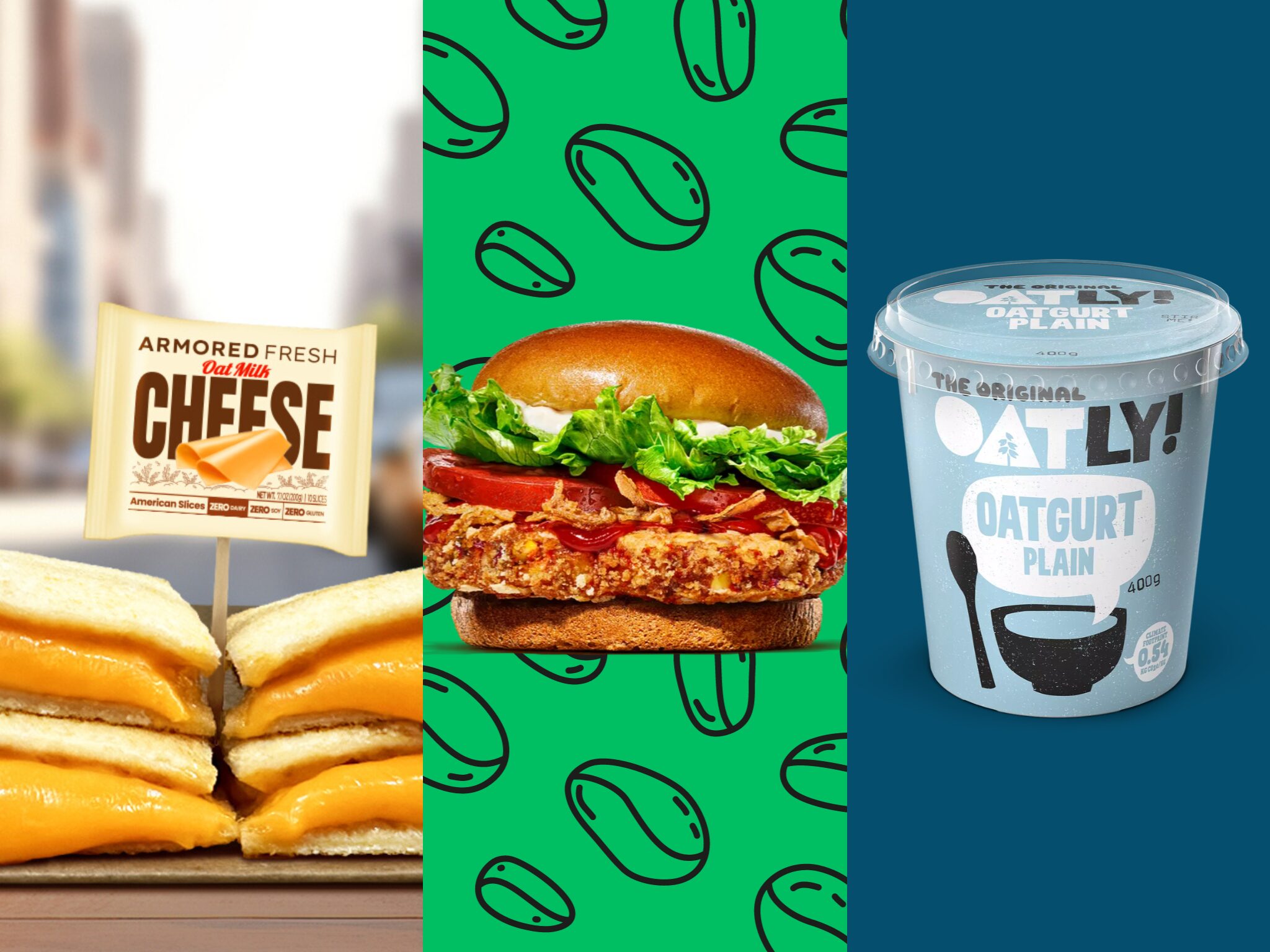
Veganuary is here! Burger King is bringing back what is its most demanded menu item ever in the UK: the Ultimate Black Bean burger. Launching on January 3, it comes after online petitions and posts imploring the fast-food giant to reintroduce the veggie favourite. Nix the cheese and mayo if you want it vegan.
Also for Veganuary, UK brand Applewood is relaunching its vegan snacking cheese, changing from a circular Mini format to new sticks called Applewood Vegan Bites, featuring its signature smoked cheese.
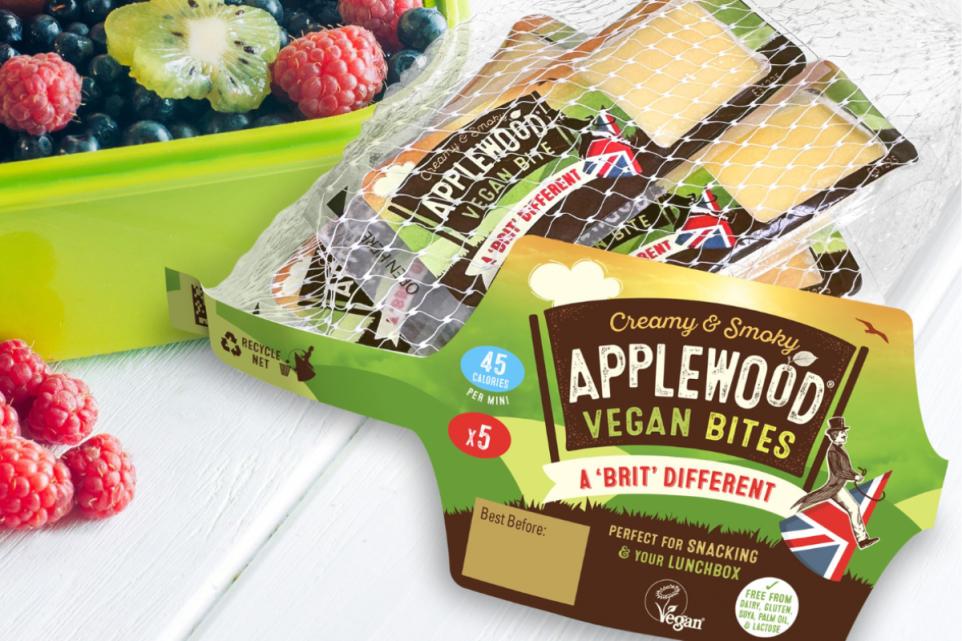
Pub chain Brewdog is jumping on the Veganuary bandwagon too, partnering with alt-meat brand THIS for a limited-edition drop of Europe’s first skin-on vegan chicken wings made with a seaweed-based crispy skin.
Not to be outdone, fellow vegan meat brand VFC has just debuted its first UK ready-meal SKU dubbed One Bag, a chicken-fried rice made with its plant-based chicken that clocks (clucks) in at under 450 calories and 20 grams of protein.
British plant-based range Squeaky Bean just announced its first frozen ingredients range, arriving on Waitrose shelves on January 8th: Seasoned Chicken Style Pieces and Steak Style Pieces, the two products are aimed at making weekday dinners more convenient and designed for stir fry and plant-based taco/flat bread applications.
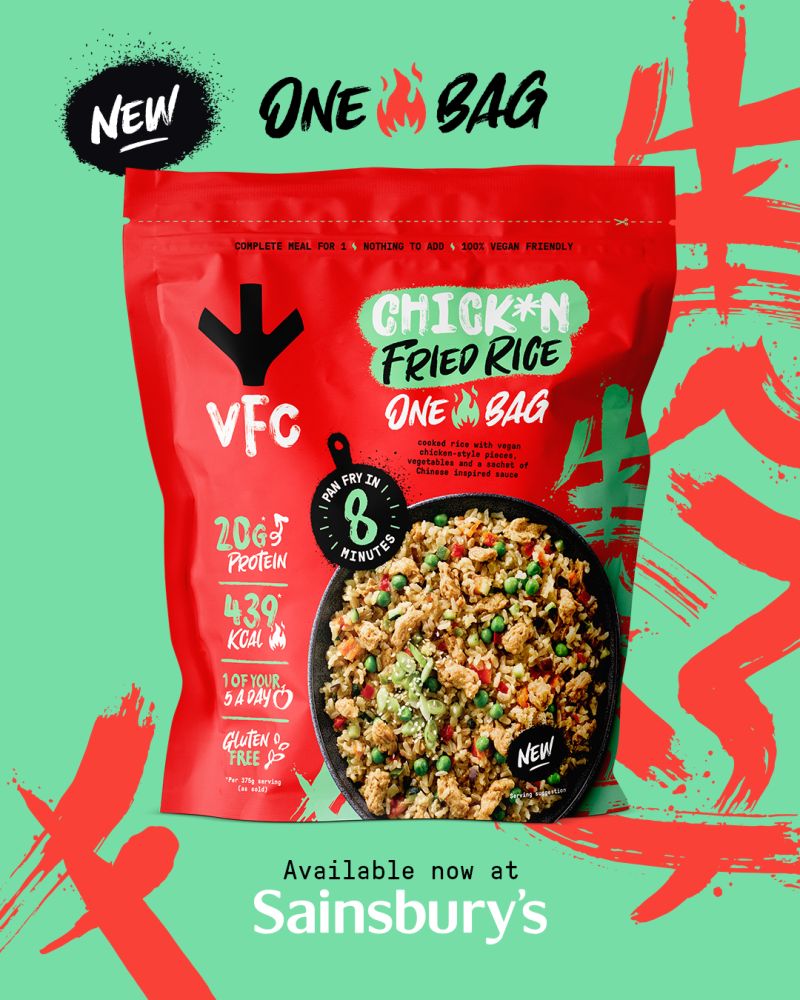
In the US, plant-based meat maker Shicken has secured distribution deals in 380 Sprouts Farmers Market stores, and is launching a new tikka kebab SKU at Costco UK, as well as a teriyaki kebab in the UK, Iceland, Sweden and France this month.
More stateside Veganuary launches include Subway‘s new Plant Picante sandwich, arriving January 10th, which features a spiced plant patty topped with crispy onions, Sweet Onion and Garlic & Herbs sauces and American-style cheese that can be swapped for Vegan Cheeze for a 100% plant-based option, and fast-casual chain Just Salad‘s collab with Amanda Cohen of the Michelin-starred NYC cult restaurant Dirt Candy. Cohen created a ‘Dirt Candy’ salad bowl made of romaine, arugula, organic sesame tofu, sliced cucumber, shaved broccoli, Tajin-spiced pumpkin seeds, sweet pepperoncini and buttery Castelvetrano olives tossed in a house-made vegan ranch.
Meanwhile, German manufacturer Rügenwalder Mühle has unveiled a 10-year-anniversary campaign during Veganuary with a virtual scavenger hunt hosted by photographer and brand ambassador Paul Ripke. It follows the re-release of its Veganuary 2023 TV ad in December and the launch of a Pulled Pork snack.
French plant-based meat brand Umiami has partnered with two-Michelin-starred French chef Isabelle Arpin, who has been featuring the company’s whole-cut chicken fillet at her eponymous Brussels restaurant.
Over in India, burger chain Biggie’s Burger is launching the Veg Beamer in collaboration with domestic plant-based meat brand GoodDot at all its outlets in Bangalore, a vegan version of their top-selling grilled item featuring GoodDot’s protein slabs.

Fancy a vegan cheese voyage? South Korea’s Armored Fresh is hosting a US coast-to-coast Oat Milk Cheese Tour for buyers and professionals within the grocery, foodservice and QSR channels, beginning from New York and ending in California.
Another South Korean brand, vegan personal care label Dryope has launched in Malaysia after reaching cumulative sales of $1M. The company’s shampoo, treatment, body wash and hair mist products will be available at Watsons, Shopee, Lazada and Zalora.
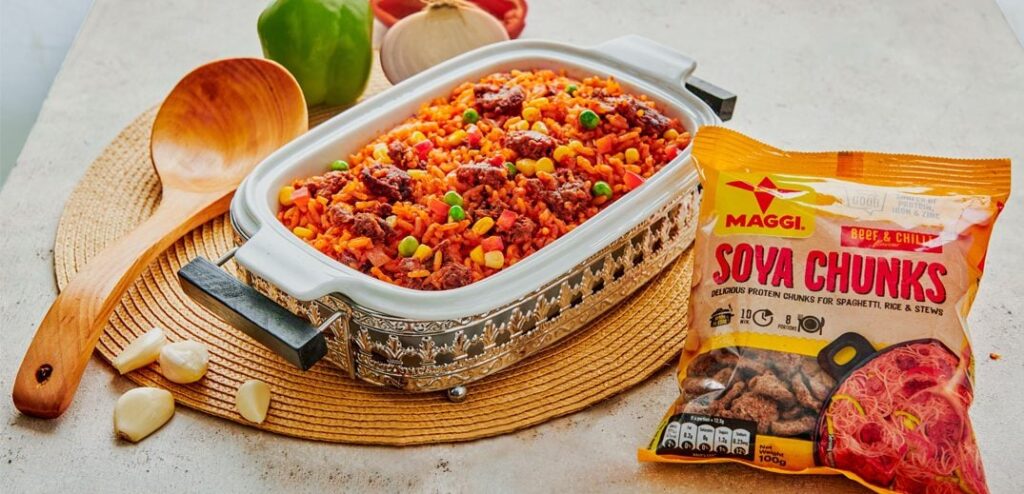
Nestlé, meanwhile, is exploring the use of plant-based ingredients to bring healthy, affordable proteins to consumers in countries without equitable access to nutrients. It recently launched Maggi Soya Chunks in Central and West Africa.
And Sussex-based semi-professional football club Lewes FC will go fully vegan for its home fixture against Durham in the Barclays Women’s Championship fixture on January 21 to mark Veganuary, with fans able to get a 20% discount on tickets using the code ‘VEGANSROCK’.
In a recommendation to the agriculture, nature and food quality minister, as well as the state secretary of health, welfare and sport, the Health Council of the Netherlands calls for a focus on policies making it easier for people to adopt plant-based diets and reduce meat consumption.
A new study by the University of Exeter demonstrates algae’s viability as a sustainable meat alternative in terms of maintaining and building muscle. It found that spirulina or chlorella intake stimulates myofibrillar protein synthesis in resting and exercised muscle tissue, and to a level equal to mycoprotein.
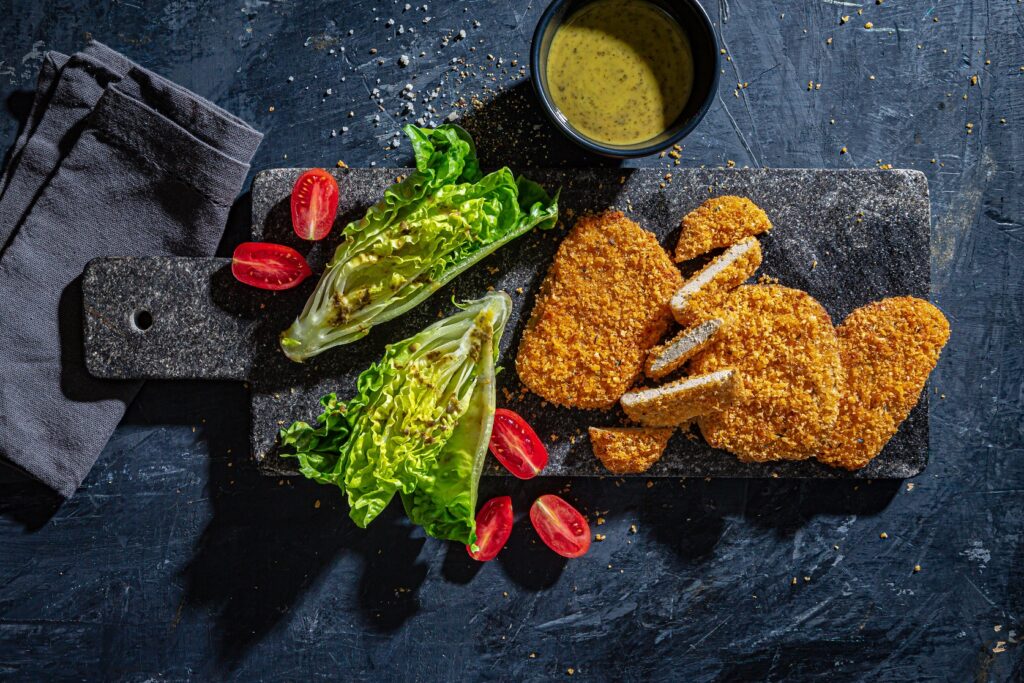
Dr Alejandro Marangoni, a researcher at the University of Guelph, has developed a solid plant-based fat using the Canadian Light Source at the University of Saskatchewan by rearranging the molecules in liquid oils to turn them into solids. Marangoni will work a a plant-based meat company to launch his fat (an alternative to the often used coconut oil) which he says makes for a better, juicier alt-meat product.
In Finland, the University of Helsinki’s research network, the Helsinki Planetary Health Hub, has established a collaboration with tech startup Wellness Foundry and US-based Game Changers Institute to launch an AI-driven plant-based nutrition app. It will launch in Finland and the US first.
After withdrawing its vegan ice creams from the UK market, oat milk giant Oatly has confirmed that its Oatgurt Plain is also no longer on supermarket shelves, though the Greek Style and Strawberry yoghurts continue to be available.
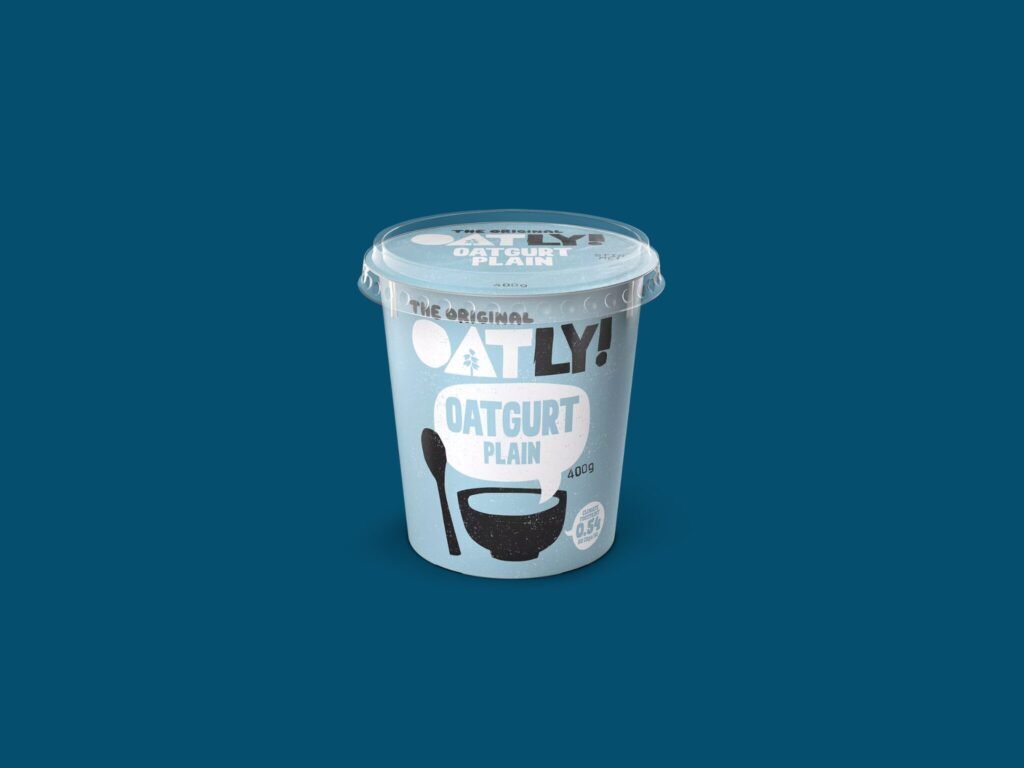
Finally, Berkeley’s veteran vegan taco restaurant Flacos has closed its brick-and-mortar location after 22 years but has hinted at a return in some form, with a GoFundMe campaign hoping to raise money to transition to an industrial kitchen.
Want more? Check out our roundups of Veganuary UK launch news and Veganuary US launch news.
The post Future Food Quick Bites: Bean Burgers, Vegan Cheese Tours & No More Oatgurts appeared first on Green Queen.
This post was originally published on Green Queen.
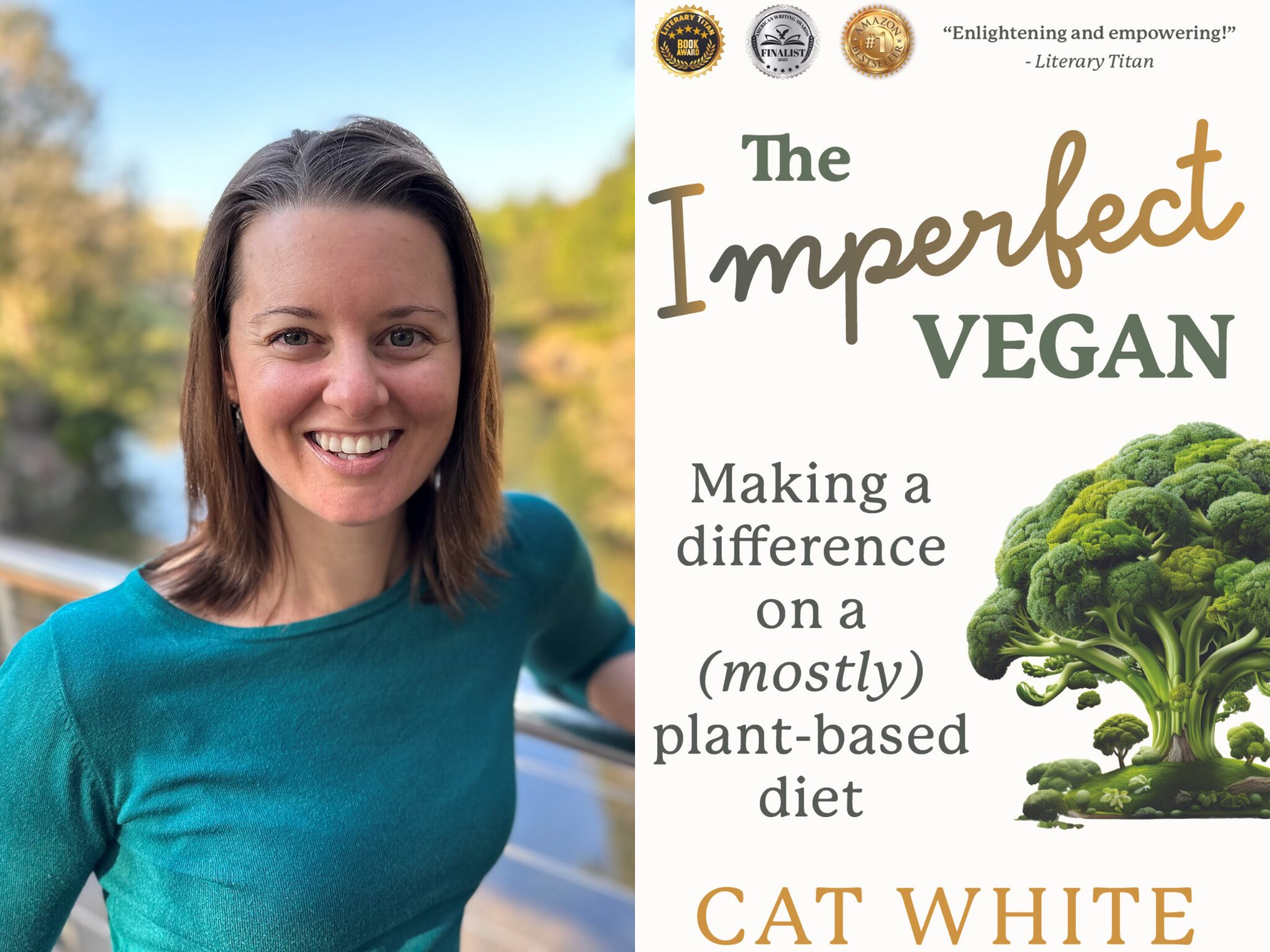
“The world doesn’t need 100 perfect vegans; the world needs billions of people doing the best they can.”
This was the line that changed how Cat White saw her diet and lifestyle. The author was complaining to a friend about the presence of animal-sourced foods in everything, and having cravings for the food she used to eat before going vegan.
But her friend’s statement eased the pressure, made her see through and celebrate the grey, and planted the seed that led to her new book, The Imperfect Vegan. Published in October, the title has received critical acclaim, and was a Gold Winner at the Literary Titan Awards and a finalist in three categories at the American Writing Awards 2023 with one reviewer Emma Megan stating: “Everyone—vegan and non-vegan alike—who cares about our fate and the planet should read this book”
As Veganuary – a campaign of absolutes – begins, we spoke to White about her book, the idea of an imperfect vegan, and how you can make a difference on a ‘mostly plant-based diet’.
This interview has been edited for clarity and concision.
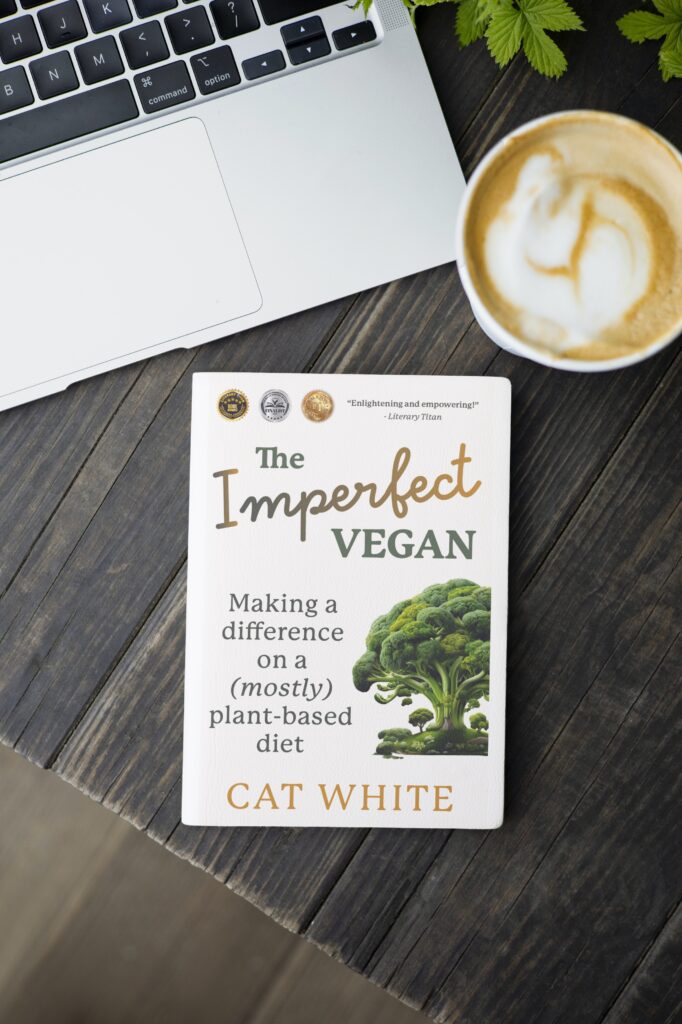
Cat White: An imperfect vegan is someone is does their best to choose the vegan option when they can, but they don’t give themselves a hard time if they slip up. An imperfect vegan also understands that we’re humans (not robots) and we’re not perfect in any area of our lives.
I chose to use ‘imperfect vegan’ because ‘vegan’ is the term that is most often used when we’re talking about not eating animals, as opposed to other terms such as ‘climatarian’ or ‘flexitarian’, which would require too much explanation each time someone asks you about your diet. It’s more about the mindset (of allowing imperfection) rather than the rules about what’s allowed or not allowed in the diet/lifestyle.
CW: Perfectionism is a common goal to strive for in veganism, and rightly so – it’s a worthy cause and it’s a point of moral consideration. When we’re talking about how we treat another individual, there really is no question that complete elimination of exploitation (or perfection in the vegan way) is the goal. Farmed animals don’t get to have “cheat days”.
In an ideal world, there would be no animal products anywhere and it would be obvious and easy to avoid them, but we don’t live in an ideal world. As much as we would love to be perfect all the time, we have to understand that sustainability is a more realistic goal, and it helps us to maintain the vegan journey for the long run if we don’t beat ourselves up for not being “perfect”.
Reduction is definitely a more practical approach than elimination, at least on the grand scale. Some individuals might find it easier for themselves to eliminate animal products from their household entirely, but most people struggle to go “cold turkey” (pardon the pun).
As a global society, the more we reduce our demand for animal products, the less there will be, and the easier it will be for everyone to choose the plant-based option. A billion people reducing their consumption of animal products by even a third (one meal a day) is going to do so much more than a handful of vegans who completely eliminate all animal products.
Also, the reduction approach makes it seem less scary for people to “give it a go” – they’re not put off by this unachievable standard of perfection. I believe the reason that many people try vegan but give it up is because they feel they can’t be perfect at it – and when they revert, they go back to their full meat diet. If we allowed people to be ‘mostly’ vegan, they’re more likely to continue doing their best most of the time. We’ll eventually get to the tipping point where this becomes the default.
People who say you can’t be mostly vegan are saying this from the moral standpoint. And they’re right! You really can’t decide to be against something one day, and then okay with it the next day. They don’t like the idea of using the word ‘vegan’ to promote any reduction/part-time solution, because they say it waters down the original intent of the meaning of the word.
However, even a cursory understanding of language shows that words morph and change over time – I still remember my mum being confused when I would say that something good is ‘wicked’ – and I believe it’s time for the word vegan to become more inclusive. People come into this lifestyle for all different reasons now – animal, the environment, health, etc. – and if we want to achieve the ultimate goal of eliminating animal exploitation, we need to allow a lot more people into the club, and appreciate all the efforts they’re doing, even if they’re only ‘mostly’ vegan.
By comparing it to how we’re not perfect in any area of our lives. We’re not perfect employees because I’m sure we’ve all checked Facebook at work, or taken personal calls, or booked holidays while we’re supposed to be analysing spreadsheets.
We’re certainly not perfect parents – we may have the best of intentions and great expectations when we start out, but then we realise how hard it actually is, and how life is messy. Just because we sometimes stick the kids in front of the iPad, or give in to their demands for ice cream for dinner, doesn’t mean we’re suddenly not a parent.
We’re just doing the best we can and dealing with competing priorities in the moment. If we have compassion for ourselves, we can continue on, and make better choices next time.
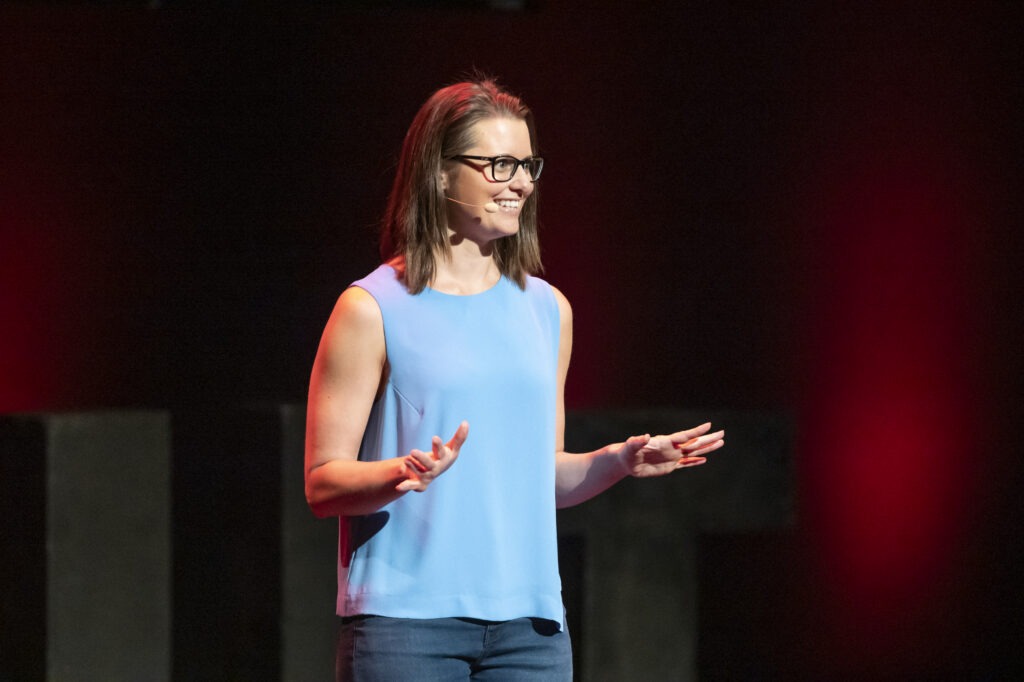
I reference trying existing concepts like Meatless Mondays or ‘vegan before 6pm’, which are movements that other people have started. It’s a way to get into the lifestyle and try it on before committing to completely changing your whole life around. I also provide a list of simple food swaps such as switching minced meat for lentils, or using hummus as a salad dressing instead of mayo.
I remind people that every little thing they do is helpful for the big picture. As a way to demonstrate my own imperfections, I also share a list of ways that I’m still imperfect, as well as stories from other ‘imperfect vegans’, to show people they’re not alone if they’re struggling to commit in some areas. There’s a whole chapter called ‘Allow the Transition’, which covers how to do it at your own pace.
In terms of environmental impact, the biggest impact is cutting out beef and lamb. Those two types of meat use 20 to 40 times the amount of land needed for plant-based proteins like grains and beans. They also use at least three times as much water. In fact, just one cheeseburger uses the same amount of water as three months of letting the tap run while you brush your teeth (twice a day!). Also, when it comes to water content, any of the plant-based milks are better for the environment than dairy.
But really, the best impact someone can take is just to choose a plant-based option for their next meal. It’s only one meal at a time. It’s empowering to make that choice. When I realised that I could actually enjoy food without the meat, I felt free. A whole world of new foods opened up to me, and now I’m excited to try whatever new creation is available at the next restaurant I go to.
The Imperfect Vegan by Cat White ($12.99) is available at major retailers in paperback and as an ebook.
The post ‘Farmed Animals Don’t Have Cheat Days’: Q&A with Cat White, Author of The Imperfect Vegan appeared first on Green Queen.
This post was originally published on Green Queen.
Inspired by the Greek myth of Sisyphus, who was condemned to roll a stone up a mountain only to have it roll back down every time, PETA’s very own Sisyphus, dressed in a loincloth circa 1 million B.C., will push a giant vegan cheese wheel up a hill tomorrow—and push everyone, particularly resistant men, to go vegan in the new year.
When: Wednesday, January 3, 12 noon
Where: At the intersection of Dauphin and Joachim streets, Mobile
The prehistoric display aims to call upon everyone—but mostly men, who are the most likely to say that they “just can’t give up” dairy cheese—to “man up” and overcome their addiction. To prove how easy this is, everyone who shows up to witness the feat will be treated to complimentary creamy, dairy-free cheese wheels from Babybel, just one of the many tasty vegan cheeses on the market in 2024.
“Men are renowned for being the most stubborn, cheese-addicted people, and we’re challenging them to switch to delicious vegan cheese for the sake of their arteries, the animals, and the Earth,” says PETA President Ingrid Newkirk. “PETA’s display will remind everyone that kicking cruel and unhealthy dairy cheese to the curb is not a Sisyphean task.”
PETA notes that real men are protectors, not bullies, and in the dairy industry, calves are torn away from their mothers, often within a day of birth, so that the milk meant to nourish them can be stolen and sold to humans. PETA’s investigations into dairy facilities have found workers electroshocking cows in the face, hitting them with poles and a cane, and abusing them in other ways. Once their bodies wear out from repeated pregnancies, they’re sent to slaughter.
PETA—whose motto reads, in part, that “animals are not ours to eat or abuse in any other way”—opposes speciesism, a human-supremacist worldview,
and offers a free vegan starter kit on its website.
For more information, please visit PETA.org, listen to The PETA Podcast, or follow the group on X (formerly Twitter), Facebook, or Instagram.
The post First-Ever Female Sisyphus Brings Uphill Cheese Challenge to Mobile appeared first on PETA.
This post was originally published on Animal Rights and Campaign News | PETA.
The post Join PETA in Urging CosMc’s to Drop Its Unfair Vegan Almond Milk Upcharge appeared first on PETA.
This post was originally published on Animal Rights and Campaign News | PETA.
The post Because You Consume Dairy, Calves Die. Go Vegan. appeared first on PETA.
This post was originally published on Animal Rights and Campaign News | PETA.
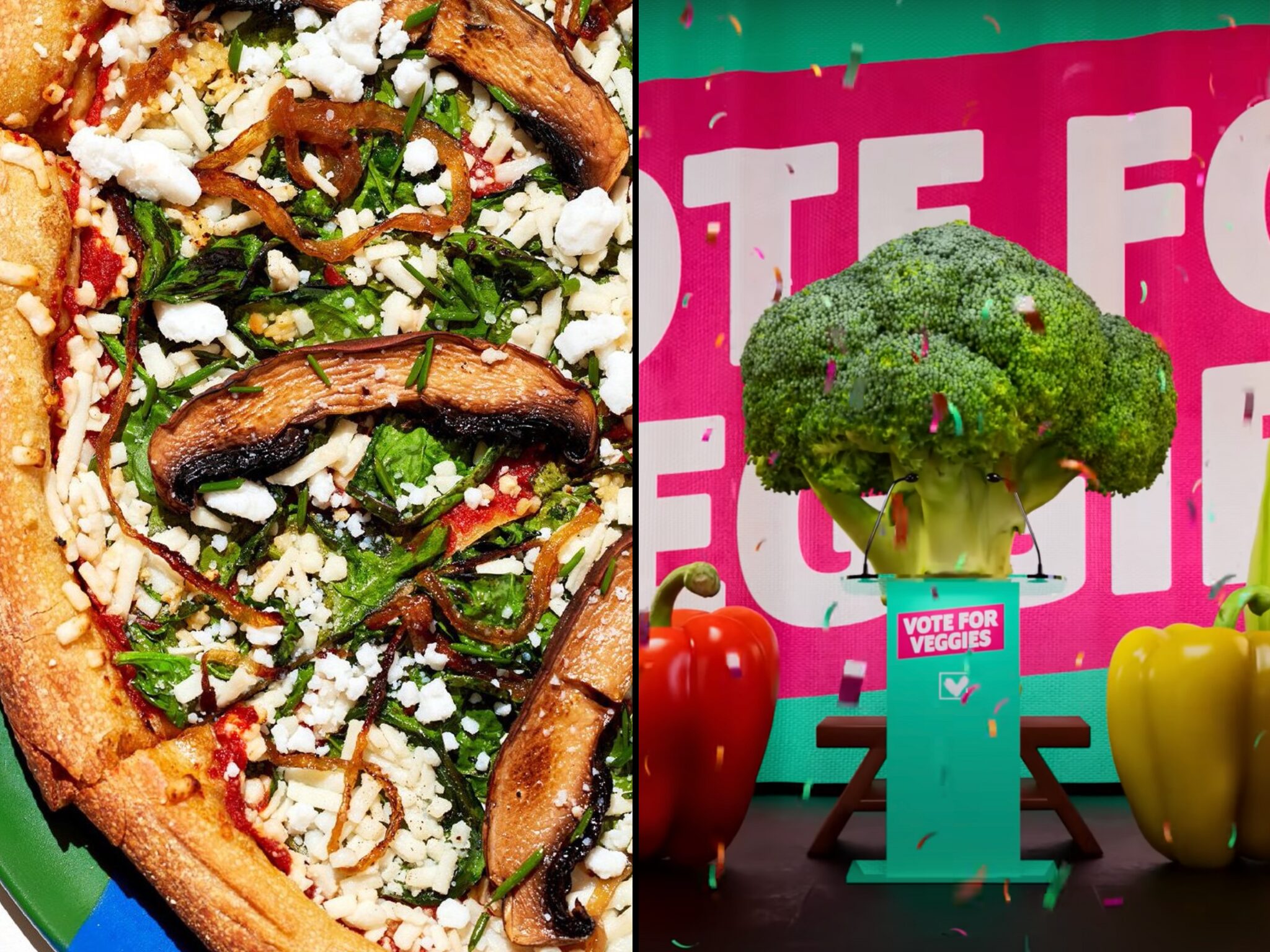
It’s that time of the year.
You’ll see the pink V sign more than ever, as supermarkets and restaurants highlight words like ‘vegan’ and ‘plant-based’ (even if that isn’t the best way to go) to capitalise on the boom in people trying to eat no animal products for the month of January.
While the UK – Veganuary’s home market – is always a hotbed of activity, the campaign is doubling down on its US focus this year with a host of partnerships across both retail and foodservice, alongside a poll and campaign that focuses on vegetables.

For 2024, Veganuary USA is working with restaurants, retailers and brands across the nation to cater to what’s expected to be another record-breaking year of signups. Among them are Divine Chocolate, SimplyProtein, Salt & Straw, Blue Sushi Sake Grill, Just Salad, Rush Bowls, Gyro Shack and Hard Rock Cafe.
There’s an increased focus on pizza too, with chains like &pizza, Sizzle Pie and Mellow Mushroom all launching Veganuary specials. The latter is bringing back its Miss Mushroom vegan pizza, which features spinach, minced garlic, portobello mushrooms, caramelised onions, chives, and vegan mozzarella and feta from Follow Your Heart. “Mellow Mushroom has long embraced veganism and other dietary lifestyle choices and needs, and Veganuary is the perfect opportunity for people to discover just how delicious eating a plant-based diet can be,” says Anna Mejia, VP of brand development at Mellow Mushroom.
Meanwhile, Chicago’s vegan deep-dish pizza maker Kitchen 17 has introduced a range of plant-based pan pizzas that are available for shipping nationwide. There are seven options and three gluten-free versions with house-made ingredients like vegan pepperoni and cheese.
Many brands are also running supportive campaigns via in-store promotions and social media, including Wicked Kitchen, Greenleaf Foods, New Seasons Market, London Drugs, Hart House, Jimbo’s in Southern California, Ritter Sport, Vitacost, and many more. “Vitacost is excited to celebrate this ever-growing ‘holiday’ with special offers and inspiring content to help participants and anyone else interested in eating more plant-based,” said Guy Burgstahler, business lead at Vitacost.
In addition to these partnerships, Veganuary has launched its 2024 campaign PSA, Vote for Veggies. In a video voiced by Ryan Eggold (New Amsterdam/The Blacklist), the health- and nature-focused campaign urges people to choose vegetables to “reduce emissions, improve health, lower food bills, protect animals, and promote healthier ecosystems”.
In line with this, it has declared purple sweet potato as the Vegetable of the Year, which was selected by a panel of food futurologists, chefs, and members of key nutrition, retail, and sustainability councils based on five criteria: growing popularity, versatility, sustainability, health and nutrition, and affordability and accessibility. “This upgrade to our loved traditional potato has been gaining in popularity,” says Holly Adrien, Natural and Organic strategy and innovation manager at Kroger. “Not only is the purple sweet potato versatile and a visual upgrade to any dish you make, they are an upgrade in nutrition as well, high in fibre, vitamins A and B and packed with antioxidants.”
It comes on the back of research commissioned by Veganuary and carried out by YouGov, which revealed that 71% of the 1,242 Americans polled are hoping to eat more vegetables in 2024. It’s reflective of the wider food landscape in the US, where the focus on ultra-processed foods has been high and plant-based meats have been criticised for their long ingredient lists. It has resulted in brands like Impossible Foods and Beyond Meat promoting their American Heart Association-certified meat alternatives with cleaner ingredient lists to appeal to consumer needs.
“More and more people worldwide are choosing to try vegan – many also stay vegan long-term, for animals, the planet, and their health,” says Sandra Hungate, US director at Veganuary. “All the new vegan menu items, products, and recipes promoted during Veganuary allow for people to eat more plants without giving up the foods they know and love.”
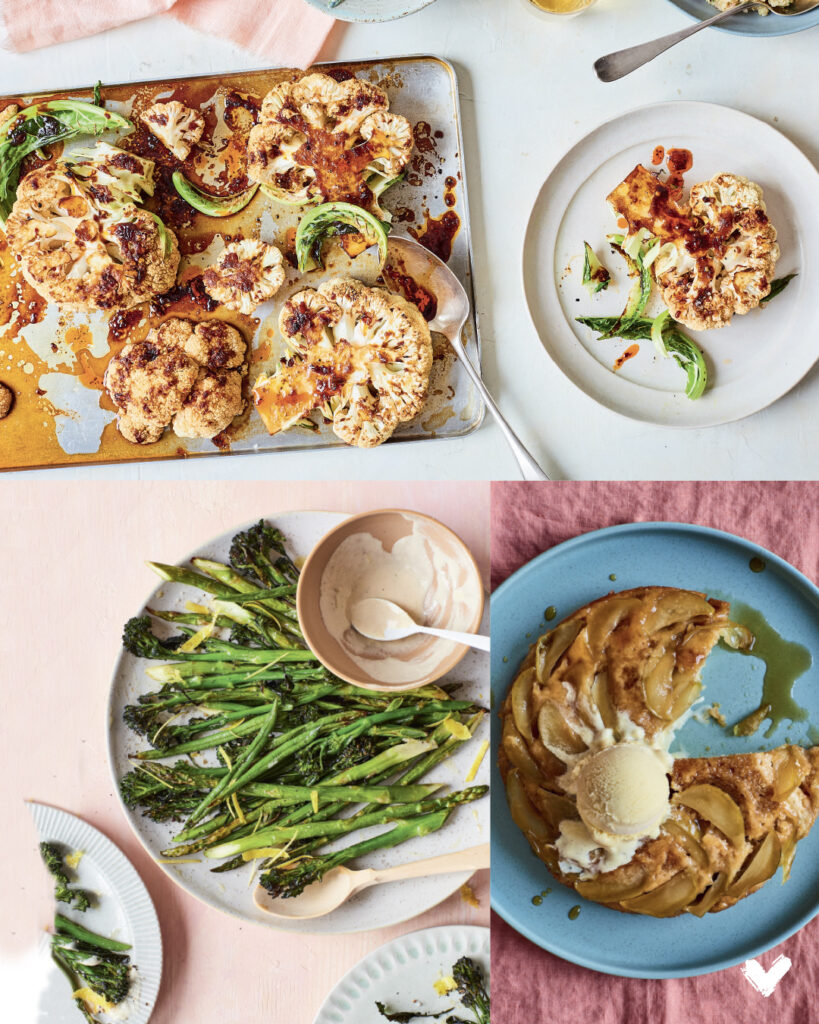
Veganuary has now released its first cookbook, which has over 100 recipes. And it collaborated with The Space Collective to launch a flag bearing its logo into space last year, spending 275 days and orbiting the Earth 4,400 times.
Toni Vernelli, the campaign’s communications head, says: “It’s amazing how the presence and acceptance of veganism has grown around the world in the past 10 years and I know Veganuary’s friendly, non-judgemental, just-give-it-a-go-for-a-month-and-see-what-you-think approach has played an instrumental role in this shift.”
The post Vote for Veggies: Veganuary Deepens US Focus with a Chunk of New Launches for 2024 appeared first on Green Queen.
This post was originally published on Green Queen.

Since the last Netflix vegan documentary changed the way many people looked at plant-based diets over four years ago, its director Louie Psihoyos is hoping to create a similar effect with his new docuseries, You Are What You Eat: A Twin Experiment, which started streaming on New Year’s Day, just in time for Veganuary.
The series is based on a Stanford study published in late November, which comprised 22 pairs of identical twins where one was put on a vegan diet and the other on a meat-based diet. The research aimed to control the genetic differences and influence of lifestyle factors in the findings, which reflected existing research about the impact of plant-based food on cardiovascular health – heart disease is the leading cause of death for Americans.
The documentary features star turns from vegan cheese queen Miyoko Schinner, Impossible Foods founder Pat Brown, three-Michelin-starred chef Daniel Humm (of Eleven Madison Park fame), US senator Cory Booker, public health nutritionist Tracye McQuirter, Clean Disruption author Tony Seba, alt-meat company Prime Roots founder Kimberlie Le, Wicked Kitchen co-founder Chad Sarno.
Across four episodes, You Are What You Eat highlights the Stanford study, the struggles and successes of the twins, concerns about recommended dietary guidelines, shiting to plant-based cooking, and the study’s results.
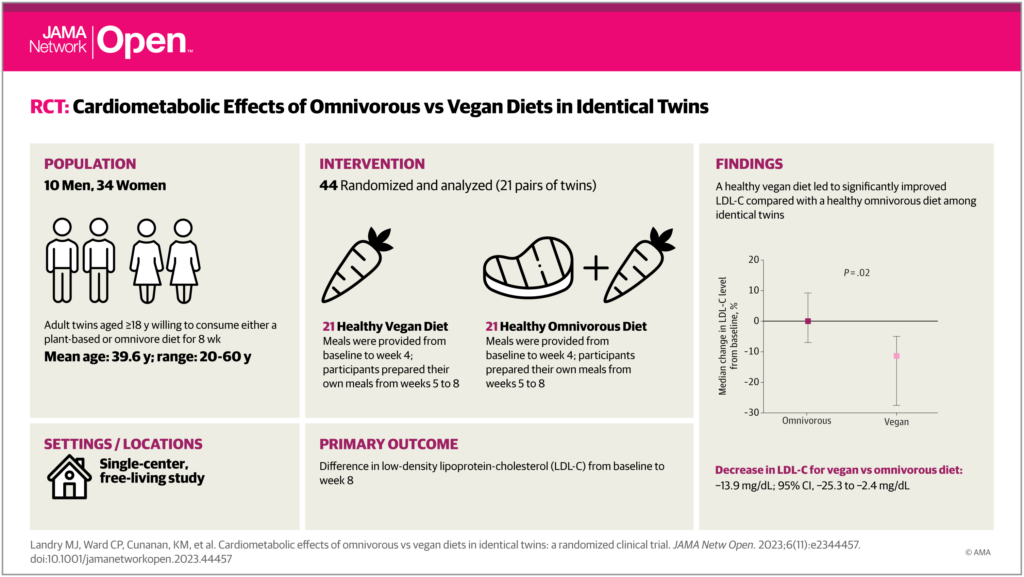
The study’s results have been in the public domain for a month now. Focusing on whole-food plant-based diets and an omnivore diet comprising chicken, fish, eggs, cheese, dairy and other animal-derived foods, it involved the participants being weighed and drawn blood from at three points. The most amount of change was seen in the first month, with those on a vegan diet exhibiting lower levels of LDL cholesterol, insulin and body weight – all factors associated with better cardiovascular health – than those eating meat.
At the beginning of the study, the average baseline LDL cholesterol level was 110.7 mg/dL for vegans and 118.5 mg/dL for meat-eaters. By the end, the former dropped to 95.5 and the latter to 116.1 (the optimal LDL cholesterol level is below 100). Additionally, the vegan participants showed a 20% drop in fasting insulin – higher insulin levels carry a risk of developing diabetes – and lost an average of 4.2 lbs (1.9kg) than the omnivores.
Those eating plant-based food had a higher intake of fibre and lower amount of saturated fat. And since grains are bulkier than meat, people could be more satiated and eat fewer calories. Cutting back on saturated fat, increasing the risk of dietary fibre and losing weight were the three most important things that the vegan participants did to better their heart health, according to lead author Christopher Gardner, who told CNN: “Based on these results and thinking about longevity, most of us would benefit from going to a more plant-based diet.”

In the documentary, Gardner describes the Standard American Diet – or “SAD” – as “not very healthy”. The result – a food culture built on processed foods – comes from decades of influential marketing and lobbying from the meat and dairy industry, which has convinced people that these foods are the only way to get the protein and calcium you need.
The docuseries is a deep-dive into health and nutrition, with an in-depth focus on aspects like the inaccuracy of BMI versus using metrics like body composition, microbial and gut bacteria composition, telomeres loss (which slows ageing), visceral fat (which accumulates around your organs), and sexual factors (not unlike what The Game Changers highlighted all those years ago).
“What we put in our mouths is more important than anything else,” says nutritionist and plant-based advocate Michael Greger, adding: “We’re as sure that processed meat causes cancer as we are that cigarette smoke causes cancer and plutonium causes cancer.”
One of the biggest pulls of the new documentary will be the appearance of Humm, who shook the culinary world when transforming his New York City eatery into a mostly plant-based one. After receiving the award for the World’s Best Restaurant, Humm looked at the ingredients that came into the kitchen during Eleven Madison Park’s 20-year run.

“If I’m truly honest, things have changed,” he says. “In the last five years, it’s changed more rapidly than ever before. Things used to be wild, now they’re farm-raised. Things used to be available, now they’re not available. Things used to taste a certain way, now they taste totally different. The quality of our food – it’s changing in front of us, rapidly.”
“I started to realise the impact that animal farming has all over the world. I started to realise what was going on in the fish industry, and how broken it is. I started to feel guilty because I felt that, for a long time, I didn’t question enough exactly where our food was coming from. Like, all of our food. When you have that knowledge, you have the responsibility to speak about it.”
You Are What You Eat focuses on four of the twin pairs from the study. Pam and Wendy run a catering business together, Charlie and Michael are cheesemakers and food safety experts, Carolyn and Rosalyn are Filipino sisters (the former is a sports relationship coach, the latter a high-school teacher), and Jevon and John are nursing students with a heavy intake of frozen, processed food.
After the experiment, one of the twins says: “For me, plant-based eating is the direction to go.” All the twins were either omnivores or pescetarians at the beginning, but Netflix followed up with them post-release and found that all of them have since changed the way they consume meat. While still omnivores, Pam and Wendy have cut their meat consumption by half, John and Jevon no longer eat red meat, and Carolyn and Rosalyn are eating more plant-based.
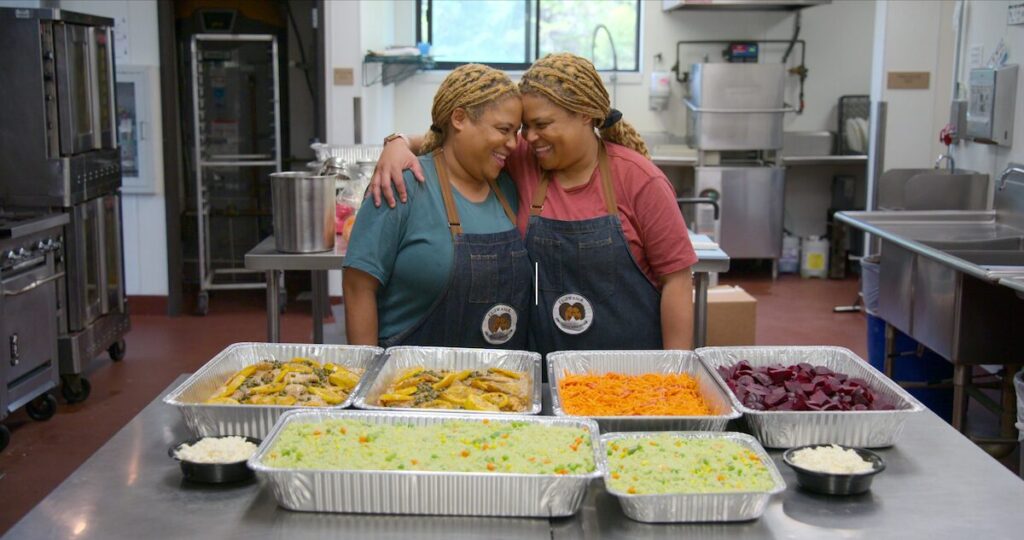
The biggest change was with Charlie and Michael. The former is “almost 90% vegetarian”, save for Chicken soup and some Chinese favourites. The latter, who was a pescetarian, is now fully vegetarian. The shift was driven by concerns about climate change, animals, worker safety, food safety, and health, following the study’s findings.
The results of the research surprised the Stanford researchers themselves, with people eating a vegan diet witnessing an increased life expectancy, reduced visceral fat and heart disease risk, and a heightened sexual drive. “We can solve a lot of issues that are hurting us and cropping our planet by just rethinking what’s at the end of our fork,” says Gardner.
The post Netflix Series ‘You Are What You Eat’: Vegan Diet Benefits Includes Better Sex, Longer Life and a Healthier Heart appeared first on Green Queen.
This post was originally published on Green Queen.
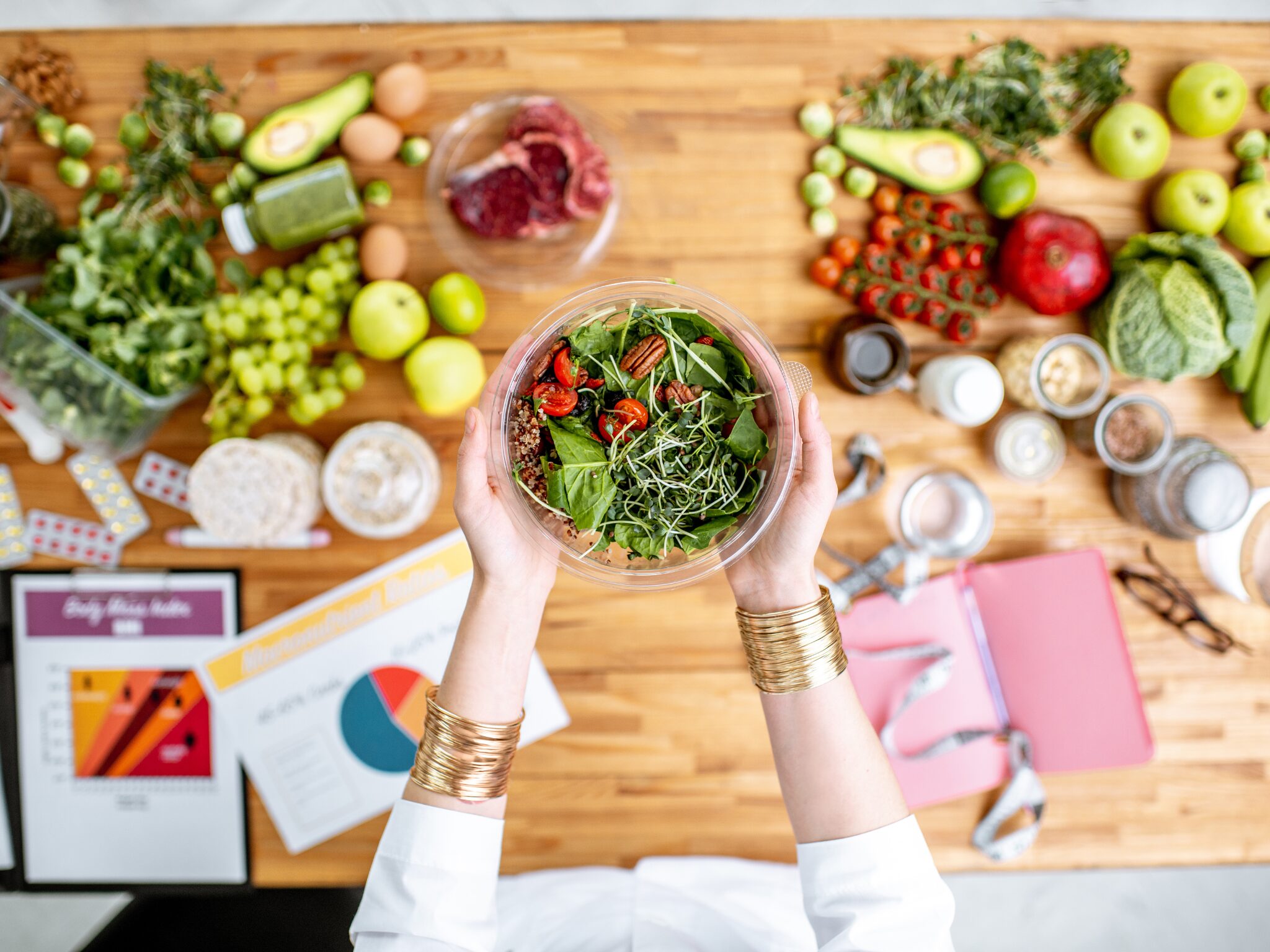
For ages, there have been three main factors behind people’s decision to go vegan: the environment, the animals, and health. Lately, consumer focus on the latter has magnified, with post-pandemic attitudes towards wellness and nutrition driving the way people think about food.
With Veganuary fast approaching, if you’re thinking of joining the expected record participation numbers, but are unsure of the real health effects of veganism, there have been a host of studies published earlier this year to guide your thinking. For example, if you’re thinking big picture, a 100,000-person study over 30 years from Harvard University revealed that a plant-forward diet could reduce the risk of death from cancer, heart disease and chronic illnesses by 25%.
There’s also consumer confirmation here, with a 1,000-person YouGov UK poll revealing that 68% of respondents found that their health improved as the result of a vegan diet. Here are some of the studies highlighting the benefits of a plant-based diet to reassure you for Veganuary 2024.

Two separate studies from the last few months have found links between veganism and a reduced risk of chronic kidney disease (CKD). In October, research published in the American Journal of Kidney Diseases (AJKD) analysed 117,809 people over a decade to determine the effect of plant proteins on CKD. The researchers found 3,745 cases of the condition (3.2% of the total participants), and those with a higher vegan protein intake were found to have a lower risk of developing the disease over a 10-year period
“There has been accumulating evidence that animal protein consumption may have detrimental effects on vascular health, potentially contributing to the development of kidney disease,” lead author Seung Hyeok Han told Health, adding that plant-based proteins offer several advantages over animal-derived foods for the kidneys, including “a lower acid load, reduced saturated fat content, rich fibre content, and antioxidant properties”. “This beneficial association was also evident in individuals with hypertension, diabetes, higher BMI, and higher inflammation level.”
Another study in the AJKD has found similar results. Analysing 2,539 participants with CKD, it found that participants with the highest adherence to “overall” and “healthy” plant-based diets had a 26% and 21% lower risk of all-cause mortality, respectively, with a higher score of an “unhealthy” vegan diet associated with a 14% and 11% higher risk of CKD progression and mortality, respectively.
While nutritional guidance for kidney patients traditionally revolves around limiting protein intake and controlling phosphorus and potassium levels, this study suggested that a plant-based diet could be a viable and beneficial option for them. “These findings challenge some of the status quo in nutritional guidance while offering actionable insights for healthcare professionals and CKD patients, providing a potential avenue for enhancing their well-being – and even their survival,” said lead researcher Dr Casey Rebholz.

In yet more research published in the AJKD, the Harvard TH Chan School of Public Health analysed the health data of 216,695 Americans, with food frequency questionnaires every two to four years, for up to 36 years. In this time, over 22,000 participants developed type 2 diabetes.
The researchers found that red meat consumption – whether processed or unprocessed – is strongly linked with an increased risk of type 2 diabetes, with people eating the most red meat being 62% more likely to develop the condition compared to those who consume it the least. Plus, each additional daily serving of processed and unprocessed red meat carried a 46% and 24% greater risk, respectively.
The study also found that substituting a daily serving of red meat with a serving of nuts and legumes reduced the risk of developing type 2 diabetes by 30%, while doing so for dairy led to a 22% lower risk.
Another study from MedUni Vienna’s Center for Public Health, published in the journal Diabetes & Metabolism, covered 113,097 participants over an observation period of 12 years. It revealed that a whole-foods plant-based diet could reduce the risk of type 2 diabetes by 24%, even in the presence of genetic predisposition and other risk factors like obesity, advanced age, and low physical activity. Unhealthy vegan diets – those containing a high proportion of sweets, refined grains and sugary drinks – are associated with an increased risk.
The researchers suggest that the reasons for healthy plant-based diets’ anti-diabetic effect go beyond the often-cited lower body fat percentage and waist circumference. “Our study is the first to identify biomarkers of central metabolic processes and organ functions as mediators of the health effects of a plant-based diet,” said lead author Tilman Kühn.
He added: “Our research has now shown that a healthy plant-based diet can improve liver and kidney function and thus reduce the risk of diabetes.”

It’s not all about the adults, now, is it?
A review of 30 dietary studies published between 2000 and 2022 compared the effects of vegan, vegetarian and meat-eating diets on children and teenagers aged two to 18. While energy intakes were largely the same, the study revealed that the average protein intake in vegans (10.9% of the daily energy consumption) and vegetarians (12.5%) was lower compared to meat-eaters (13.8%), but these mostly met and exceeded the lower level if the acceptable macronutrient distribution range for protein (between 10-35% of the energy intake).
In terms of fibre, vegan diets clearly had the highest amount (29.9 g/d vs 15.5 and 14.3 g/d for vegetarians and meat eaters, respectively). Despite this, while children fed a plant-based diet were at risk of getting inadequate fibre, their intake was much more favourable than meat-eating kids.
Meat-eaters also had the highest intake of saturated fats, and lowest intake of polyunsaturated fat – which was the opposite for vegan diets on both fronts. And while the study revealed that vegans were at a higher risk of vitamin B12, zinc and iron deficiencies, natural sources of these nutrients can be found in different plant-based foods.
Meanwhile, meat-eaters were likely at risk of inadequate folate and vitamin E intakes – plant-based foods like nuts, greens and beans are rich in these nutrients.
There’s a lot of information out there about the health benefits of a vegan diet. If you’re sceptical of Veganuary, just look to the millions who have already been following a plant-based diet for years – some even decades. The challenge is there for the taking.
The post Sceptical of Veganuary? These Recent Studies Show the Health Benefits of a Plant-Based Diet appeared first on Green Queen.
This post was originally published on Green Queen.
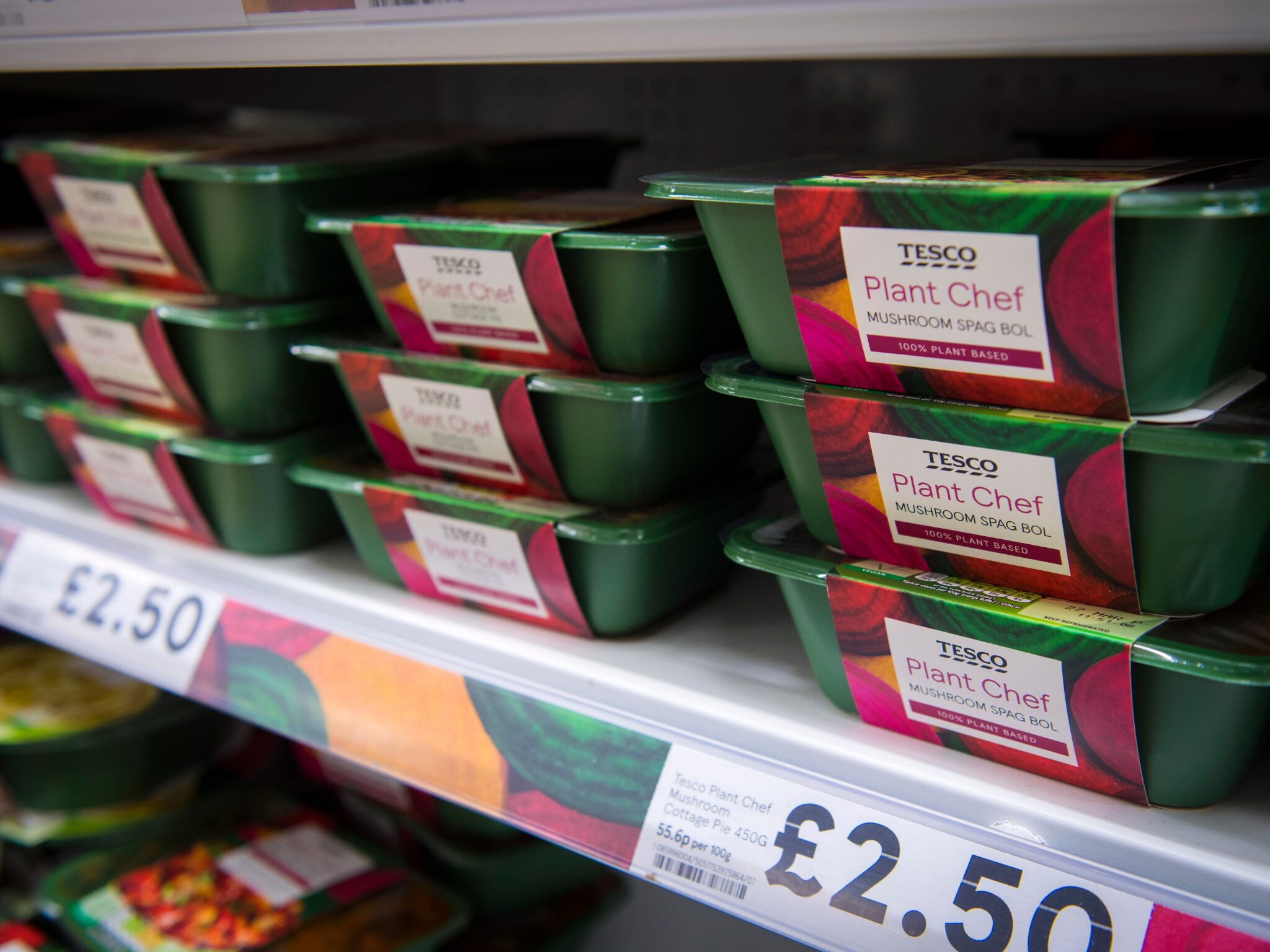
Every year, supermarkets in the UK transform on January 1 – and it’s not just for the new year. The words ‘vegan’ or ‘plant-based’ are much more prominent on store signs, with monthlong discounts on milk alternatives and meat analogues enabling people to overcome the cost barrier and embrace Veganuary.
This time, while there will be much of the same, a key difference will lie in the variety of products available to consumers. While Veganuary always sees discounts on branded SKUs alongside a few (mostly) limited-edition private-label launches, retailers will be delving deep into their own R&D to create more affordable items for a budget-constrained Britain.
And it will come on the back of the first time private-label sales have overtaken brands since the pandemic, thanks in no small part to the increased cost of living.
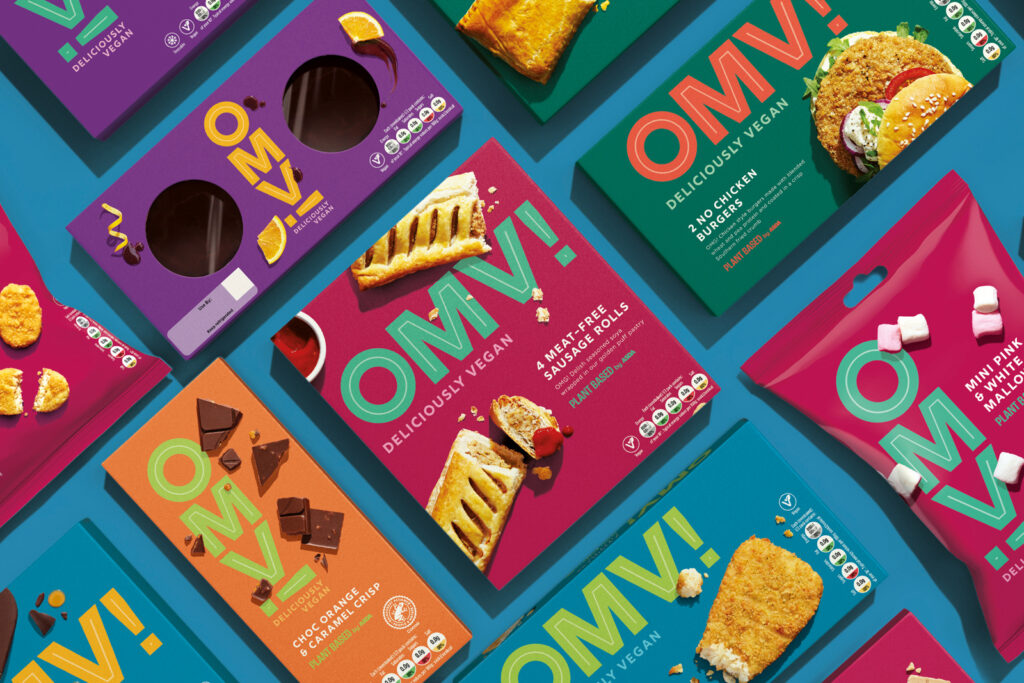
According to market research firm NielsenIQ, private-label sales at UK retailers grew at double the speed of brand items (14% vs 7%) in 2023. In April, own-label accounted for 55% of grocery store sales, and 63% of the volume. And NielsenIQ data for the Grocer’s 2023 Top Products survey revealed that even though supermarket labels saw a 2% decline in volume (about 200 million units), they were still performing better than brands, whose volume was down by 2.6%, or 500 million units.
Additionally, private-label lines experienced more value growth – 12% vs 8% – despite keeping their average prices at two-thirds that of brands. “Without retailers really knowing, they were laying the foundations so that when the cost-of-living crisis hit, the fact there were such strong private-label brands and products already out there made it a lot easier to emphasise that quality and to push even more customers their way,” Paul Stainton, partner at International Private Label Consult, told the Grocer.
A recent NielsenIQ survey revealed that 54% of consumers believe own-label lines are good value for money. Meanwhile, 40% said the products were of higher or equal quality than brands, and 52% thought they were a good alternative to brands. “Private label has emerged as an unexpected hero in the cost of living crisis, helping consumers maintain their taste for value,” wrote Rachel White, UK and Ireland managing director at NielsenIQ.
“But they do not have to simply be a response to tough economic times. Their enduring appeal, growing consumer acceptance, and global success stories underscore their importance in the future of the grocery industry.”
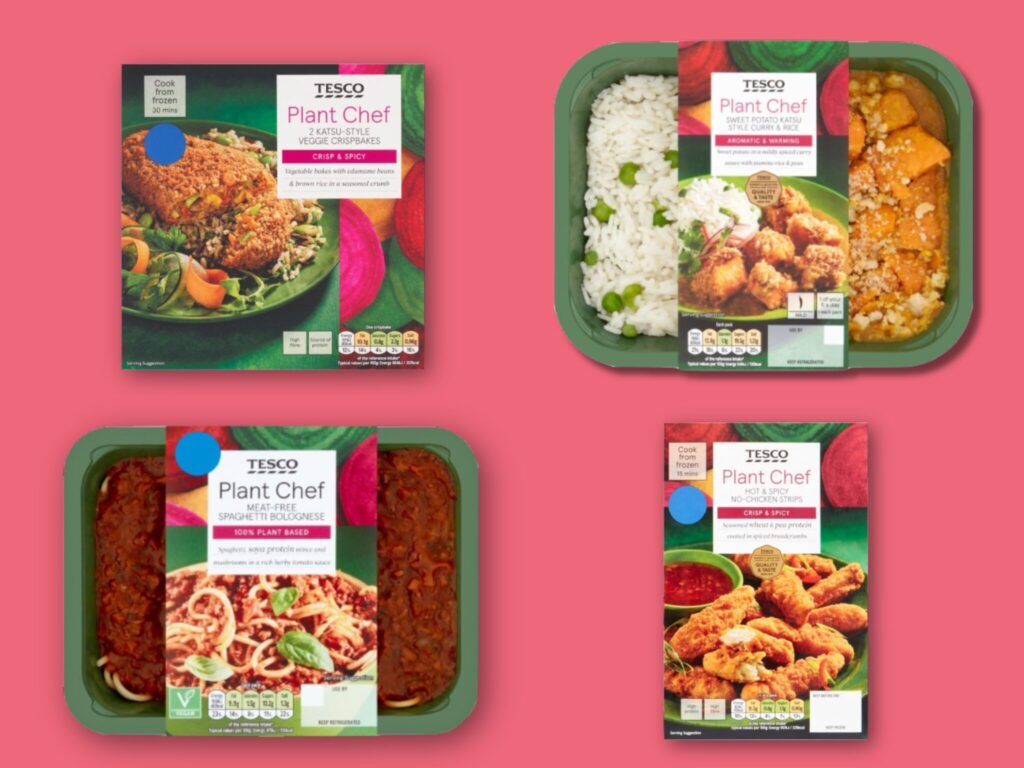
The Grocer’s data pointed out how Asda introduced over 800 more own-label items this year as part of its Just Essentials line, while Tesco – the UK’s largest retailer – actually reduced its private-label SKUs by over 500, but still managed to grow value sales by 10% with an innovation focus on “fast-growing categories such as plant-based”. For example, it boosted its Plant Chef line with five new frozen ranges to coincide with Veganuary.
Veganuary 2024 seems primed for similar moves. Last year, over 820 new products were launched during the campaign, and with a record-breaking number of participants expected again, supermarkets are hoping to capitalise on the surge of vegan sales with cheaper own-label products and ready meals to ease wallet pressure.
Tesco is introducing a range of international flavours to its Plant Chef line. Products include Meat Free Spaghetti Bolognese, No-Beef Meatballs, Meat Free Southern Fried Fillets, Hot & Spicy No-Chicken Strips, Sweet Potato Katsu Style Curry, Mexican Inspired Bean Burgers, Katsu Style Veggie Crispbakes, and Spicy Bean Burgers.
These range from £1.75 to £3, and serve as either building blocks for dishes or as entire meals themselves. “Plant Chef is not only designed for those already eating a vegan diet, but is also perfect for anyone looking to include more plant-based meals in their weekly routine, with a selection of convenient meals that don’t compromise on taste,” the retailer said, hinting at the push towards flexitarians taking up the 31-day Veganuary challenge.
Other retailers are expected to add new plant-based products to their own-label lines too. Discount supermarkets Lidl and Aldi typically offer limited-edition private-label vegan items like tofu, tempeh, vegan cheese and chocolate to get a slice of the Veganuary pie.
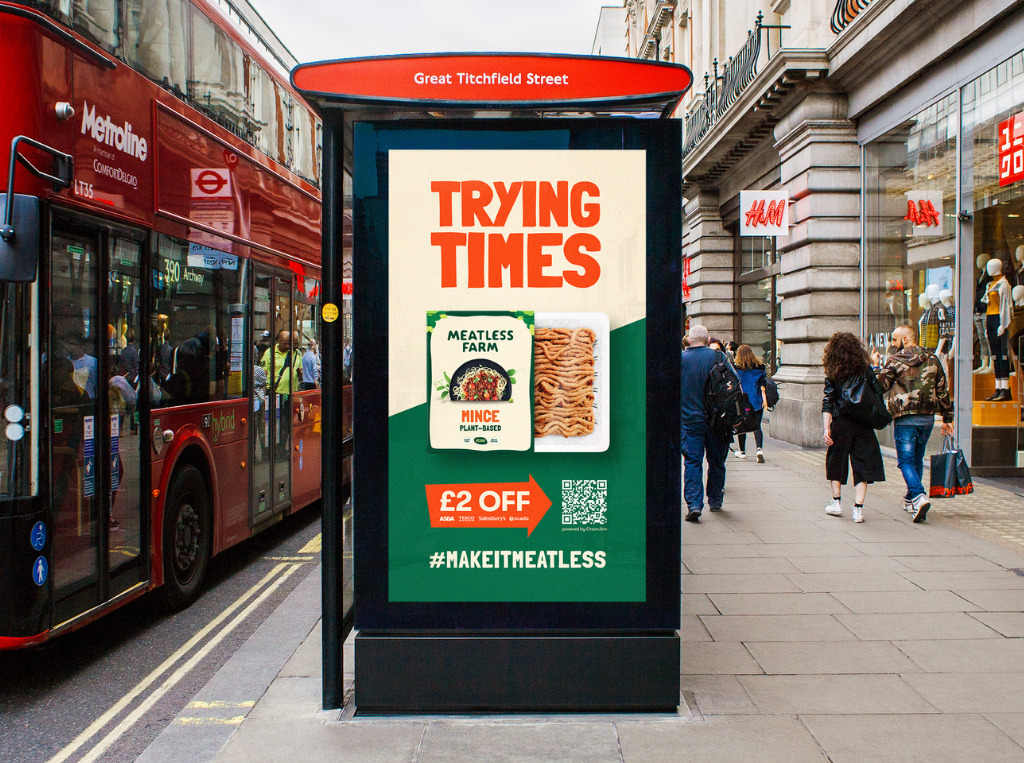
The Grocer’s Top Products survey also revealed that sales of meat-free products in the UK are on the decline, particularly as the higher markups discourage cost-of-living-hit shoppers from buying vegan analogues. Sales have declined by £38.4m, while volume is down by 4.2%. Meanwhile, fresh meat was among the fastest-growing sectors, with £352.5M in sales growth.
“Inflation of meat-free ingredients has been ahead of meat, which has meant meat-free has become a pricier option,” explained Chris Doe, UK marketing and innovation director at Pilgrim’s Food Masters. “In turn, the industry has seen flexitarian shoppers increasingly switch back to meat.”
This has spurred campaigns like restaurant chain Burgers & Beyond’s Anti Veganuary menu – the eatery is removing all vegan offerings from its menu and replacing them with meat-based options. “As a butcher, it goes without saying that I think Veganuary is an unhelpful message,” says Richard Turner, who is consulting on the menu. “If you want to eat less meat then just buy less, but better quality.”
But the UK is doing neither of those things. While its population is eating less meat and dairy than ever recorded, sales of fresh meat – as mentioned above – are growing. And of the meat that Brits are buying the most, 95% comes from factory farms.
“The cost-of-living crisis continues to impact UK consumers and our data shows that this has had an effect on how they shop for groceries and what they choose to put in their baskets,” said NielsenIQ’s White.
“There has been a real emphasis, despite inflation, on stripping it back to traditional items, such as fresh meat and dairy products and a move away from trying more expensive meal solutions, which have shifted the dial in terms of the meat-free category,” she added. “Whether this will have an impact in January when many like to experiment with Veganuary, remains to be seen.”
The post Veganuary 2024: UK Supermarkets Champion Private-Label Ranges for Plant-Based Challenge appeared first on Green Queen.
This post was originally published on Green Queen.
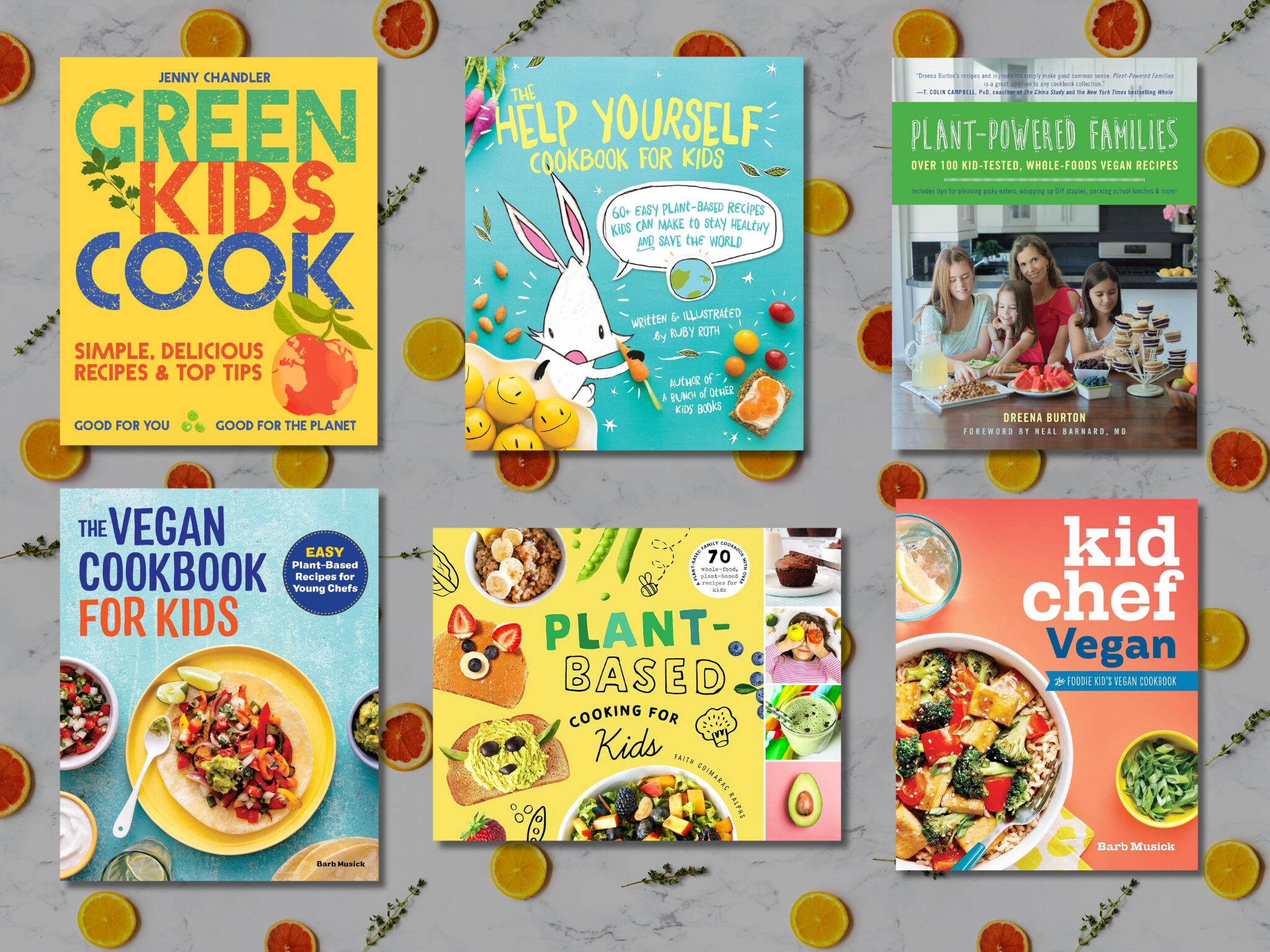
Gen Z is well-known as the demographic that cares about the planet more than any other generation – and they’re passing this on to Generation Alpha, who are set to be the largest age demographic group in history.
We speak of safeguarding the planet for future generations – irrespective of the fact that we need to do it for ourselves now too, today’s kids are part of those demographics that will see the worst of climate change. But they’re already taking action – a survey conducted by McCrindle revealed that 80% of parents have been influenced by their Gen Alpha children to change their consumption behaviours or actions to be more eco-conscious.
Among the best things you can do as an individual to help the planet is change your eating habits – this means less meat, less dairy and more plants, more alternative sources of protein. With Veganuary fast approaching, it’s a good time to gift your kids a plant-based cookbook to develop their culinary skills in a way that doesn’t hurt the planet. Plus, it’s a great way to get children to diversify their protein intake, and get them involved in your own Veganuary journey too (or help them along theirs).
Here are some of the best vegan cookbooks for kids.
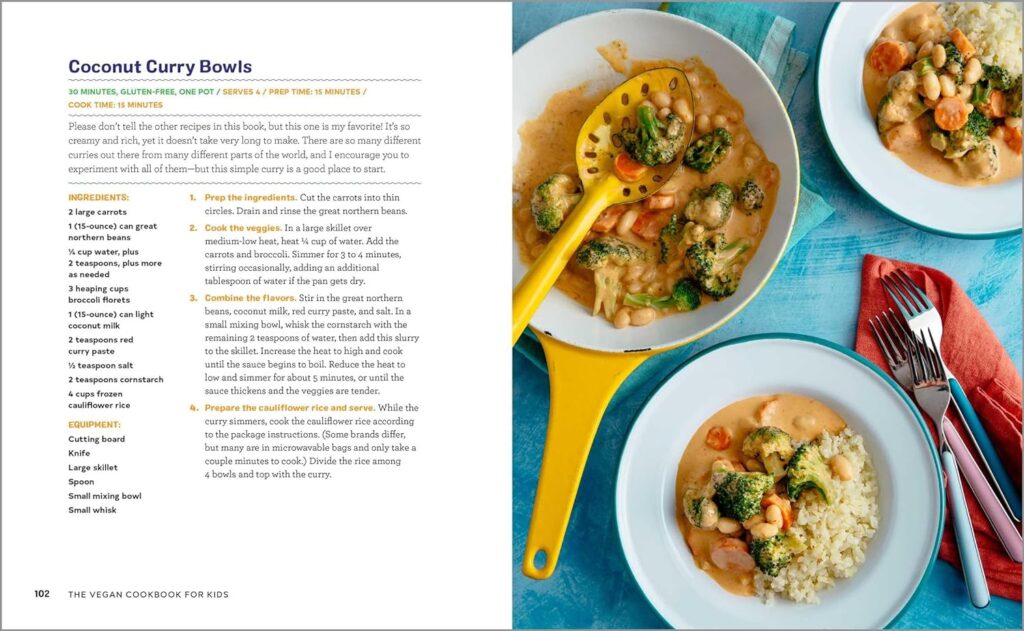
Pretty self-explanatory when it comes to the name, The Vegan Cookbook for Kids: Easy Plant-Based Recipes for Young Chefs is a recipe book perfect for children aged eight to 12. It features 50 easy-to-follow recipes with easy-to-find ingredients, alongside information about plant-based ingredients, essential kitchen tools, and safety guidelines.
The recipes traverse multiple cuisines and flavours, all replete with colourful imagery that would inspire kids to show off their culinary chops (pun unintended). These include a meatless shepherd’s pie (using beans), Korean BBQ bowls, spicy peanut noodles, cinnamon swirl pancakes and veggie-forward pizza.
You can buy The Vegan Cookbook for Kids by Barb Musick online via Amazon, or through various bookstores.
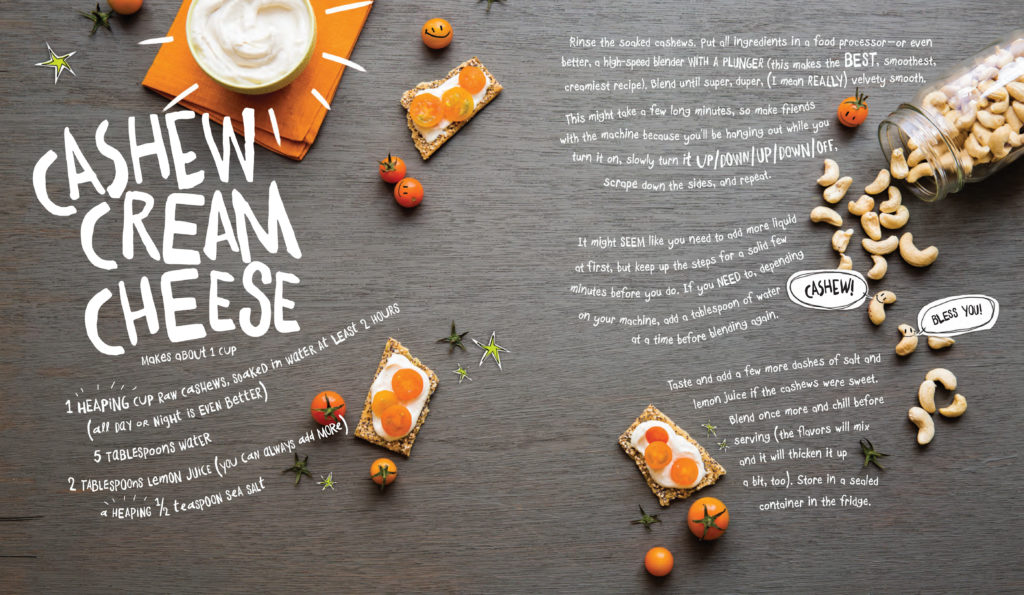
Published in 2016, Ruby Roth’s The Help Yourself Cookbook for Kids has a long tagline that explains it all: 60 Easy Plant-Based Recipes Kids Can Make to Stay Healthy and Save the Earth. This is a very fun cookbook, with 60 vegan recipes complemented with photo collage illustrations, animal characters, and did-you-know facts.
Facilitated by playful imagery and fonts, kids aged six to 12 can begin using this cookbook this Veganuary with recipes like Tiger Stripes seaweed salad, Tomato Tornado soup, Blaze a Trail nut mixes, Puff Love mochi two ways, and Quinoa ‘Round the World.
You can buy The Help Yourself Cookbook for Kids by Ruby Roth online via Amazon, or through various bookstores internationally.
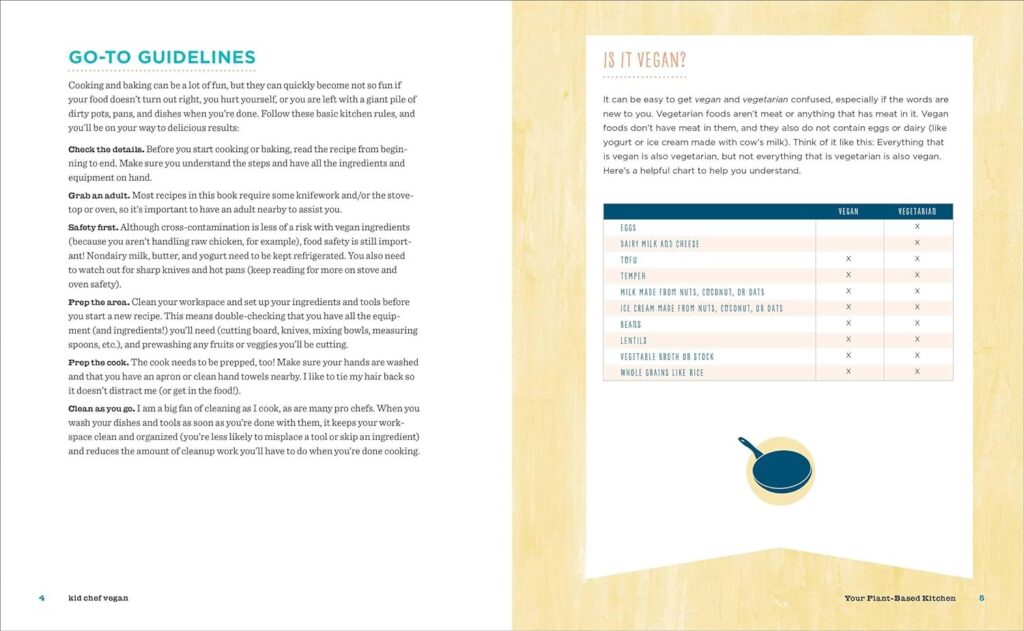
A follow-up to Musick’s 2020 cookbook, Kid Chef Vegan is billed as The Foodie Kid’s Vegan Cookbook. Also for children aged eight to 12, this book offers a culinary crash course – like measuring accurately, mixing properly, slicing like a pro and setting up the workspace – and helps incorporate more fruits and vegetables in their repertoire.
The cookbook contains substitutions to cater to allergies too, imparting a crucial piece of knowledge to be ingrained from a young age. As for the recipes, they range from breaded no-chicken nuggets and a sloppy joe casserole to a Great Big Tofu Salad and peanut butter-coconut cookies.
You can buy Kid Chef Vegan by Barb Musick online via Amazon, or through various bookstores.
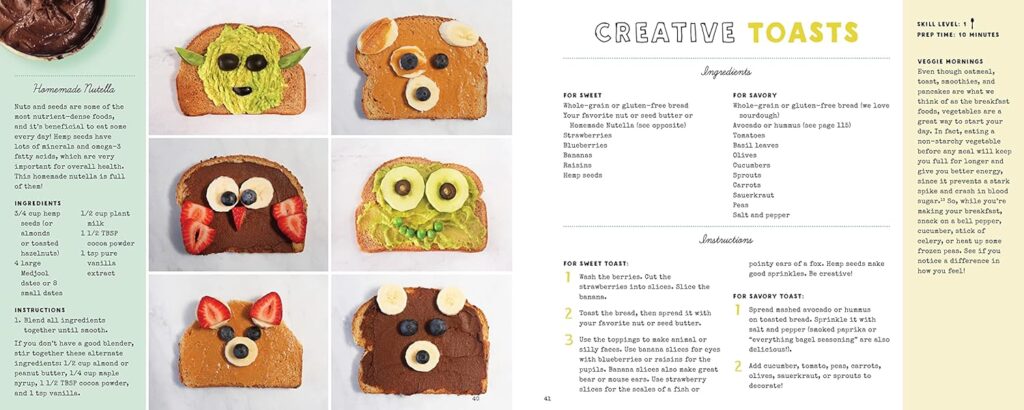
Published last year, Plant-Based Cooking for Kids: A Plant-Based Family Cookbook with Over 70 Whole-Food, Plant-Based Recipes for Kids contains something for people on all dietary spectrums: whether you’re already fully vegan, have just started out, or are a flexitarian looking to eat less meat and dairy (or perhaps partaking in Veganuary).
The book is filled with colourful photos that help visualise the end dish for kids, alongside an initial section with tips on plant-based eating, substitutions, conversions, and even ideas to get children to cook more. Recipes include creative toasts, homemade boxed mac and cheese mix, carrot cake breakfast cookies and chickpea nuggets.
You can buy Plant-Based Cooking for Kids by Faith Ralphs online via Amazon or Bushel & Peck.

Another cookbook adopting the whole-foods plant-based approach, Plant-Powered Families: Over 100 Kid-Tested, Whole-Foods Vegan Recipes by veteran cookbook author Dreena Burton features dishes that promote healthful eating and family-friendly cooking. With more than 100 recipes spanning from breakfast and lunch to desserts and snacks, it acts as a reference for parents raising vegan children, or families looking to transition towards a plant-based diet, making it ideal for Veganuary.
Meant for “every age and stage – from toddler to teen years” – the Plant-Powered Families features tips to please picky eaters, make DIY staples, deal with challenging social solutions, and pack school lunches, with recipes tested by Burton’s three children alongside nutritionist-approved references to allay dietary concerns. There’s a broad range of dishes for kids to try making here, including vegan cinnamon french toast, sneaky chickpea burgers, soy-free vegan feta, vanilla bean chocolate chip cookies and creamy fettuccine.
You can buy Plant-Powered Families: Over 100 Kid-Tested, Whole-Foods Vegan Recipes by Dreena Burton online via Amazon.
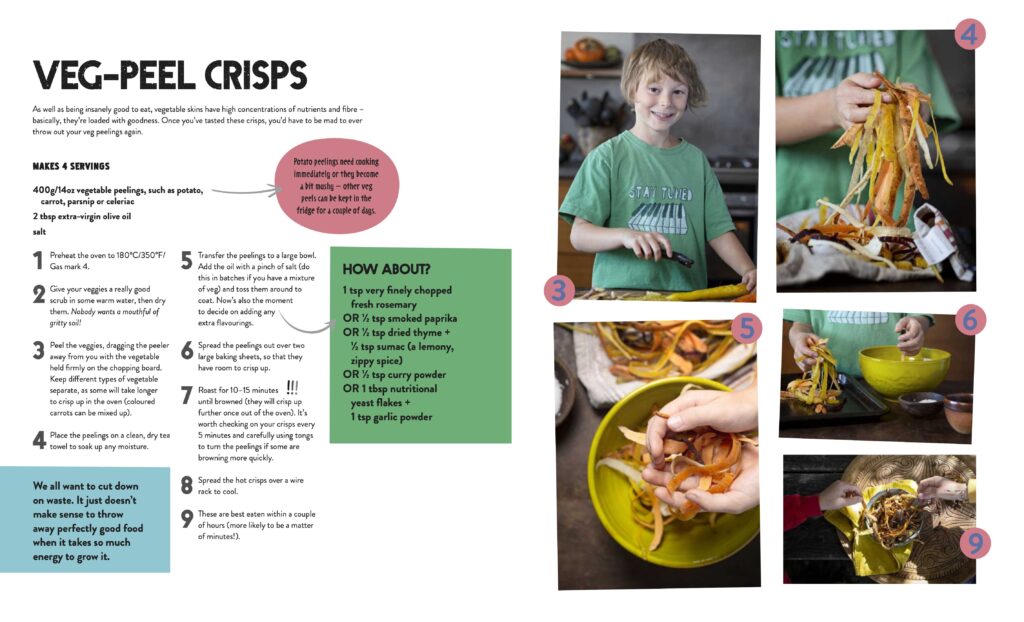
We’ve listed this as a bonus because this isn’t a fully vegan cookbook – more a vegetarian one – but it is a book that aims to do better by the climate with planet-friendly recipes as well as techniques to cut food waste. Green Kids Cook: Simple, Delicious Recipes & Top Tips: Good for You, Good for the Planet spotlights over 60 classic family recipes with a focus on healthy eating.
The premise is: the best way for kids to eat more vegetables is by letting them cook with them, and have fun while doing so. Apart from a more eco-friendly diet, the book presents ways to ditch plastic and cut waste – for example, there are guides like the one for beeswax wraps, as well as recipes such as vegetarian black bean quesadillas, homemade granola, vegetable peel crisps, and green pea and coconut recipes. All come with photographs showing children making the dishes, instilling a sense of confidence in the reader.
You can buy Green Kids Cook by Jenny Chandler online via Amazon, or through various bookstores.
The post Eco-Conscious Gen Alpha: 6 Vegan-Friendly Cookbooks for Kids Ideal for Veganuary appeared first on Green Queen.
This post was originally published on Green Queen.

It has been another struggle of a year for plant-based meat – In the UK, where sub-brands have been withdrawn and other players have collapsed, sales are down year-over-year, primarily due to price constraints as a result of the higher cost of living.
This has meant it is one of the worst-performing grocery categories in 2023, behind only cigarettes, tobacco and alcohol. Sales have declined by £38.4m, while volume is down by 4.2%. On the opposite end of the spectrum, fresh meat was among the fastest-growing sectors, with £352.5M in sales growth.
One of the few categories that surpassed meat was milk, whose sales values were up by £497.6m – but in both these segments, inflation is masking the true trend: volume is down by 181.9 million litres for milk, for example, while the rise in sales for chicken (the top-performing food) was largely driven by a 13.4% price hike. This is reflected by the fact that Brits have been eating less meat and dairy than ever recorded.
The milk market was hit by a fall for plant-based dairy market leader Alpro, which experienced the biggest percentage loss among the top 30 brands in the sector. Once again, the usually higher price of milk alternatives was a key driver here. This is according to NielsenIQ data for the Grocer’s Top Products survey for 2023.

2023 was a year that saw British plant-based meat businesses like Plant & Bean, LoveSeitan and VBites fall into administration, just as Meatless Farm was rescued from the brink by fellow alt-meat maker VFC. Meanwhile, the world’s largest FMCG brand, Nestlé, withdrew two plant-based lines from the UK market, one of which was its alt-meat brand Garden Gourmet, just as Heck reduced its meatless range from 10 products to just two.
These events reflected a loss in consumer confidence in this category, with high prices keeping them away from grocery baskets. “After many years of strong growth, the meat alternatives market has fallen into decline,” said NielsenIQ senior insight analyst Carol Ratcliffe. “Shoppers are less willing to pay the premium associated with meat alternatives and are switching to cheaper sources of nutrition.”
The UK’s alt-meat market leader Quorn, which had reported a £15.3M in its annual accounts earlier this year, is down 8.1% in volume, but has seen a small spike (+0.2%) in value, reaching £155.8M. “We have seen huge changes in consumer behaviour led by turbulence in the global economy and this has led to a slowdown in the meat alternatives category, but it comes against a backdrop of many years of strong growth,” said Gill Riley, UK consumer director for Quorn.
Its closest rival Linda McCartney actually suffered the largest loss among the top 30 brands, down by £6.6m. Richmond and Cauldron, the next best on the list, lost 3.1% and 11.2% in value sales. “Inflation of meat-free ingredients has been ahead of meat, which has meant meat-free has become a pricier option,” explained Chris Doe, UK marketing and innovation director at Pilgrim’s Food Masters (the parent company of Richmond). “In turn, the industry has seen flexitarian shoppers increasingly switch back to meat.”
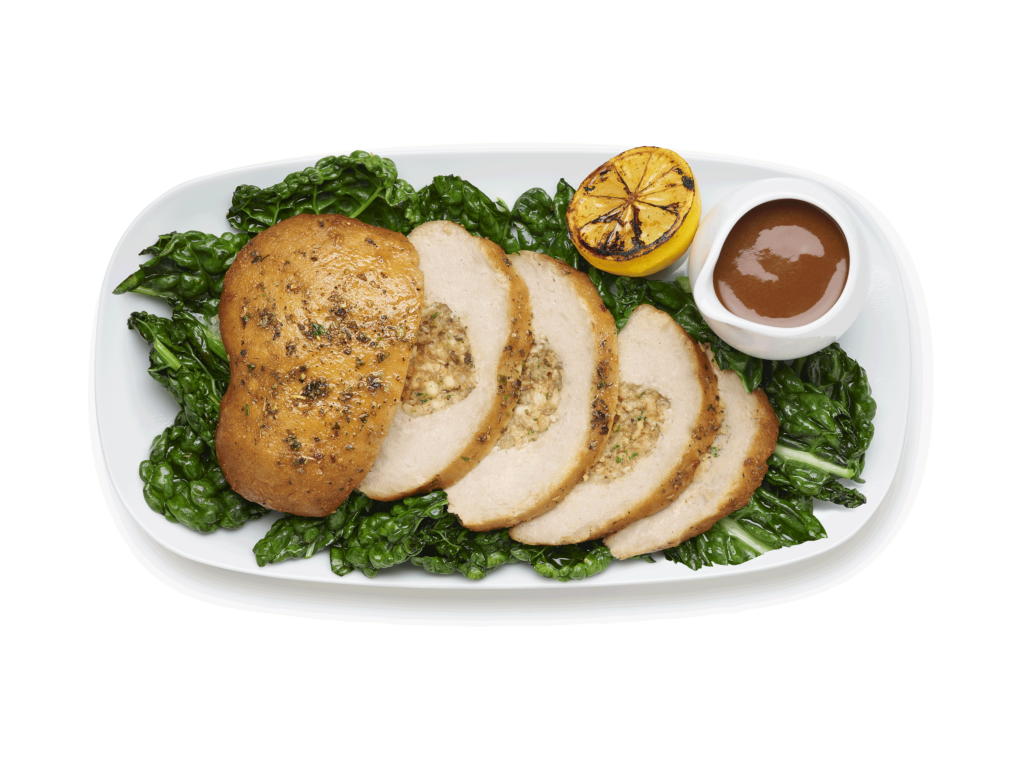
On a more positive note for the industry is the rise of challenger brands like THIS and VFC, both makers of vegan chicken. The former has seen its value expand by 46.6%, with volume up by 66.6%. This was driven by a £15M Series B fundraiser in March, which allowed the company to invest in R&D and launch new products like a roast chicken and a chicken and bacon pie, according to NielsenIQ’s Ratcliffe.
“Innovation has been a core part of its growth over the last two years as it has diversified into a wider range of segments, including frozen, ready meals and food to go, as well as continuing to launch new products in its core segment of chilled meat alternatives,” she said.
THIS marketing director Dee Bulsara explained that quality is key when it comes to new launches, which don’t happen “unless we think the product can trick a meat-eater once it’s in a dish”. Additionally, increased store listings has also helped THIS. “The market is consolidating, with declining brands coming out, which has allowed us to really grow,” she noted, echoing THIS CEO Andy Shovel’s comments to Green Queen in October. “No supermarket needs 18 types of burgers, so it’s really important to make the category easier to shop.”
Meanwhile, VFC, which has expanded its meat-free portfolio with the acquisitions of Meatless Farm and Clive’s Purely Plants this year, saw an exponential rise in sales value (+199.3%). Despite that, however, it retains a tiny share in the overall meat-free market – as does THIS, whose total value is dwarfed by that of Quorn’s, which is nearly 10 times as high.

Expanding on Bulsara’s point, Ratcliffe noted that maintaining high quality will allow brands to justify their price premiums “via clear flavour, format or nutritional benefits”.
Moreover, Squeaky Bean marketing controller Becky Youseman outlined the importance of innovation – the brand has unveiled a host of new products amidst an 8.8% drop in volume: “Successful brands are offering NPD that either brings something totally new to the market or fills a gap to answer a consumer need,” she said.
Georgina Bradford, marketing director of nutrition at Unilever, added that “taste and texture really are king”. This aligns with recent consumer research revealing that for 51% of Brits, taste/texture is the biggest reason for reduced plant-based meat consumption, with nearly two-thirds (66%) agreeing that some meat alternatives taste much worse than their conventional counterparts.
“It sounds obvious, but growth will only follow if shoppers love the taste of the product,” explained Bradford. “It’s why our R&D teams are focused on taste and texture. We go through countless prototypes and iterations before we go to market with a new plant-based product.” Unilever-owned The Vegetarian Butcher has witnessed value and volume growth of 8.2% and 9.9%, respectively.
Pilgrim’s Doe expects the sector “to face ongoing pressure as shoppers watch their spending well into 2024″, but Quorn’s Riley believes the alt-meat category will “recharge, rebuild and head back towards growth”, as there is still “sustained interest in eating meat-free”.
It’s up to giants like Quorn, whose sales decline is being paved with optimism, to lead the way here. Another similar case is US producer Beyond Meat, which has had a bad year overall, but saw volume up by 26.2% and value sales by 18.4%, adding £2.7m to its value.
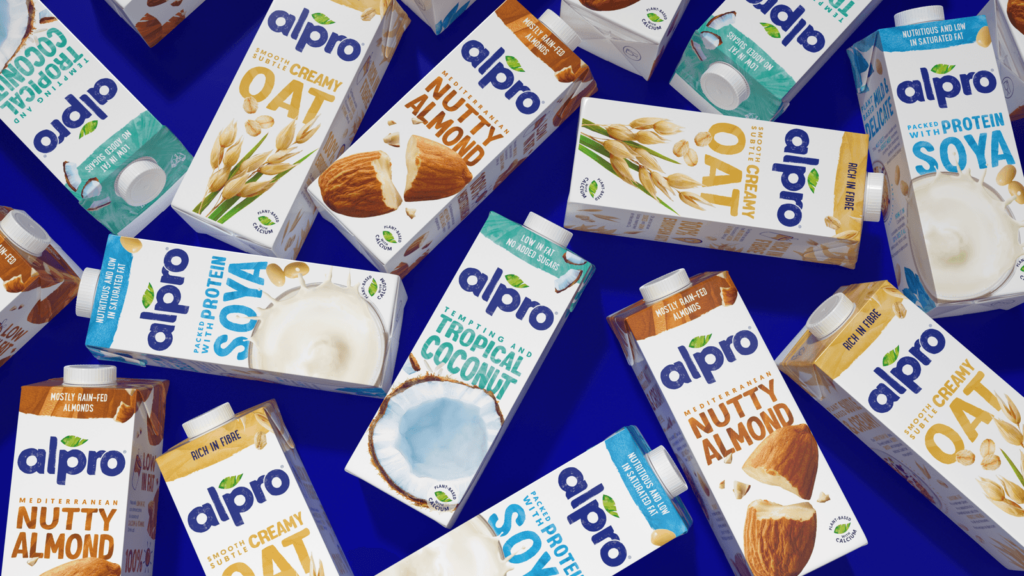
Speaking of industry giants, Danone-owned alt-dairy brand Alpro – which went through a brand refresh this year – has been one of the key factors behind the milk category’s decline, according to the Grocer. With volume falling by 22% (24.3 million fewer litres), it’s the biggest percentage loss in the top 30 milk brands. Its £13.7M loss is also the largest in the milk sector.
“Inflation and the cost of living have tempered recent growth rates,” acknowledged Danone’s head of category, Tom Kerr. “In many households, plant-based products are only consumed by one person. So, naturally, when people look to save money from their weekly shop, it is plant-based items that are left on [the] shelf.”
This has meant the withdrawal of certain products and brands in this space. Nestlé ended its Wunda pea milk line, while Innocent bid adieu to its three dairy alternatives – oat, coconut and almond – both due to poor sales. The one company that serves as an exception here is Oatly, which is a surprise given how rocky the last two years have been for the Swedish oat milk maker.
The UK’s second-largest alt-milk brand, Oatly saw a modest volume growth of 0.3%, while higher prices – its average price per litre is 6.9% higher than Alpro – mean its value is up by 9.8%, becoming one of the only two businesses in the top 10 (alongside Müller) to expand in volume. This is credited to the company’s new recipe for its Light, Semi and Whole Oat Drinks, as well as the launch of a No Sugars oat milk.
And despite the fluctuating fortunes, Alpro and Oatly only trail dairy giant Cravendale in total value across the UK milk market, ahead of companies like Freshways, Müller, Lactofree and Arla – signalling that consumer demand for dairy-free still persists.
“The cost-of-living crisis continues to impact UK consumers and our data shows that this has had an effect on how they shop for groceries and what they choose to put in their baskets,” said Rachel White, UK and Ireland managing director at NielsenIQ. There has been a real emphasis, despite inflation, on stripping it back to traditional items, such as fresh meat and dairy products and a move away from trying more expensive meal solutions, which have shifted the dial in terms of the meat-free category. Whether this will have an impact in January when many like to experiment with Veganuary, remains to be seen.”
The post Cost of Living: UK Meat-Free Sales Plunge While Inflation Masks Dairy Decline appeared first on Green Queen.
This post was originally published on Green Queen.
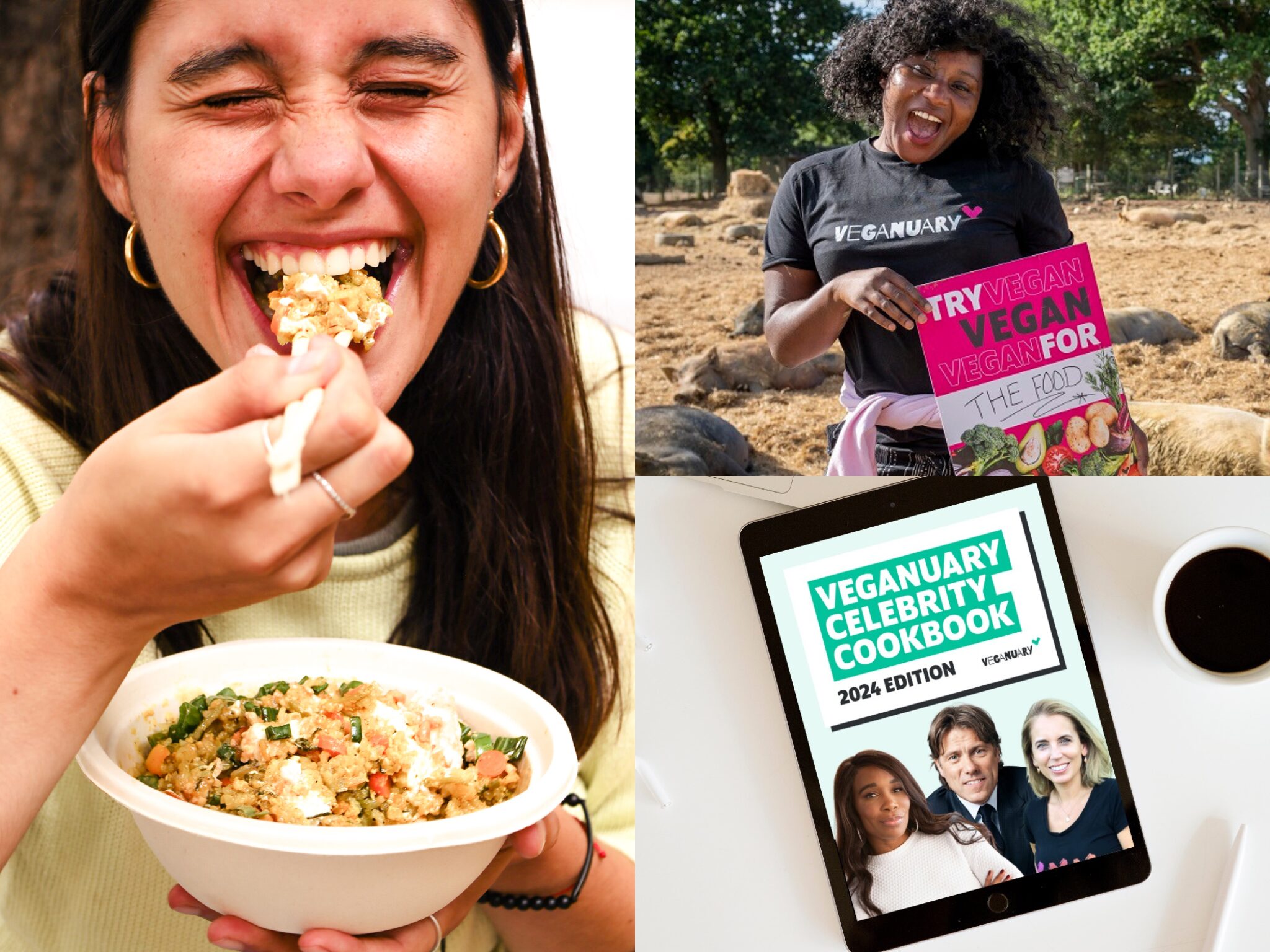
It is almost four years since I’ve been vegan – and it’s all thanks to Veganuary.
I took up the challenge in 2020, following my already-vegan best friend. I had no intention of continuing past January, and midway through, my nightly dreams as well as daytime wondering comprised visceral visuals of cheese and milk chocolate, and a determination to buy a ton of both come February 1.
But another week in, those cravings subsided, and I began to see what makes Veganuary tick: what started out as forcing a habit became a force of habit itself. Giving up dairy cold-turkey was hard at first, but it took three weeks for that to phase out.
And I’m just one of many, many people who have used Veganuary since its inception in 2014 to kickstart their transition to a plant-based diet. Granted, it was easier considering I was vegetarian and not a meat-eater, and the fact that I was in London, one of the vegan capitals of the world.
But that was 2020, and there is a higher number of plant-based products on supermarket shelves, dishes on restaurant menus, and resources to help you out than ever before. And whether you’re more attracted to the health aspect, the animal welfare bit, or climate credentials, it’s genuinely never been easier to go vegan. Here are our top resources to help you through Veganuary 2024.
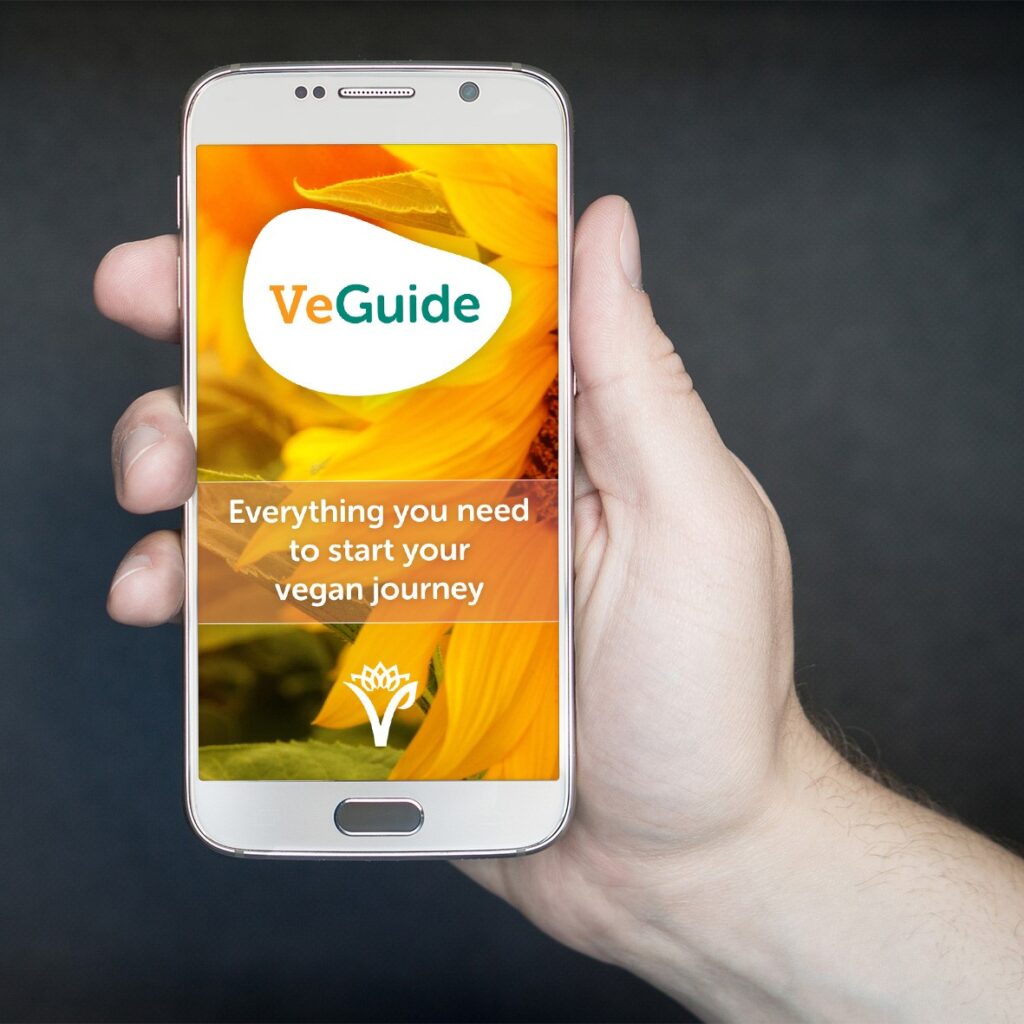
Launched in 2018, The Vegan Society’s VeGuide app is filled with recipes, motivation and advice to help you go vegan. If you think you’ll struggle to give up cheese, find vegan products, or grapple with whether this diet works for you, the charity says VeGuide can help you through all of that.
Over 30 days, the free-to-download app covers the basics with short daily videos, presented by influencers Mic the Vegan, Rae Likes Froot and Jay Brave. These “personal vegan guides” explore the most common stumbling blocks to going vegan, and provide tools to overcome them.

For many people, dating a fellow vegan can be much easier. While traditional dating apps like Bumble and Tinder can help you a little here, there’s no filter for dietary preferences (and it’s not necessary for people to display what diet they choose to follow). So platforms like Veggly, Vegpal and Grazer really help. These are exclusively vegan and vegetarian dating apps, which help you bypass that first step of having to find someone with like-minded eating habits (if you’re of that persuasion).
Grazer and Vegpal also have a friend-finding feature like Bumble, which is great if you’re looking to meet other vegans. You can help each other through your journeys, and discuss challenges as well as wins with somebody who can relate better. Similarly, Vegazone is a community-based social media platform for vegans and those looking to adopt a plant-based lifestyle.

It’s not just your phone that will help you find other vegans – there are myriad in-person events and communities you can join to do so. Veganuary itself has an extensive list of communities in the UK, with Facebook or Meetup.com links to help you get started.
Additionally, the campaign recommends volunteering in animal sanctuaries or for environmental charities, alongside joining other activist groups and attending vegan events and markets. These meetups can be super helpful in finding people who can act as a support system, as well as make the transition more fun. For example, London Vegan Meetup, which has over 10,000 members and is one of the largest vegan groups in the world, is hosting board game nights as well as tennis/walking sessions during Veganuary.
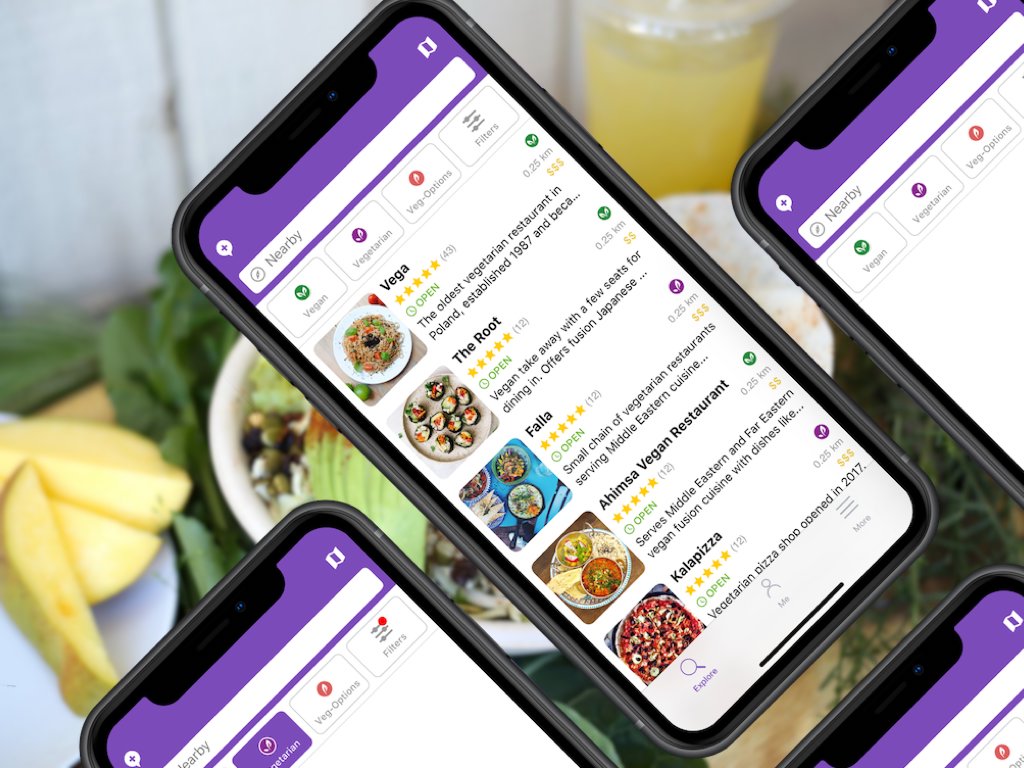
Two apps that have stood the test of time when it comes to veganism are HappyCow and abillion. The former, launched in 1999, is a treasure trove of vegan-friendly eateries in cities all over the world. With over 1.1 million members, the site lists more than 220,000 restaurants in 185 countries that cater to vegans – whether it’s a single dish on the menu or the whole place – with word-of-mouth-based user reviews and photographs. For many people, HappyCow serves as the sole food guide for their travels.
Similarly, abillion is a review and rating platform with over a million app downloads. It allows users to review plant-based and cruelty-free products, as well as recommend vegan-friendly restaurants, in 183 countries. Plus, the app donates between 10 cents to $1 for each review written – the user writing it is credited with the money, which they can choose to donate to one of over 70 charities. So far, Abillion claims to have donated over $2.8M so far.
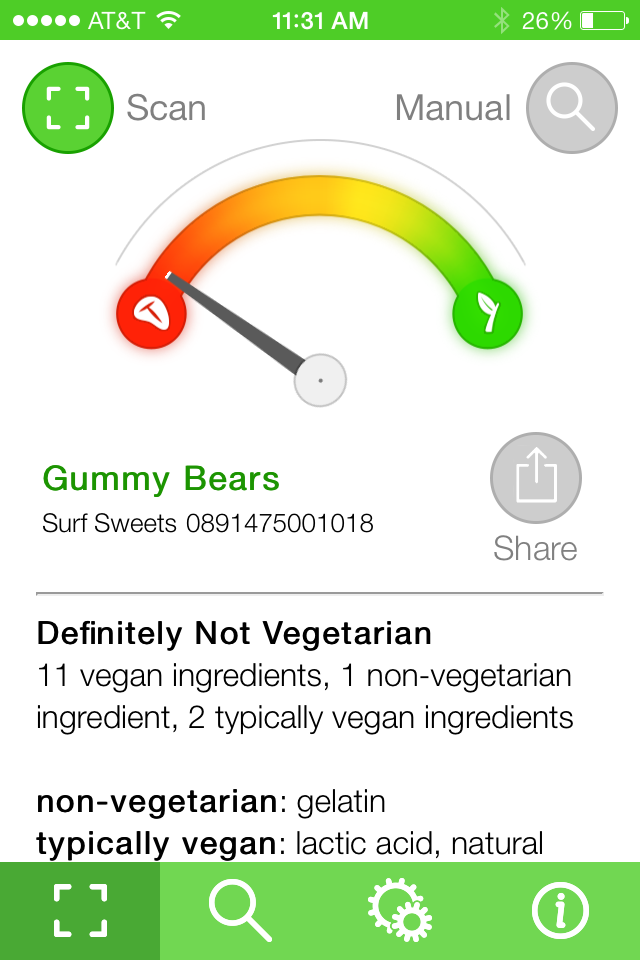
During their initial vegan phase, most people find themselves checking product labels much more often – many products that should be vegan can sometimes have ingredients like milk powder or honey (which isn’t listed as an allergen), making it hard to discern what is plant-based, and doubling grocery times.
But there are resources that can help you out here. Apps like Is It Vegan?, VeganScan, Cruelty Cutter and Bunny Free have massive directories of food and beauty products. All you need to do is scan the barcode or product label, and it will come up with a detailed list of ingredients or background information to tell you if the product is vegan and/or cruelty-free.
As a bonus, cult-favourite Instagram account Accidentally Vegan finds UK products that aren’t marketed as vegan, but just happen to be plant-based – for example, Oreos or the dark chocolate Grand Ferrero Rocher. This can apply to the same item in other countries too, but it’s always good to check. The account has now expanded to include new vegan launches too – which is particularly important during the product innovation dump that is Veganuary.
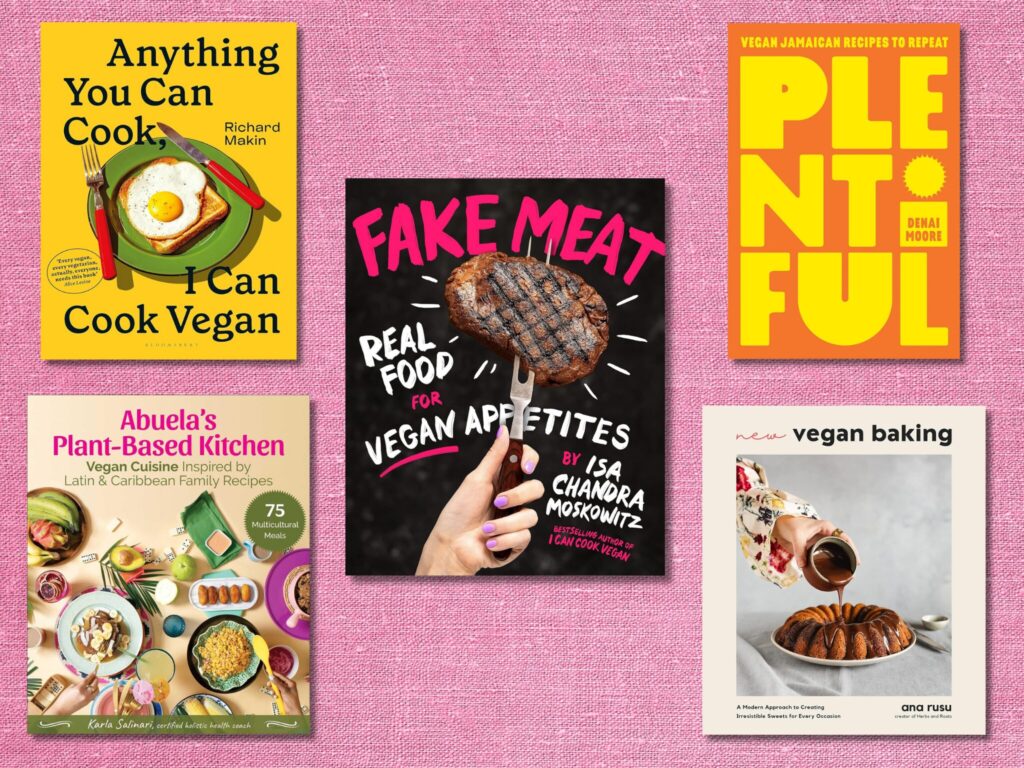
One thing you’ll notice when trying out veganism is that you’ll be cooking significantly more, even if you already spend a lot of time cooking. It really does bring out a new creative side in you, pushing you to experiment more in search of new flavours and textures.
There are countless vegan recipe blogs and cookbooks to try out, of course. Resources like America’s Test Kitchen (which also has two all-timer plant-based cookbooks), Serious Eats and Food52 have wonderful vegan recipes that stand out on their own, or serve as equally delicious replacements for meat and dairy.
But these can be a little involved. If you’re looking for easy vegan recipes without any flavour compromise, look to blogs like Gaz Oakley’s Avant Garde Vegan, Pick Up Limes, Rainbow Plant Life (all three have excellent YouTube channels too) and Minimalist Baker (which isn’t fully vegan anymore, but still has mostly plant-forward recipes). And in terms of cookbooks, we highly recommend America’s Test Kitchen, BOSH!, and the works of Isa Chandra Moskowitz and Miyoko Schinner. If you’re looking, we have a list of the best new vegan cookbooks released this year.
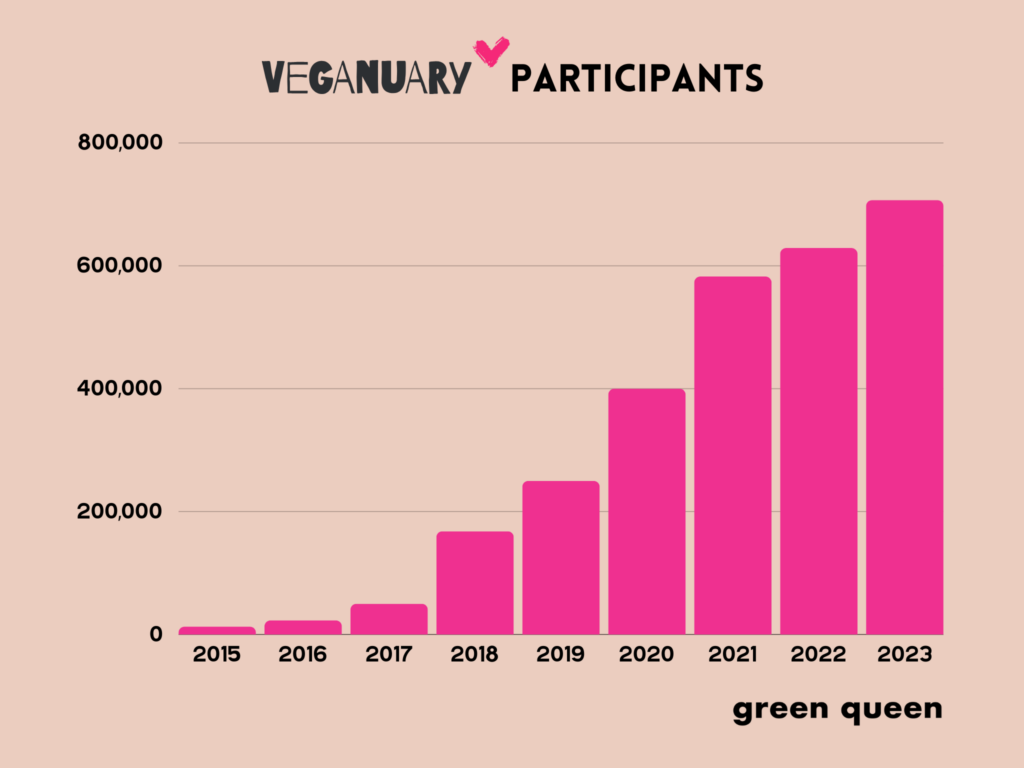
Veganuary has its own list of support materials that are available to you after signing up. These differ from country to country – the campaign has offices in eight nations – but range from starter kits and nutritional advice to daily coaching emails and a digital celebrity cookbook.
You can cook recipes provided by actors Evanna Lynch, Joanna Lumley, Mayim Bialik and John Bishop, athletes like Serena Williams and Chris Smalling, and more. Plus, the campaign has an expansive list of recipes and eating guides to help you through January, alongside a podcast, documentary and other suggestions like workplace challenges and corporate collaborations.
These are just a few of the tons of resources out there to help you have a successful Veganuary 2024. But the most important thing is to remember to be kind to yourself: veganism isn’t about absolutes and ‘failing’ shouldn’t be a concept here – try your best and back yourself.
The post Veganuary 2024: How to Go Vegan, and Stick to It appeared first on Green Queen.
This post was originally published on Green Queen.
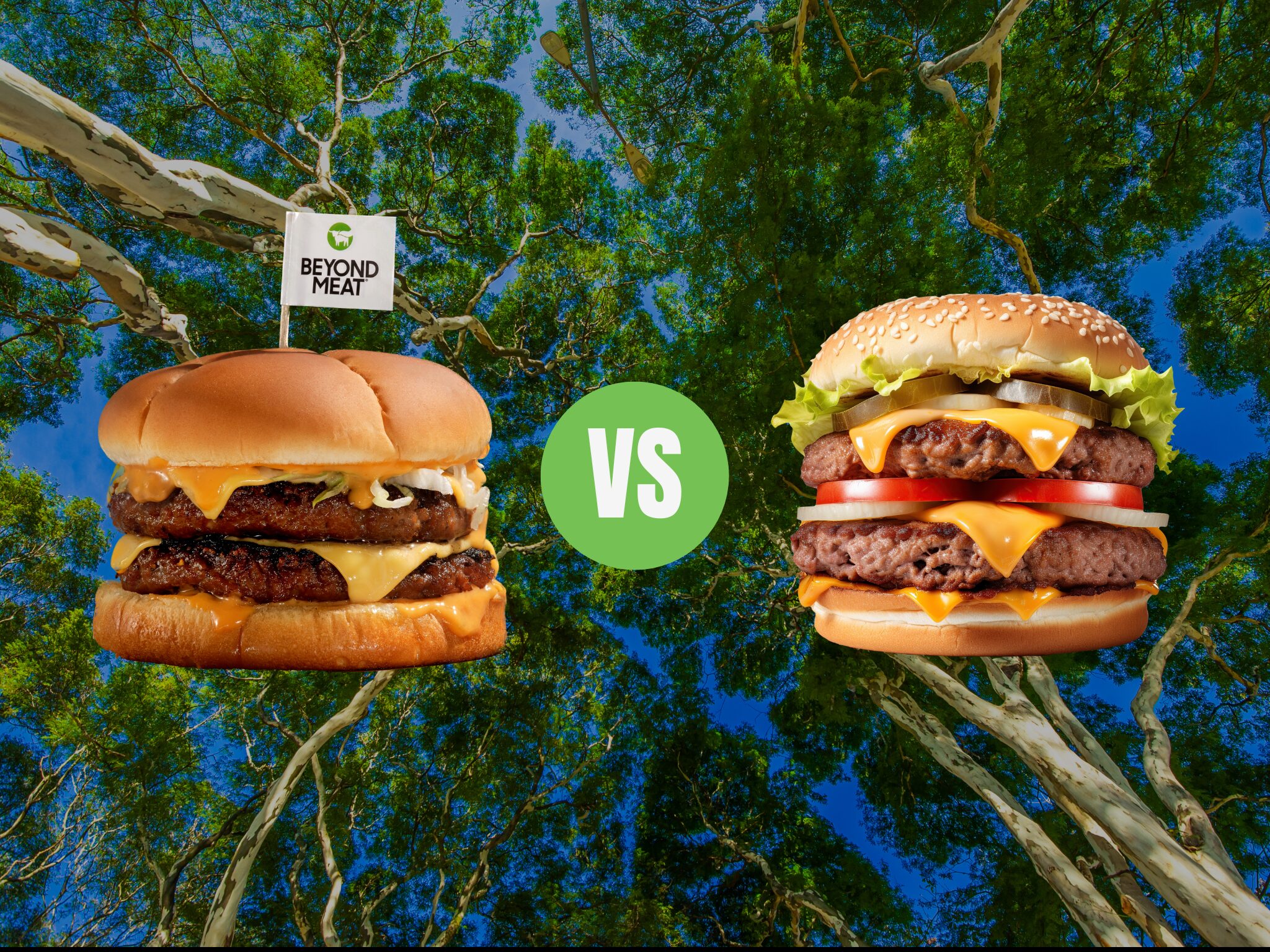
In 2018, Beyond Meat commissioned the University of Michigan’s Centre for Sustainable Systems to carry out a life-cycle assessment (LCA) of its original Beyond Burger (launched in 2015), which found that the plant-based product produces 90% fewer greenhouse gas emissions, requires 46% less energy, has over 99% less impact on water scarcity, and 93% less impact on land use, compared to beef.
The Beyond Burger has gone through two more iterations since then, culminating in version 3.0, which was released in 2021. Now, it has released a second LCA – conducted by Dutch research firm Blonk Consultants and compliant with ISO standards – comparing this product to a conventional beef patty. Here’s what it found.
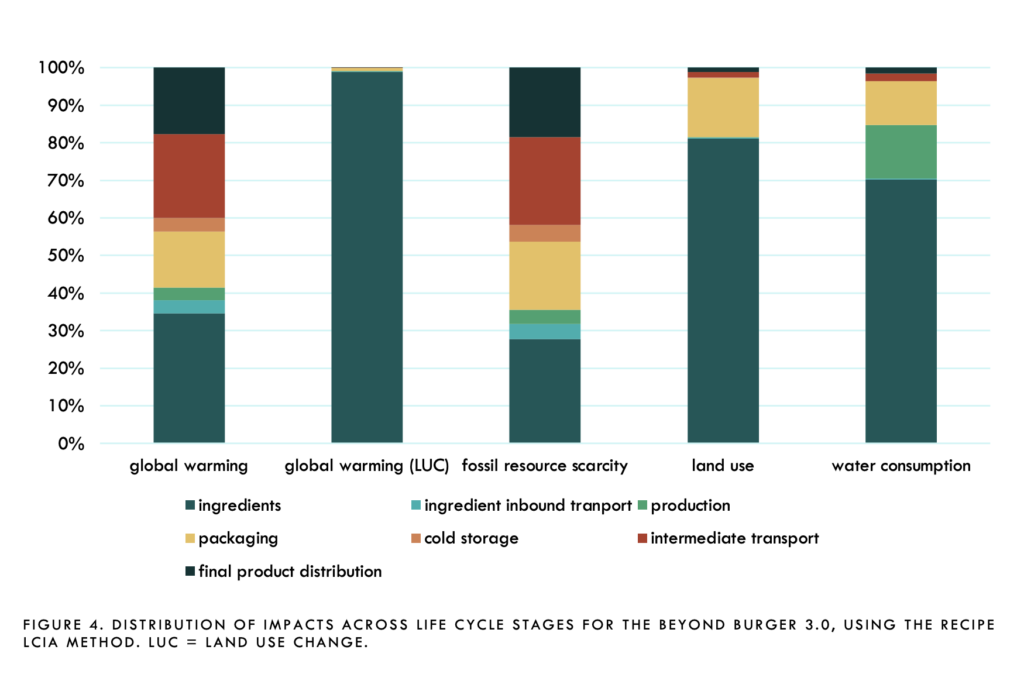
Based on data from 2022, the new Beyond Meat LCA focused on global warming impact, land use, water consumption, and non-renewable fossil resource scarcity. Calculating the effect of different production components, it found that refrigerated transport – including both intermediary components and final distribution – is the biggest contributor to the burger’s GHG emissions (40%) and fossil resource use (42%).
Ingredient production is the other prominent factor, responsible for 35% of emissions and 25% of non-renewable energy use. This dominates the rest of the metrics too, responsible for 81% of land use, almost all of the global warming impact if incorporating land use change, and 70% of water consumption.
Within these ingredients, it’s the pea protein (which makes up 16% of the Beyond Burger patty) that has the highest impact, contributing to 11% of GHG emissions, 9% of fossil resource use, and 43% of land use. Its impact on water consumption, however, is much lower at 7% – here, a natural flavour proxy leads the way with 20%, followed by rice protein (18%).
The third major component of Beyond Burger’s climate impact is packaging, which accounts for 14% of its global warming impact, 17% of fossil resource scarcity, 16% of land use, and 12% of water consumption.
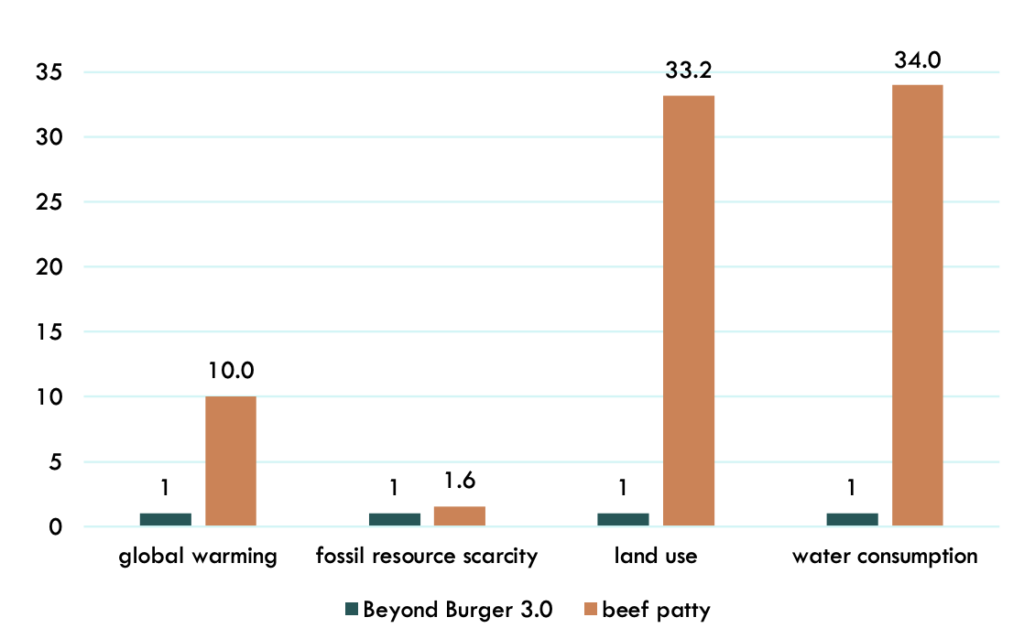
When compared to a standard 80/20 quarter-pound beef patty produced in the US, the LCA found that Beyond Meat’s burger generates 90% fewer GHG emissions, requires 37% non-renewable energy, uses 97% less land, and consumes 97% less water. If incorporating land use change, even with the ingredient production being the main driver for the plant-based patty, the Beyond Burger has 89% less global warming impact. These results are comparable to the 2018 LCA of the first Beyond Meat burger.
While LCAs are focused on the environmental impact of products, Beyond Meat’s document also highlighted the nutritional aspects of its burger versus conventional beef, revealing how both contain an equal amount of protein (20g per 4oz patty), but the plant-based meat has more iron, less saturated and total fat, fewer calories, and, of course, zero cholesterol. It brings to mind the company’s recent focus on health, with its latest ad campaign highlighting the heart-healthy certification received by its Beyond Steak analogue.
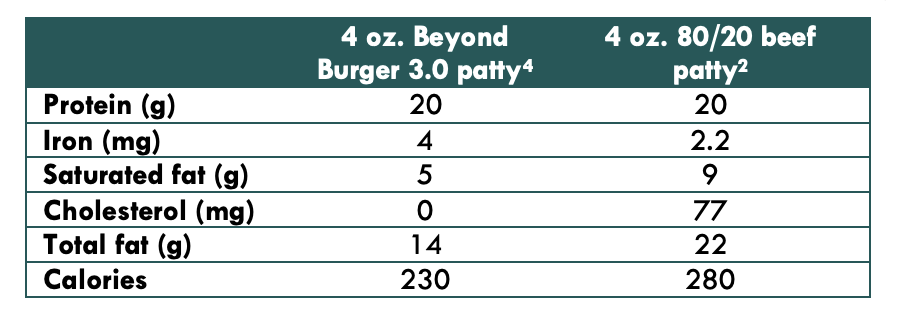
The positive results are welcome after a rocky year for the alt-meat giant, which has seen year-on-year sales fall (by 8.3% as of Q3) and revenue forecast being cut multiple times. Despite arresting a revenue slide with a small bump in Q2, it dropped again in Q3. It led to the company announcing job cuts affecting 8% of its staff (about 65 employees), which follows the layoffs of over 200 employees last year. All this reflected a wider decline in the plant-based meat industry, where investors have lost faith and sales have suffered.
Alongside the LCA, Beyond Meat published its 2022 environmental, social and corporate governance (ESG) report as well, outlining its approach to ESG; product quality, safety, innovation, health and packaging; environmental impact; supply chain responsibility; and people, culture and governance.
In a letter kicking off the report, Beyond Meat founder and CEO Ethan Brown iterated the importance of the producer’s climate impact, calling it “a reason for being” instead of a secondary factor. He laid out a two-part strategy for mitigating climate change: “One, focus on bringing down methane quickly by transitioning away from animal-based to plant-based meats as part of a shift to plant-based diets. Two, sequester carbon on lands freed up by the transition to plant-based meats and a plant-based food system.”

He added: “Do this now, while working on everything else – energy, transport, steel, cement, and other sources of greenhouse gases. Note that the decision is not all-or-nothing – with each reduction in livestock emissions and each conversion of acreage to sequestration, we can make progress.”
And in words that could apply as much to Beyond Meat’s financial predicament as they do to the climate crisis, Brown said: “It is understandable to feel overwhelmed in face of the magnitude of this global challenge. However, defeat is not inevitable and there is much we can do today.”
The post Beyond Meat’s New LCA Reveals the Climate Benefits of Its Burger Over Beef appeared first on Green Queen.
This post was originally published on Green Queen.
Parents, beware: What you put in your kids’ cereal—or on their plate—could be a matter of life and death. A new study has identified cow’s milk as the leading culprit of food-related fatal allergic reactions in children under 16 in the U.K.
This finding comes from a study published in the British Medical Journal, which examined hospital admissions for food-induced anaphylaxis—a life-threatening allergic reaction—from 1998 to 2018. Over two decades, deaths from peanut or tree nut allergies decreased while fatalities linked to cow’s milk increased, accounting for 26% of food anaphylaxis-related deaths.
Even less severe allergies to cow-based milk and cheese can cause serious, sometimes long-term health issues for children. Cow’s milk is among the most common allergens for children and can lead to gastrointestinal, skin, and respiratory problems. According to a study published by a leading journal in children’s healthcare, a startling 47% of children allergic to cow’s milk have had at least one emergency room visit due to exposure.
Childhood food allergies are among the many other reasons to steer clear of dairy milk and cheese, which have been linked to an increased risk of developing prostate cancer, ovarian cancer, and heart disease.
The dairy industry tears calves away from their loving mothers when they’re just a day old—an extremely traumatic experience for these emotional, sensitive animals. Mother cows are often heard frantically crying out for their young for several days after they’ve been separated. Dairy farms exploit female cows like they’re merely milk machines, subjecting them to abusive, grueling milking regimens that often lead to painful udder infections.
Cows produce milk for the same reason that humans do—to nourish their young. They don’t want to endure a lifetime of exploitation in the dairy industry. The best thing you can do for our fellow animals, your health, and the planet is to go vegan. Check out PETA’s ultimate guide to vegan milks and order our free vegan starter kit to make the compassionate switch today:
The post Deadly Dairy? Cow’s Milk Now Leading Cause of Fatal Allergies in Children Under 16 appeared first on PETA.
This post was originally published on Animal Rights and Campaign News | PETA.
Another damning revelation has further underscored the rampant abuse of migrant children in the meat industry. Duvan Pérez, who was only 16 years old when he died on the job at a Mississippi slaughterhouse in July, was reportedly hired illegally using the identity of a man twice his age—a discovery that points to the apparent and egregious lack of oversight of these highly perilous occupations.
New reports reveal that the teenager used the identification of a 32-year-old man when he was hired to clean up at Mar-Jac Poultry in Hattiesburg, Mississippi, which supplies chicken to companies such as Chick-fil-A.
According to police documents obtained by NBC News, the Hattiesburg Police Department received at least nine reports in the past three years from American citizens claiming that their identities had been stolen and were being used by Mar-Jac workers. Some individuals reportedly directed complaints to the company, which apparently failed to take action.
It’s illegal for minors to work in slaughterhouses, which are among the world’s most dangerous workplaces. Pérez’s death was reportedly the third fatal incident at the Mississippi facility in less than three years and the latest incident in Mar-Jac Poultry’s reported history of using child labor.
In October 2021, a couple was convicted for illegally supplying undocumented workers, including several minors, to a slaughterhouse owned by Mar-Jac Poultry in Jasper, Alabama.
The exploitation of migrant children in the meat industry is an ongoing crisis across the U.S. In February, a federal investigation blew the lid off the illegal employment of more than 100 children—some as young as 13—in hazardous occupations at 13 slaughterhouses in the U.S. NBC News has released a documentary titled “Slaughterhouse Children,” which details its yearlong investigation into child labor in the U.S.
Slaughterhouses are hell on Earth for animals and workers. These facilities run slaughter lines at breakneck speeds that often lead to errors by workers. Many birds are still conscious when their throats are slit or when they’re dunked into the scalding-hot water of defeathering tanks. These standards also endanger workers, who must wield saws, knives, and other sharp tools above surfaces often coated with grease, blood, and offal.
No one wants to endure a terrifying, painful death at a slaughterhouse. You can help our fellow animals and vulnerable humans by going vegan today:
The post ‘Slaughterhouse Children’: Investigation Into Teen Worker’s Death at a Slaughterhouse Leads to Another Damning Revelation appeared first on PETA.
This post was originally published on Animal Rights and Campaign News | PETA.
If helping animals is your 2024 resolution, you may want to pick up a new cookbook to help you enlighten your taste buds and end the exploitation of animals used for food. There are a lot of cookbooks to look forward to, from those focused on simple time-saving recipes to ones with inspiring dishes that will help you get your creative juices flowing in the kitchen. Whatever you prefer, there’s a vegan cookbook for you in the new year.
By George Lee
George Lee, the creator of vegan recipe blog Chez Jorge, is launching a long-awaited cookbook this year featuring traditional Taiwanese recipes inspired by his childhood and family. A-Gong’s Table is dedicated to Lee’s grandfather and is an intimate story of life in Taiwan told through food and photographs.
By Shane Martin
Become an expert in baking everything from artisan challah loaves to sweet breakfast muffins with Shane Martin’s guide to baking with animal-friendly ingredients—because you don’t need eggs or cow’s milk in order to make delicious baked goods.
By Radhi Devlukia-Shetty
Nourishing your body is important for your health and satisfaction, and Radhi Devlukia-Shetty’s new cookbook is all about how to create flavorful meals that will help you feel your best. JoyFull features recipes like Veggie Frittata Muffins, Tandoori Tacos, and the Tahini Matcha Latte.
By Madeleine Olivia
Madeleine Olivia’s simple, no-fuss recipes are packed full of flavor while being budget-friendly and free of ingredients that harm animals. Make It Vegan walks you through recipes for Pain au Chocolat, 10-Minute Mac and Cheese, Vegan Paella, and other dishes.
By Carleigh Bodrug
We loved Carleigh Bodrug’s first bestselling cookbook, so we’re excited to see what’s in store for this one, which focuses on “scrappy” cooking—tips for limiting food waste by using every part of a fruit or vegetable. Learn what to do with radish tops, broccoli stems, wilting greens, and other scraps.
By Remy Morimoto Park
Remy Morimoto Park—aka “Veggiekins” on Instagram and TikTok—shares pan-Asian, gluten-free vegan recipes in Sesame, Soy, Spice. We can’t wait to try her takes on Spicy Peanut Ramen, Miso Caramel Crème Brulée, and Thai Basil Tempeh.
By Calum Harris
British Instagram content creator Calum Harris’ new cookbook is chock-full of delicious, animal-friendly recipes that are quick and easy to prepare. Recipes include hearty dishes like Miso Greens & Gnocchi, breakfast favorites like Fluffy Blueberry Pancakes, and others.
By Ashley Nsonwu
Learn how to make nutritious vegan food that babies and toddlers will love with this cookbook by Ashley Nsonwu. It includes shopping lists, nutrition guides, tips for raising compassionate vegan children, and more than 100 tasty family-friendly recipes.
By Marleen Visser
If you’re into the scratch-made kitchen trend, you’ll want to pick up Marleen Visser’s cookbook. It includes recipes for homemade vegan cheeses that don’t exploit cows, mayo made from aquafaba instead of eggs stolen from chickens, nut milks, and more.
By Toriano Gordon
Oakland, California, barbecue joint Vegan Mob is known for chef Toriano Gordon’s soul-food creations, and now he’s sharing his secrets to recreating these nostalgic flavors without harming animals. Try your hand at vegan brisket, La La Lumpia, and Mobby Fried Chicken—because cows, pigs, and chickens are individuals who deserve respect and don’t want to end up on your plate.
By Christine Wong
Christine Wong (@conscious_cooking) creates delicious and unique recipes inspired by Hong Kong’s cuisine, and she’s sharing some of these dishes in her cookbook The Vibrant Hong Kong Table. Sampan Congee, Snow Skin Mooncakes, and Curry “Fishballs” are a few examples of recipes featured in this book.
Looking for even more options? Check out this list of vegan cookbooks that came out in 2023.
And if you’re interested in learning more about how you can spare the lives of countless animals by going vegan, order a free vegan starter kit:
As an Amazon Associate, PETA earns from qualifying purchases. If you buy something after clicking the Amazon links on this page, a percentage of the qualifying purchase will be donated to PETA and help us protect more animals from exploitation.
The post Need Meal Inspo? Check Out One of These Vegan Cookbooks Launching in 2024 appeared first on PETA.
This post was originally published on Animal Rights and Campaign News | PETA.
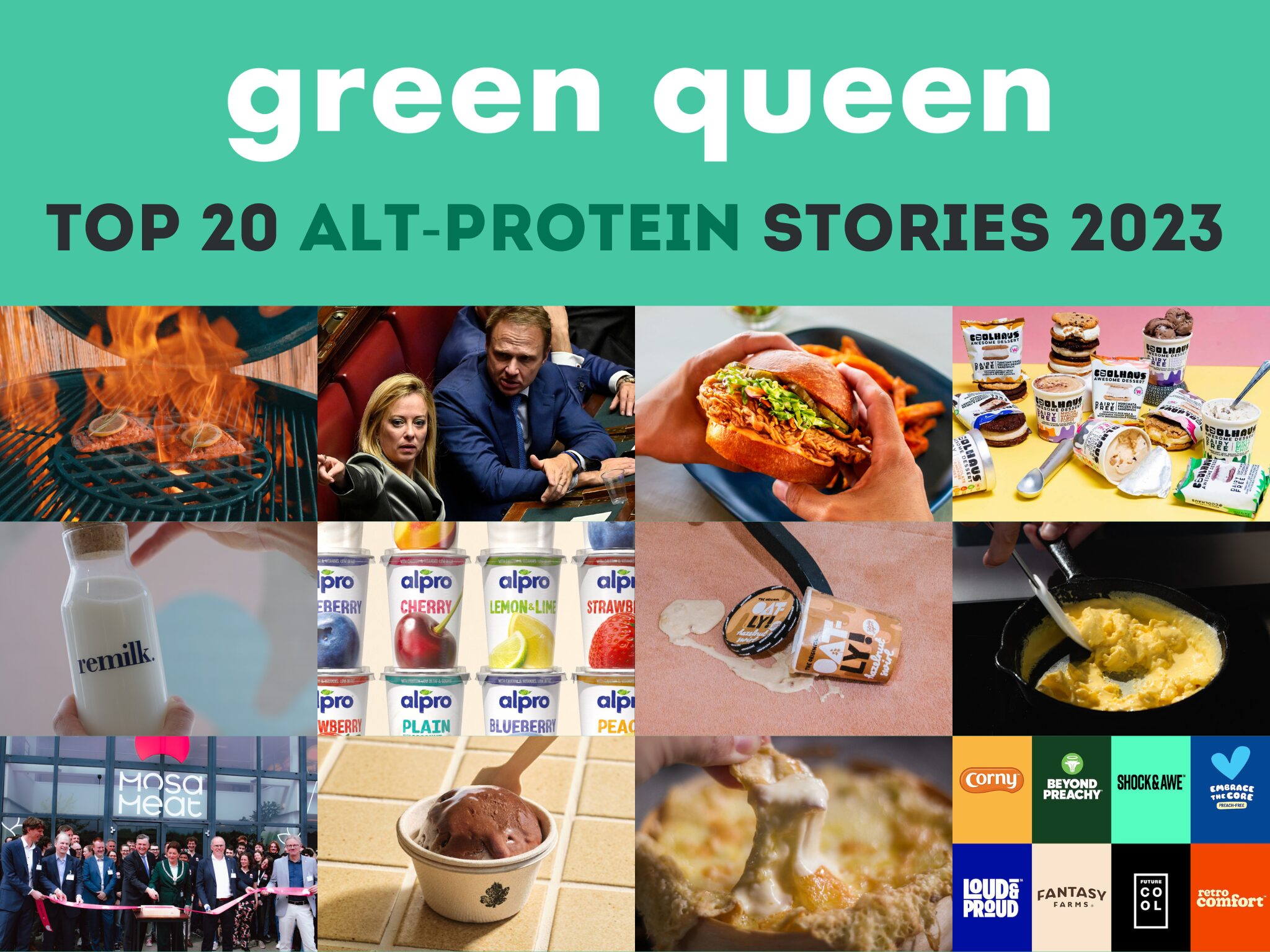
The biggest alternative protein story of the year was also one of our most read, with Californian duo Upside Foods and Eat Just becoming the first companies to earn USDA approval to sell cultured meat in the country.
We listed out 10 governments leading the way for cultured meat progression, in terms of funding and policy support, including the likes of Singapore, the US, Japan, the Netherlands and China.
After months of speculation, Italy made the local sale and production of cultivated meat illegal (against EU law), alongside a plant-based meat labelling ban.

In October, Denmark became the first country in the world to release a national action plan to facilitate the transition towards a plant-based food system.
Shortly after Denmark’s announcement, South Korea became the second nation to announce a national plan to boost local plant-based food production and promote alt-protein consumption.
Dutch cultured meat pioneer Mosa Meat opened the world’s largest facility (and its fourth) to make cultivated meat, sprawling over an area of 2,760 sq m.
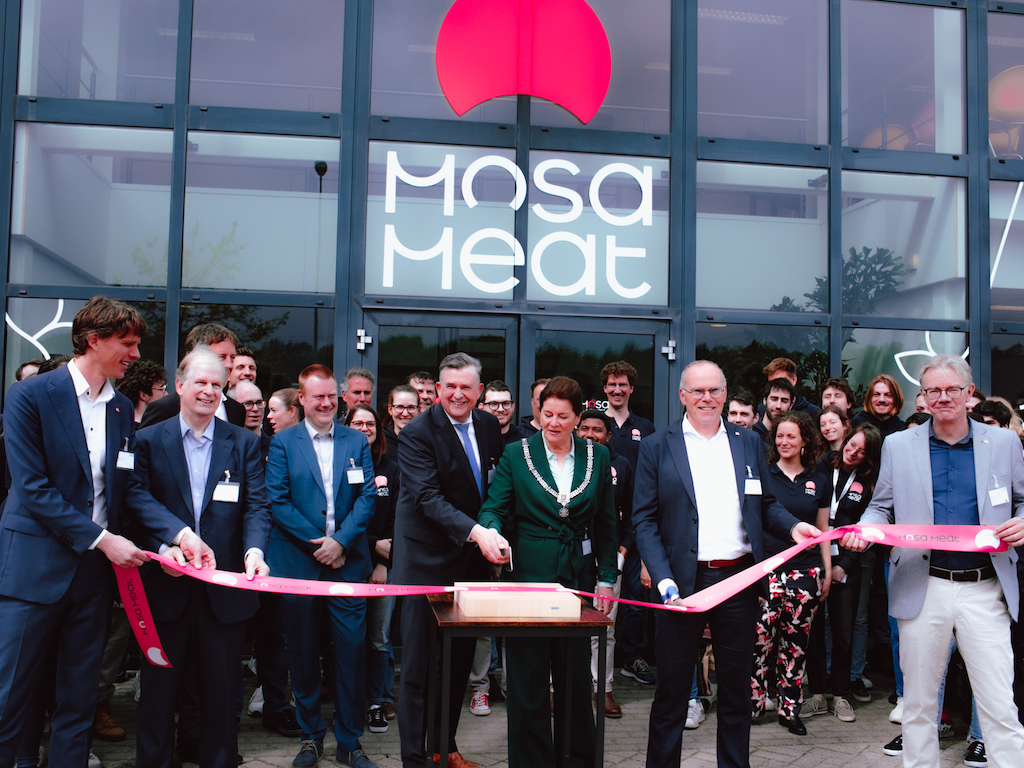
The world’s largest precision fermentation player, Perfect Day, agreed to sell its consumer-facing brand The Urgent Company (and subsidiaries including Coolhaus and Brave Robot) to newly formed food tech firm Superlatus. At the time of writing, the sale has not been confirmed by either company.
Speaking of, we explored the handful of life-cycle assessments conducted for precision fermentation dairy companies (yes, Perfect Day was on this list), alongside independent scientific research.
Israeli precision fermentation Remilk received the country’s first regulatory approval for precision-fermented dairy. It has also obtained clearance from Singapore’s regulator, and FDA and USDA GRAS approval stateside.
In an exclusive interview with Green Queen, German precision fermentation startup Formo revealed the details behind its soon-to-launch egg alternative, its regulatory compliance and research into consumer acceptance.

New York-based biotech company Pureture made waves with the announcement of a traditionally fermented vegan casein that could be supplied at a rate “20% and 30% lower than the existing dairy ingredients”.
In August, we deep-dived into what has been a tumultuous couple of years for the world’s largest oat milk company, Oatly, featuring leadership changes, ad bans, product recalls and withdrawals and a stock crash.
Danone’s global plant-based marketing director chatted with Green Queen about Alpro‘s brand refresh and the thinking behind the new packaging, as well as upgrading core recipes.
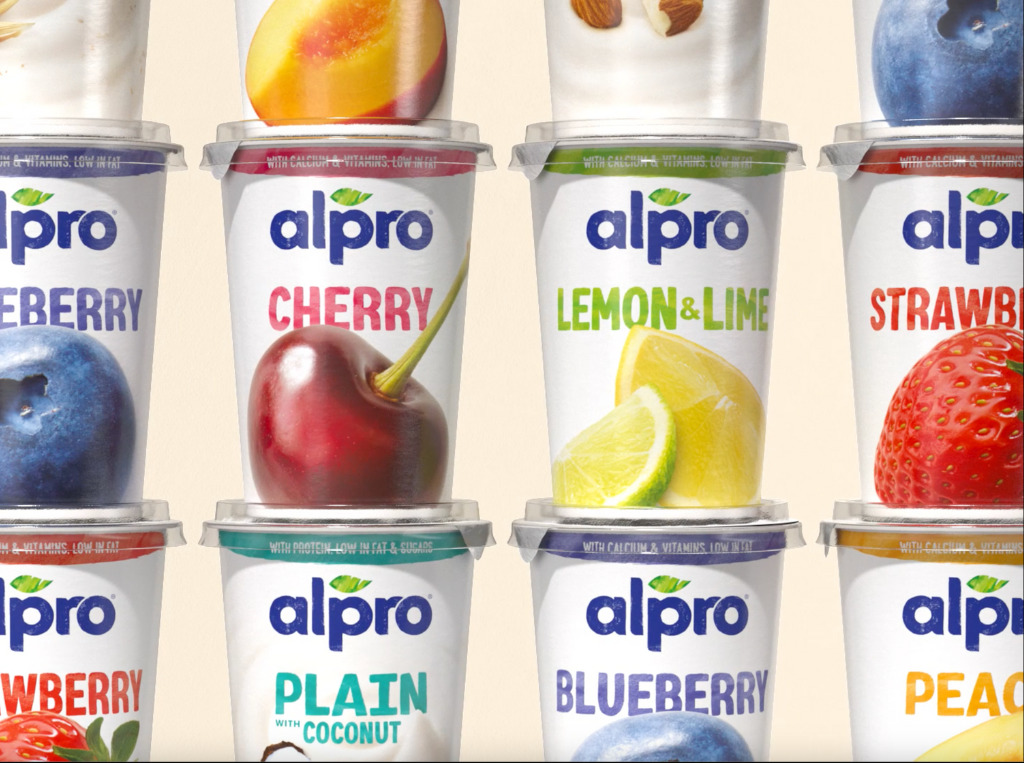
Zoran Svetličić, co-founder and senior brand strategist at design agency Shift, explored three emerging patterns in design aesthetics for alternative protein marketing and branding.
We outlined 10 of the most pressing obstacles facing the plant-based industry, touching upon marketing, pricing, product innovation and quality, sustainability messaging, and marketing.
A study revealed just how massive the influence of the animal agriculture lobby is across different fronts like public funding, labelling, marketing and policies, which is blocking the rise of alternative protein.

What does protein made from thin air taste like? We attended the world’s first tasting of Finnish startup Solar Foods‘ microbial-fermented protein Solein.
It was a big year for Solar Foods, with Solein appearing on the menu of Singapore eatery Fico, as part of a vegan gelato made from captured carbon.
Also in Singapore, oat milk company Oatside entered the frozen category with three ice cream flavours, along with a public sampling event to promote the launch.

In Austria, Revo Foods launched its whole-cut salmon filet Vienna-based vegan supermarket Billa Pflanzilla, marking the 3D-printed meat’s European retail debut.
The post 2023 Review: Green Queen’s Top 20 Alt-Protein Stories of the Year appeared first on Green Queen.
This post was originally published on Green Queen.
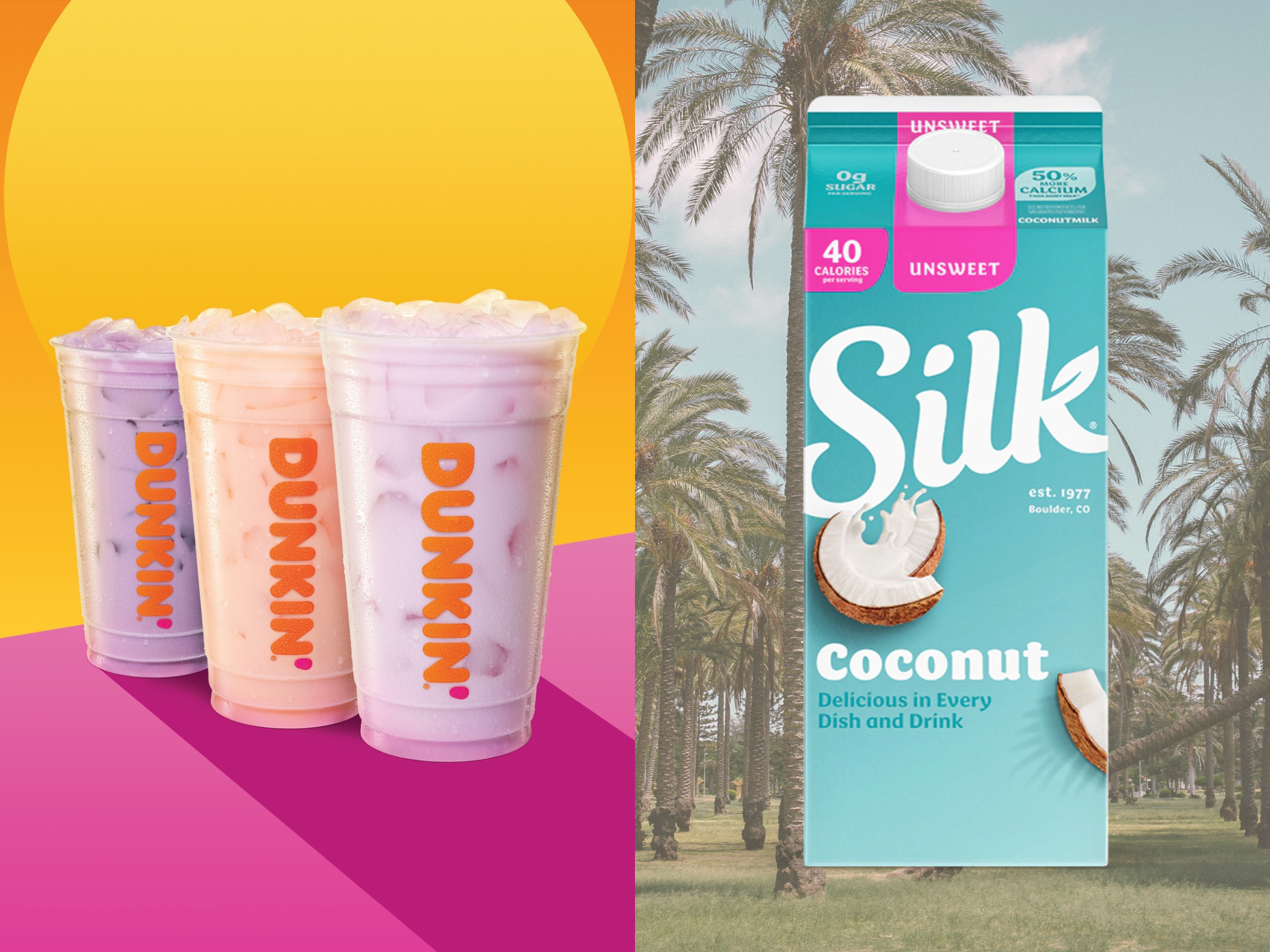
Dunkin’, one of the largest food chains in the world, will soon eliminate coconut milk as a dairy-free option for consumers across its US menu, less than three years after first adding Silk’s Unsweet Coconutmilk as an offering.
The move means Dunkin’s popular Coconut Refreshers range – which mixed coconut milk with fruity iced teas – will exit the menu. The chain will continue to offer oat and almond milk, the latter of which was the first plant-based milk on Dunkin’ menus and will celebrate 10 years since its introduction in 2024.
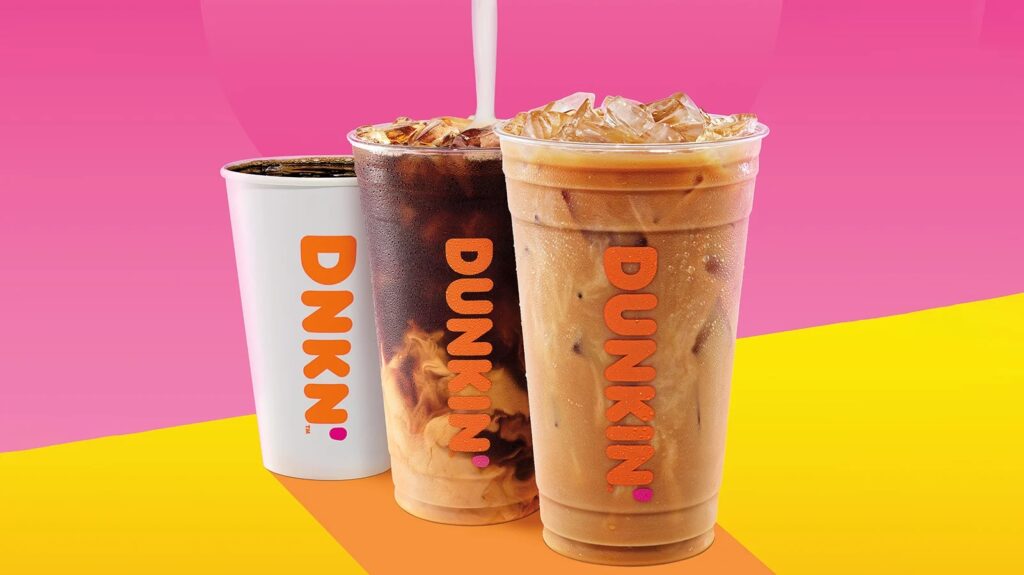
Dunkin’, which has around 13,000 locations internationally, hasn’t specified a reason for cutting coconut milk off its menu but confirmed that people will still be able to order Refreshers with a green tea base.
“Although Dunkin’ is indeed bidding farewell to coconut milk at locations nationwide in 2023, new and exciting beverage innovations are on the horizon in 2024 to provide guests with a growing variety of both coffee and non-coffee drinks to enjoy. Guests will still be able to enjoy all of their favourite Dunkin’ drinks with non-dairy substitutes, including almond milk and oat milk,” the company said.
Usually, when food businesses take permanent items off the menu, it has to do with increased costs, a lack of sales, and/or supply chain issues. Menu data from insights from Technomic’s Ignite platform reveals that the presence of coconut (and soy) milk has been declining from foodservice menus lately, with the former dropping by 0.1% and the latter by 9%. Coconut milk is now present in 10.8% of US restaurants.
In contrast, almond (which has always been the most popular dairy alternative among Americans) and oat milk have been appearing more and more on menus, growing by 6% and 16%, respectively. That said, coconut milk is still the popular alt-milk in restaurants (particularly for cooking purposes), with soy milk only available in 2.2% of eateries, almond milk in 2.1%, and oat milk in just 1%.
Speaking to CNN, Technomic’s consumer and industry insights director, Robert Byrne, said coconut milk is “the most expensive non-dairy milk” for restaurants (almond being the cheapest), which “plays a significant role” in decisions like the one Dunkin’ has made.
Additionally, coconut milk wasn’t very popular with Dunkin’ customers, with only 1% having tried the dairy alternative – that number rises to 5-7% for almond milk and 3% for oat. (Dunkin’ doesn’t offer soy milk.) “It can be difficult to justify carrying multiple nondairy milks when guest demand is less robust,” Byrne said.
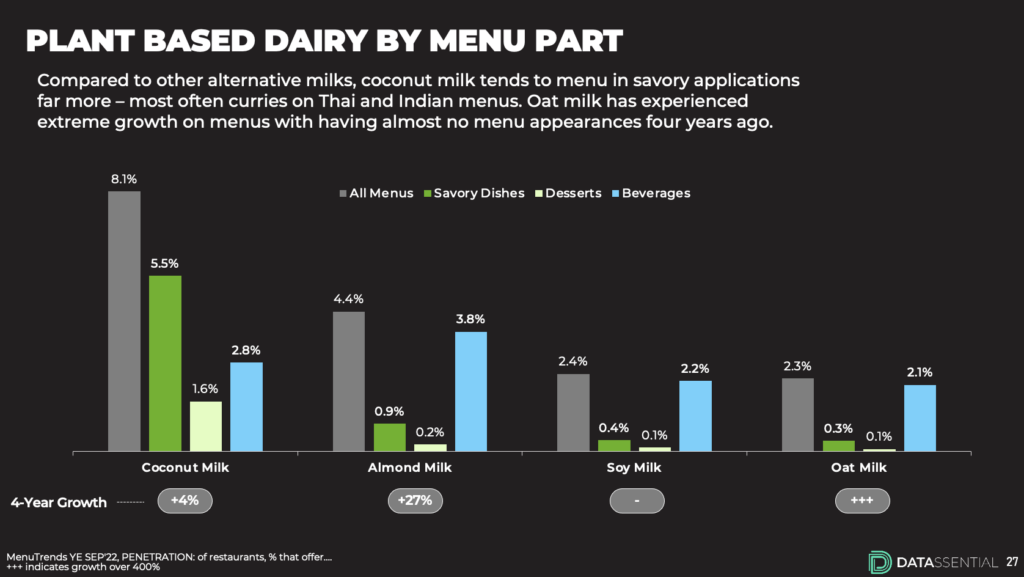
Do consumers really not like coconut milk? It’s a tricky question to answer based on the data available (which is virtually non-existent for foodservice). According to the Plant Based Foods Association, coconut milk reigns supreme when it comes to menu appearances in restaurants, penetrating 8.1% of total locations (almond is present in 4.4%, and oat in 2.3%), as of September 22. This is largely driven by its use in savoury dishes though, as the product is a staple in many South and Southeast Asian cuisines. In terms of beverage use, almond (3.8%) trumps coconut (2.8%).
On the other hand, the results of a 1,328-person survey by Morning Consult published earlier this year reveals that consumer-preference-wise, coconut ranks well below almond and oat (it’s also overtaken by soy for millennials), ahead of cashew, hazelnut and rice milks, which are still on the fringe of the alt-dairy world.
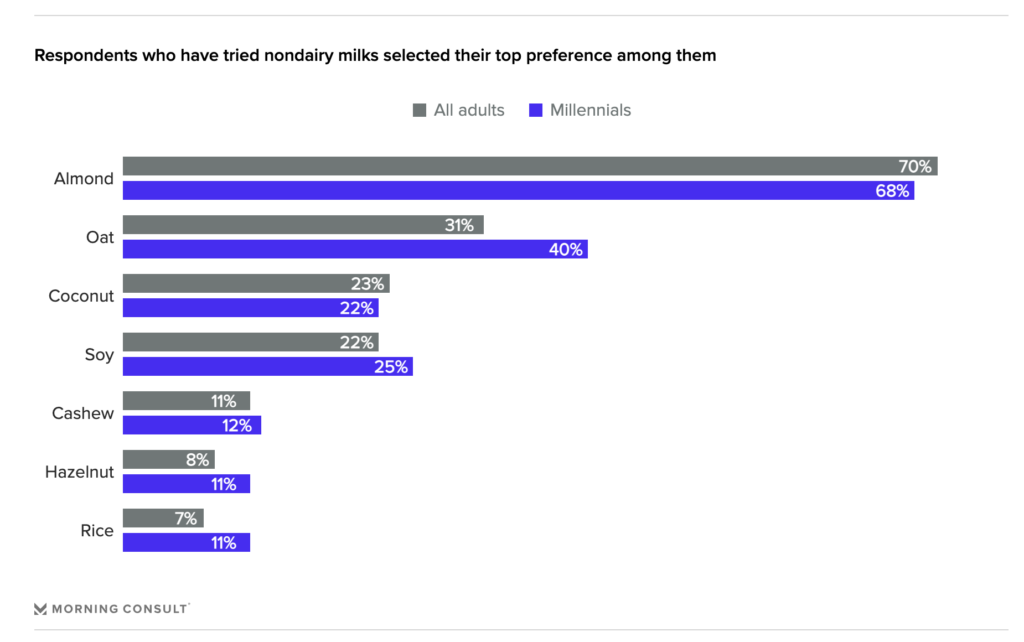
There are mixed results if you look at retail too. A review of Nielsen data by Purdue University found that coconut milk’s dairy alternative market share has reduced from 11.5% to 10.6% from 2018-22 (in that time, oat milk has skyrocketed from 0.7% to 21%).
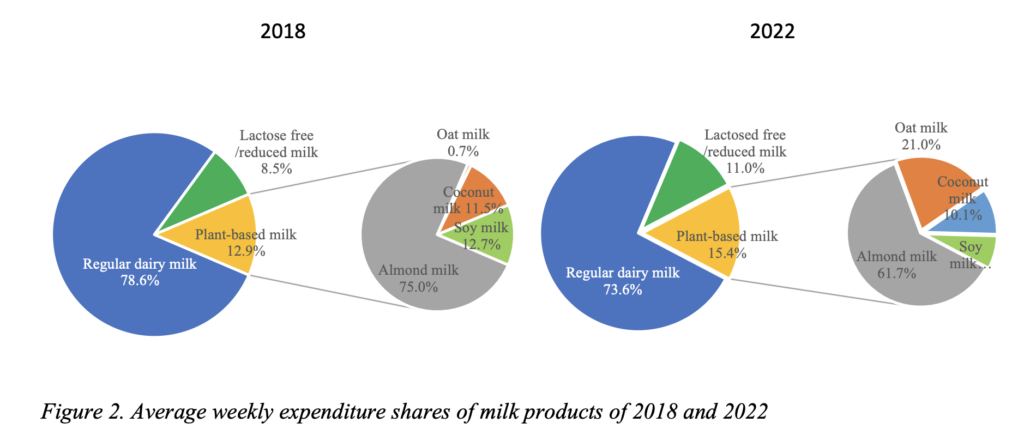
The data chimes with Byrne’s comments as well, calling coconut milk the most expensive alt-milk a $0.094 per ounce, versus $0.05 and $0.052 per ounce for almond and soy, respectively. Coconut milk has seen the largest price hike among both conventional and plant-based milks in the last five years, with average weekly rates up by 33.4% (dairy follows this closely at 33.1%). In comparison, almond is up 7.2%, while oat milk prices have actually fallen by 18.2% thanks to growing demand.
However, if you look at more recent data, shelf-stable coconut milk was the only non-dairy option that saw unit sales rise (by 28.9%) over the 12-week period ending July 16, according to SPINS US retail data shared with AFN. Plus, coconut outgrew all other plant-based milks in year-on-year dollar sales ending on the same date, expanding by 36.5%, compared to 17.7% for oat and only 1.6% for almond. Again, though, its total sales are still the lowest among almond, oat and soy, reaching $146.5M annually, versus $1.56B for almond, $660.5M for oat, and $202.7M for soy.
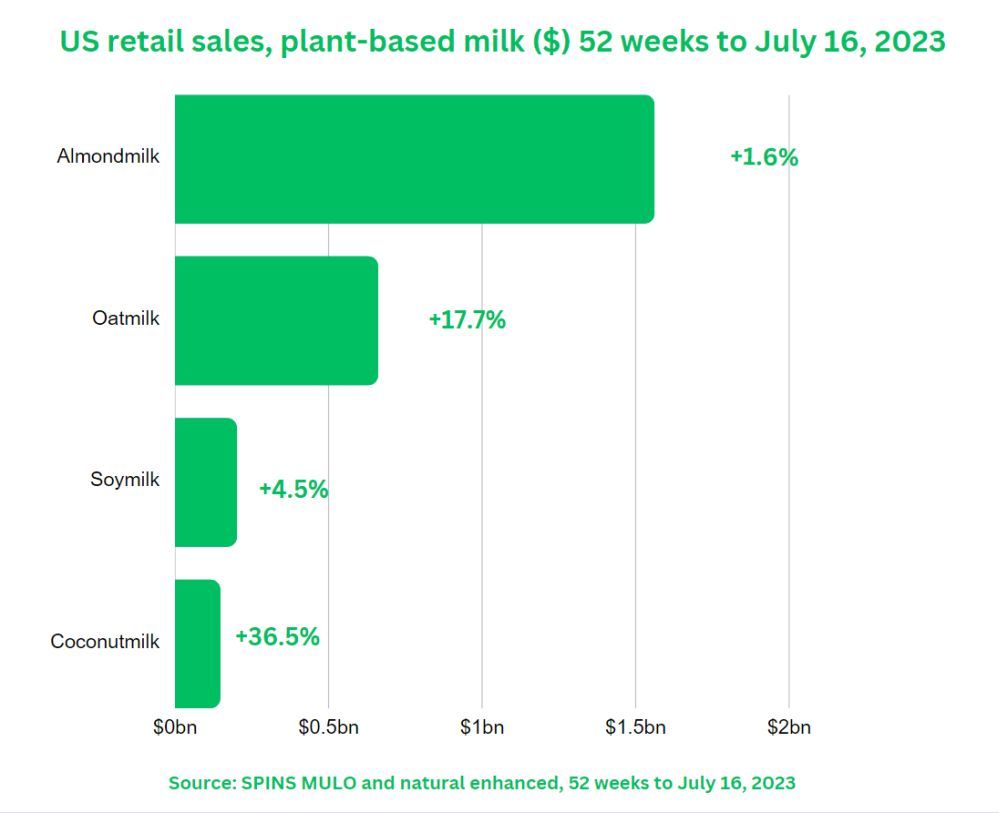
Yes, there are a lot of numbers here, but what actually drives consumer preferences? Studies have shown time and again that taste is paramount. Coconut milk isn’t for everyone, and its strong flavour means it needs to be used carefully in beverage development. Add it to your espresso and you’re tasting more coconut than the actual coffee, for example. Many are looking for alternatives closer to what they’re used to drinking all their lives, and coconut is the dairy alternative furthest from that.
There are also health and environmental issues to take into account. Rice milk, for example, has a huge methane problem – rice accounts for 12% of global methane emissions (and about 1.5% of total GHG emissions). Moreover, it’s high in carbs, while many rice milks have added sugar, which isn’t suitable for many people limiting their intake or with conditions like diabetes.
With almonds – despite being the most popular alternative for years – if they aren’t produced locally, there’s the transport emissions to contend with. If it does come from the US, there’s already a water footprint issue, with a litre of almond milk requiring over 370 litres of fresh water (for context, dairy needs over 625 litres, while oat and soy need less than 50 litres). This is an issue with rice milk too, where almost 270 litres of water make up one litre of finished product.
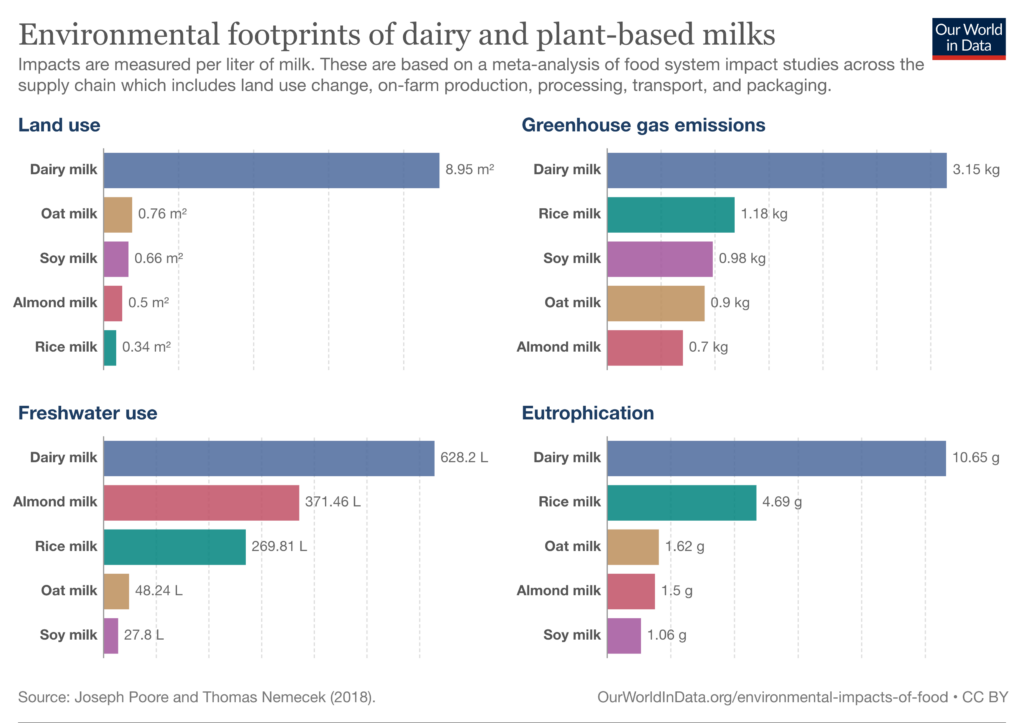
As for soy milk, it’s the most ideal for high protein content, which is comparable to conventional dairy. It’s the original non-dairy milk, but concerns about phytoestrogens (alongside the advent of almond milk) kickstarted a decline more than a decade ago. Lots of people aren’t as keen on its flavour either, with many describing it as ‘beany’.
Back to coconut, it’s a milk much higher in fat content, with greater amounts of saturated fat as well, which can be off-putting to non-dairy drinkers. Coconuts themselves come with some climate and ethical issues, with analysis by climate data startup Calyx revealing that when taking into account factors like biodiversity and animal welfare, using coconut oil can have a lower eco-score than dairy butter in some applications.
Asian coconut milk brands are linked to animal rights abuses, with some forcing monkeys to harvest coconuts in ways that don’t really scream welfare. After an investigation by PETA into the Thai coconut industry, meal kit delivery service HelloFresh dropped Thai coconut milk from its offerings earlier this year. With consumer awareness increasing, some might be becoming averse to this Asian staple.
That leaves us with oat. While oats are not perfect (is anything?), they can lay claim to being one of the most sustainable and ethical alt-milks, with a much more neutral tasting profile that appeals to customers. It’s why Dunkin’ introduced it back in 2020, and why it remains on the menu.
But coconut milk isn’t going anywhere, given its status as a staple in many cuisines, as well as its superior qualities in cooking applications. Whether consumer interest wanes, though, is a different story.
The post Is Coconut Milk Really Less Popular Among Food Chains and Consumers? appeared first on Green Queen.
This post was originally published on Green Queen.
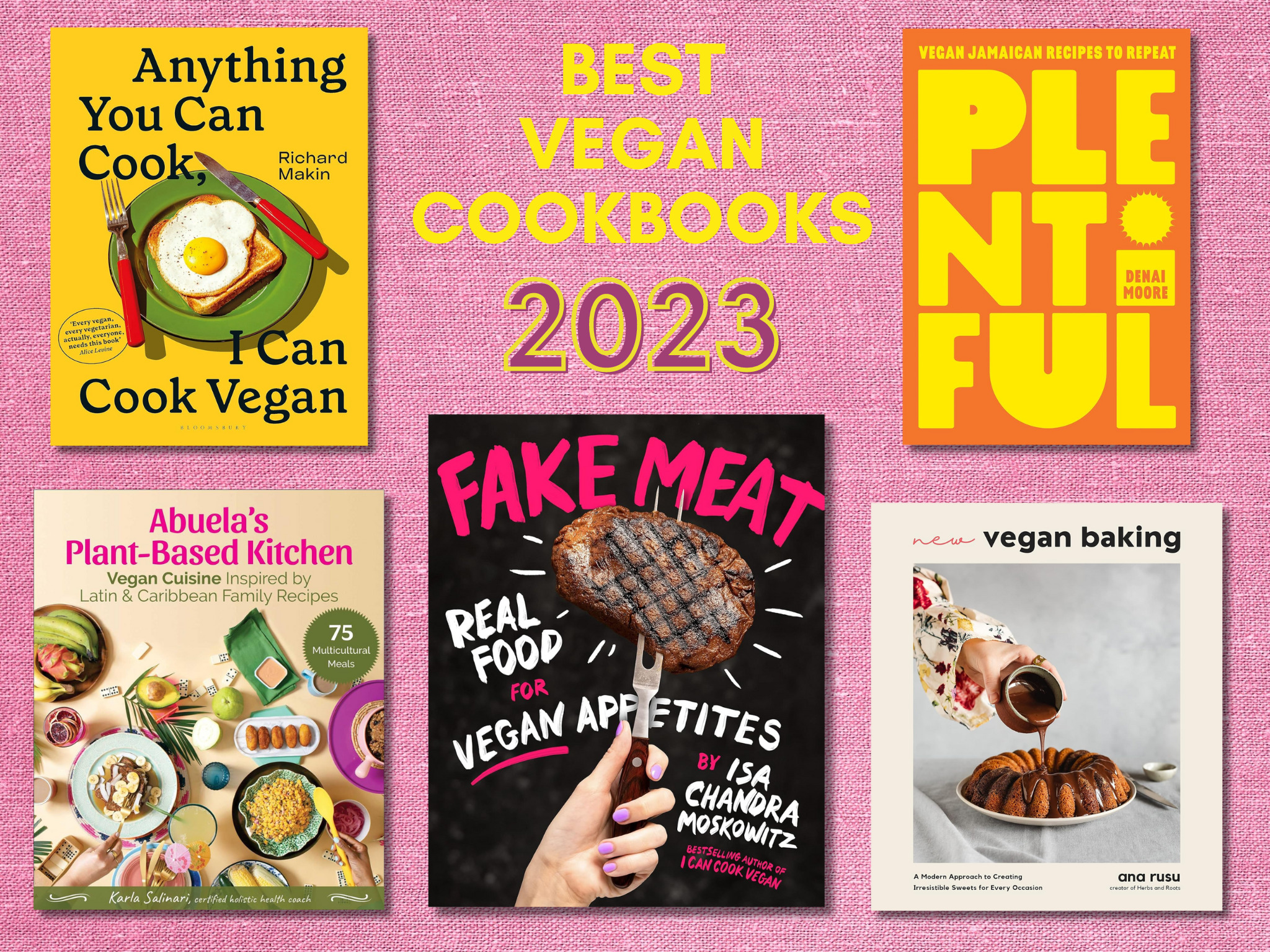
Cookbook research can be as draining as it can be fun. On the one hand, there are so many to choose from and each offers something different. On the other, there are so many to choose from.
But nothing beats flipping through the pages of a cookbook and getting pangs of excitement at each recipe you see, making all that research worth it. And sure, online recipes are a wonderful, super handy resource – but phones don’t smell like books.
Just as there are countless vegan cookbooks, there are countless lists of the best plant-based cookbooks. Even researching these can be overwhelming. And there’s nothing worse than getting someone a book they already have – I should know, it’s happened to me multiple times (both as giver and receiver).
So this Christmas, we decided to focus on cookbooks that the vegan [insert relation here] in your life likely won’t have, as they’ve all been published in 2023. These make the ideal gift for not just people who eat plant-based, but anyone who’s curious about cuisines, culture and cooking. Here are five vegan cookbooks to gift this Christmas.
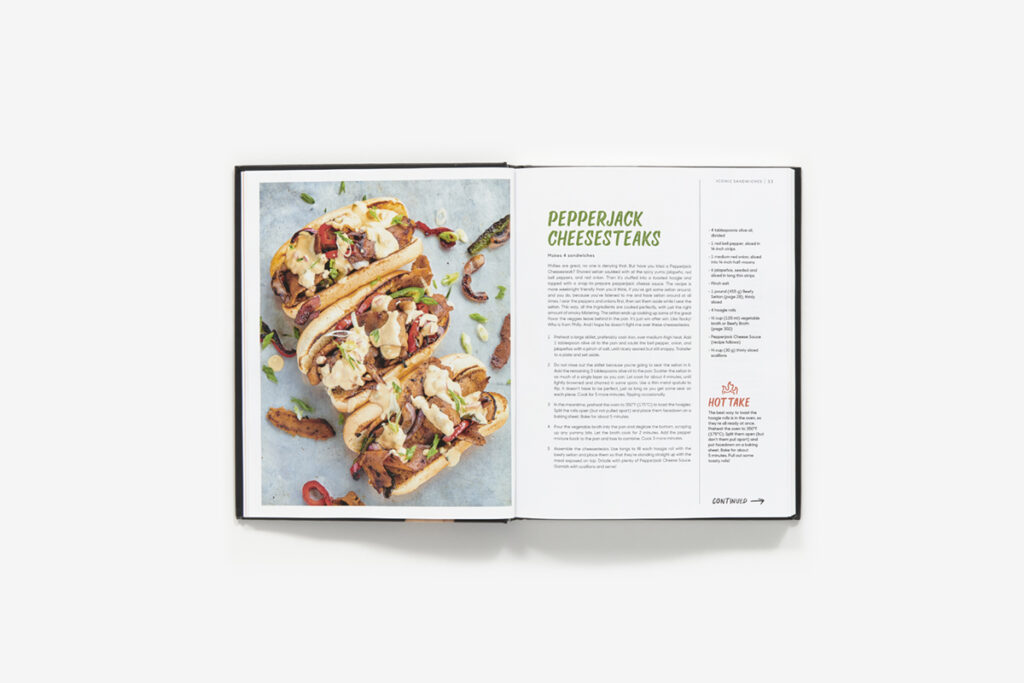
Hailing from a punk rock background, Isa Chandra Moskowitz is one of the pioneers of American veganism, and has been plant-based for decades now. She’s also a serial author, with acclaimed titles like Veganomicon and Isa Does It regularly appearing on vegan cookbook lists.
Her 12th (12TH!) cookbook, Fake Meat: Real Food for Vegan Appetites is all about plant-based meat. “Do I miss meat? Not really,” she says. “But here’s what I do miss: Aromas. Experiences. Methods. Traditions.” Published in February, the book is filled with recipes for homemade meat analogues, and dishes that make use of them in splendid fashion.
The best part is versatility – it’s not all seitan, though that is used wonderfully in burgers and steaks. Think tempeh bacon, cauliflower schnitzel, or Buffalo tofu wings. There have been quite a few plant-based meat books, but when Isa does it, you know it’s going to be good.
You can buy Fake Meat by Isa Chandra Moskowitz online via Amazon, or through various bookstores internationally.
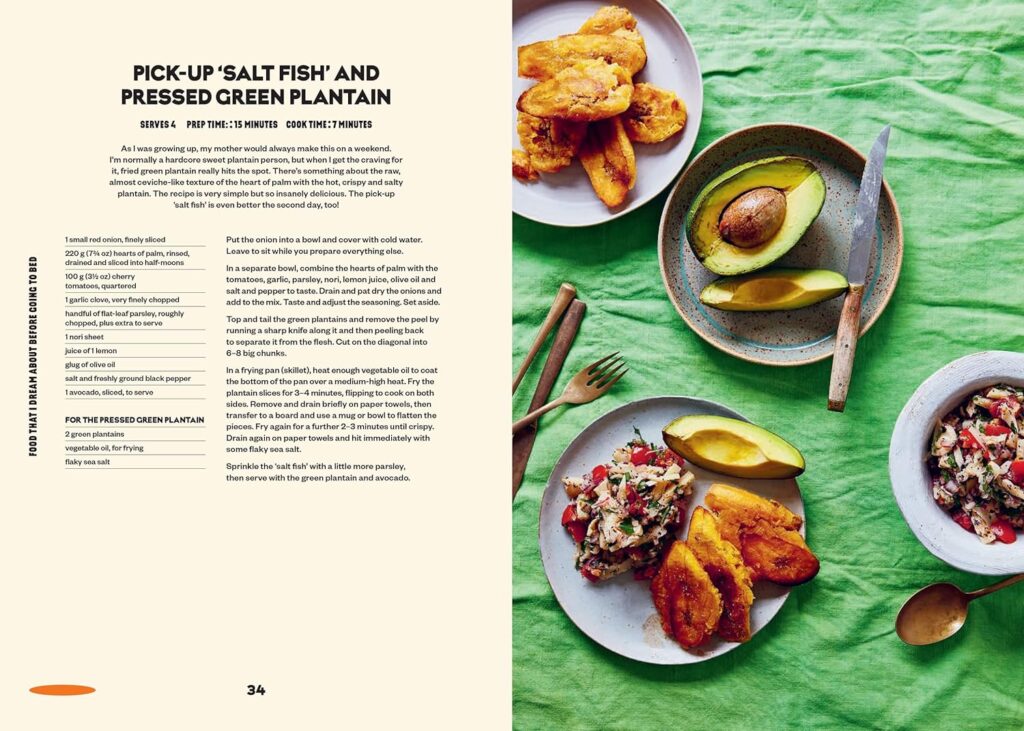
British-Jamaican chef Denai Moore is 2023’s breakout star in the vegan culinary scene, with her acclaimed cookbook Plentiful: Vegan Jamaican Recipes to Repeat representing food deep-rooted in the country’s heritage, but with a modern twist. The author grew up in a household full of fresh produce, and that defines her work, where she attempts to debunk the myth that Jamaican food is meat-heavy.
What follows is a recipe list that will sweep you off your feet, with each one more intriguing and exciting than the last, in relatably named categories like ‘Foods That I Dream About Before Going to Bed’ and ‘Romanticise Cooking for One’. ‘Oxtail’ gravy and roasted garlic-spring onion mash, rice and peas arancini, a green mango som tam, ‘saltfish’, and green plantain, and a hard dough French toast with whipped roasted banana almond butter – it’s a ridiculously creative recipe list that will never bore you.
You can buy Plentiful: Vegan Jamaican Recipes to Repeat by Denai Moore online on Amazon, Papersmiths and more, or at Waterstones.

With a striking image of a fried egg on the cover, you’d be forgiven to think that Richard Makin’s Anything You Can Cook, I Can Cook Vegan is not a plant-based cookbook on first glance. Much like Moskowitz’s title focused on meat analogues, this one aims to beat the notion that vegan food is a compromise, highlighting how you can make alternatives to eggs, butter, cheese and, of course, meat.
The photographs in the book are truly a work of art – they’re destined to leave you salivating. Makin – who became popular on the internet as the School Night Vegan – offers over 100 recipes, with a silken-tofu-based fried egg with a carrot yolk, TVP tuna melt, mushroom brisket sandwiches, and tofu egg shakshuka. Everything is gorgeous and inspiring, and it’s truly one of 2023’s best vegan cookbooks.
You can buy Anything You Can Cook, I Can Cook Vegan by Richard Makin online via Bloomsbury or Amazon, or at Waterstones.
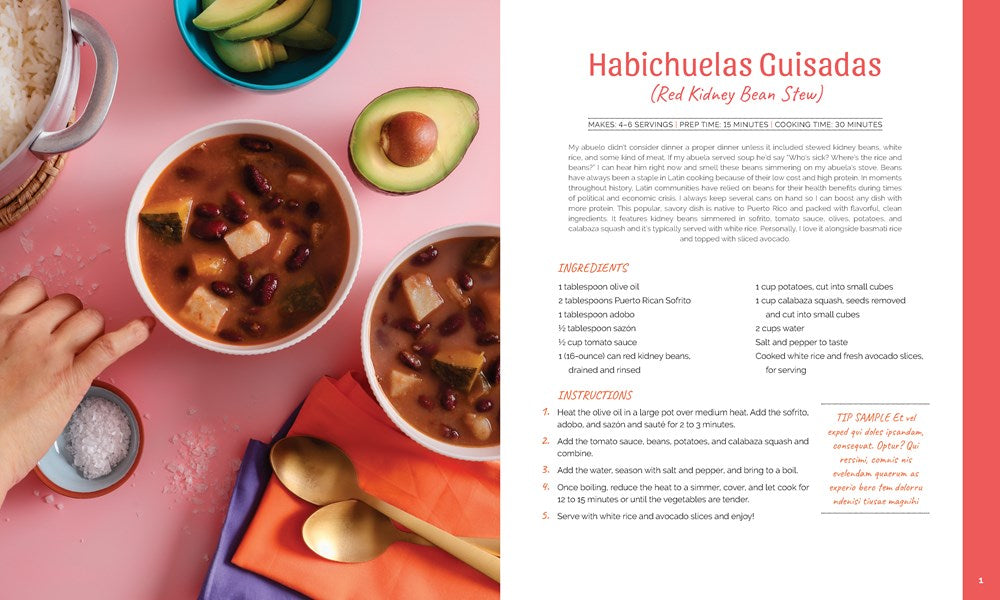
Health coach Karla Salinari grew up in Miami and Puerto Rico. After being diagnosed with and recovering from cancer twice, she switched to whole-food plant-based eating. Her cookbook, Abuela’s Plant-Based Kitchen, is an ode to Latin American and Caribbean family recipes, paired with personal stories for an even more engaging experience.
These dishes undergo a vegan makeover in Salinari’s cookbook. There are over 75 recipes, including Garbazo guisados (chickpea stew with plantain balls), flan de coco, homemade adobo, Cuban-style picadillo and even condensed cashew milk. Salinari is heavily influenced by her grandparents and mother’s cooking, whom she pays tribute to in her book: “‘Lo hice con todo mi amor’ is what my mom used to say about the meals she cooked for me: ‘I made it with all my love.’”
You can buy Abuela’s Plant-Based Kitchen: Vegan Cuisine Inspired by Latin & Caribbean Family Recipes by Karla Salinari online via Amazon, or through various bookstores internationally.

You didn’t think we’d leave out desserts, did you? Baking gives Ana Rusu – a decade-long vegan behind the cooking blog Herbs & Roots – peace of mind, and her recipes do the same for us. Hailing from Romania, she exudes a lot of her maternal grandmother’s influence in her book, New Vegan Baking, which 60 sweet treats over six chapters: Chocolate & Caramel, Fruit, Citrus, Spice, Coffee, Nuts & Seeds and Booze.
There’s something for everyone here, including a plant-based Boston cream pie, gluten-free upside-down sour cherry cake, pecan and anise biscotti, lemon posset tart with raspberry and whipped cream, poppy seed babka, and pumpkin and bourbon brûlée tart – need I say more?
You can buy New Vegan Baking: A Modern Approach to Creating Irresistible Sweets for Every Occasion by Ana Rusu online via Amazon, or through various bookstores internationally.
The post 5 New Vegan Cookbooks That Would Make the Perfect Last-Minute Christmas Gift appeared first on Green Queen.
This post was originally published on Green Queen.
PETA celebrated many massive victories this year after blowing the lid off cruelty to animals on farms, at racetracks, and at roadside zoos all over North America and rallying our supporters to help end it.
A PETA investigator went undercover at Warm Springs Ranch in Missouri (the official breeding facility for the Budweiser Clydesdales), visited Grant’s Farm, and talked to handlers who travel with teams of the adult horses.
We learned that Anheuser-Busch, which produces Budweiser beer, amputated the tailbones of the famed Clydesdales—primarily so they’d look a certain way as they pull a wagon.
Following a massive campaign in which more than 100,000 PETA supporters took action, Anheuser-Busch InBev—Budweiser’s parent company—announced that had stopped cutting the tailbones off Clydesdale horses.
This PETA victory sent a message to other companies: Animal abuse doesn’t sell.
A PETA investigator worked undercover at Bear Country U.S.A., a roadside zoo in South Dakota. There, supervisors tore bear families apart, instructed staff to kick cubs, and denied elderly animals timely veterinary attention.
Acting on evidence from our undercover investigation, the U.S. Department of Agriculture (USDA) cited Bear Country U.S.A. for multiple violations of the federal Animal Welfare Act.
According to a USDA report, a representative of this callous roadside zoo admitted to inspectors that the facility had used fireworks to terrify mother bears while separating them from their cubs and that staff “had been recorded suggesting handling the bear cubs in an aggressive and inappropriate manner, such as ‘holding their muzzles,’ ‘pinching their noses,’ and ‘kicking or pushing them away.’”
Join us in urging this tourist trap to end its cruel breeding program and send the animals there to reputable facilities before more cubs are forced to endure horrific trauma:
Following a whistleblower complaint alleging that animals were languishing with painful ailments amid piles of manure on a farm owned by the Ontario Water Buffalo Company, PETA investigators took a scheduled tour of the hellhole and found systemic animal neglect and suffering.
Despite claiming to raise buffaloes “how nature intended,” the farm confines these animals—who are native to a tropical environment in Asia—in filthy, profoundly unnatural conditions, including in subfreezing winters, to exploit them for meat and dairy, including buffalo mozzarella and other cheeses.
After hearing from PETA supporters, grocery chain Loblaws, which had sold cheese made from these animals’ milk, reported that Quality Cheese, the company that makes Bella Casara buffalo mozzarella, had cut ties with the farm.
PETA is asking Canadian grocer Longo’s to reconsider selling buffalo cheeses made from the milk of animals like these. Please join us:
A 2023 PETA investigation revealed that, every spring, 2-year-old Thoroughbreds are forced to sprint at breakneck speeds in “under tack shows” to impress prospective buyers and inflate sales prices at auctions.
Trainers and veterinarians agree that forcing fragile young horses—some of whom are still biological yearlings—to run in speed trials is dangerous and damaging.
PETA previously compiled video footage of injuries at under tack shows, showing how deadly these reckless sprints can be. On one occasion, our investigator was able to get onto the track and behind a screen—set up to hide what was happening—to film a horse who had endured a fatal cardiac event while sprinting in extreme heat.
No screen is large enough to hide the countless corpses of the horses who have already been fatally injured in these events. But there is a way to reduce further carnage.
PETA is offering a solution that should be acceptable to all stakeholders—and most importantly, it would protect horses. You can urge major auction companies and top consignors, breeders, trainers, and owners to agree to it:
With your financial support, PETA’s eyewitness investigators are able to expose—and ultimately end—the cruelty that animal abusers try so desperately to hide. Donors also make it possible for PETA to provide animals experiencing emergencies with immediate veterinary treatment, transport, and humane shelter.
The post 4 Shocking PETA Investigations That Sparked Major Action for Animals in 2023 appeared first on PETA.
This post was originally published on Animal Rights and Campaign News | PETA.